|
(1882–1964) Impressionismus 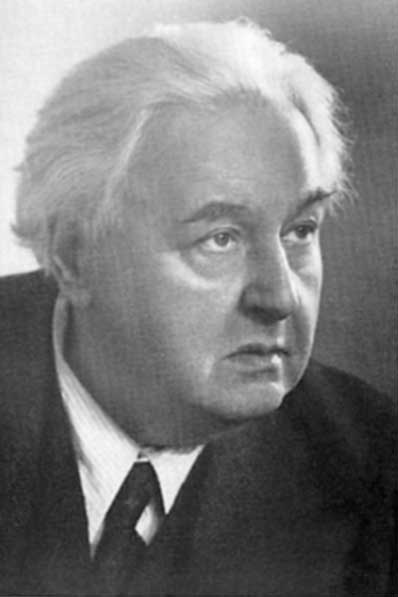 
|

|
||||||||||||||||||||||||||||||||||||||||||
|---|---|---|---|---|---|---|---|---|---|---|---|---|---|---|---|---|---|---|---|---|---|---|---|---|---|---|---|---|---|---|---|---|---|---|---|---|---|---|---|---|---|---|---|
|
(1882–1964) Impressionismus  
|

|
||||||||||||||||||||||||||||||||||||||||||
|---|---|---|---|---|---|---|---|---|---|---|---|---|---|---|---|---|---|---|---|---|---|---|---|---|---|---|---|---|---|---|---|---|---|---|---|---|---|---|---|---|---|---|---|
The Joseph Marx Society has its own website:joseph-marx-society.org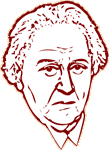
Austria's leading contemporary composersand the author of this website founded theJoseph Marx Society(English translation by Berkant Haydin) On April 1st, 2006, the inaugural meeting of the first Joseph Marx Society in history took place
in Vienna. Berkant Haydin, the author of this website who had registered the society at the Austrian authorities in March, founded the Joseph Marx Society with
Austria's leading composers and music officials: Friedrich Cerha -who has completed and orchestrated Alban Berg's opera "Lulu"- with his wife Gertraud, the celebrated composer
Kurt Schwertsik, the influential Austrian music critic and Marx pupil Peter Vujica, Haide Tenner (President of the Vienna RSO), Eric Marinitsch (Promotion and Marketing Director of Universal Edition),
Heinz Prammer (European Cultural Services) and Robert Hanzlik (a renowned music researcher). Email: Donations account of the Joseph Marx Society in Vienna: Transfers within Austria: |
One of the remaining mysteries of music history is why Joseph Marx, titled "the leading force of Austrian music" by William Furtwaengler in 1952, is no longer counted among the great composers of the 20th century. The Styrian composer received an enormous number of honors and awards over the course of his long life, but he was also held in high esteem as one of the most active music officials, composition teachers and critics of the mid-European late Romantic era. As numerous surviving contemporaries can confirm, he even occupied a key position in the Viennese music scene over several decades. Thus it is not surprising that the Ataturk government called him to Turkey in 1932, where he acted as first advisor on the development of Turkish music and concert life, and where he also helped to build up the Turkish conservatory (later, Hindemith and Bartok stepped in). His surviving students recall that Marx, whose friends were famous contemporaries like Puccini, Szymanowsky and many others, also had extensive knowledge in the areas of literature, art and sciences. His entire student body "adored and admired him like a semi-God". His reputation as Austria's leading musical authority soon spread to all corners of the earth, and young musicians from all over the world made the long journey to Austria, to receive instruction by Marx who had also made a name for himself as the composer of many internationally famous songs. And this is where the origin of the extraordinary career of Joseph Marx lies.
Born in 1882 in Graz as the son of a doctor and a female pianist, Marx was fascinated from an early age with poetry as an art form and also had an intense relationship with nature (throughout his life, he maintained a close affinity with nature). On the musical side, in his younger years he was greatly influenced by Debussy and Scriabin, both of whom he deeply admired. Following the composition of numerous organ and piano pieces and a couple of trio and quartet works that he arranged himself around the turn of the century (to date unpublished but in those days partly performed with great success), Marx concentrated mainly on piano songs which he accompanied himself. He was, incidentally, also a brilliant pianist. Even in the last decade of his life, he was still able to easily perform even the most difficult piano pieces, by heart, and he often demonstrated this skill during his lessons.
At the age of 25, while performing at a Lieder evening, Marx met the singer Anna Hansa (1877-1967) who stemmed from one of the best families of Graz. Anna Hansa had many contacts to musicians and artists. She had opened a café in Graz that introduced a new concept: It acted as a point of cultural exchange among various artists and also as a locale for musical performance evenings. His initial friendship, and later his life-long love for Anna, changed Joseph Marx's life forever. An established singer, she performed the promising young composer's Lieder and thus helped him to make his final breakthrough as the most-performed song composer of Styria.
Joseph Marx's thinking was initially influenced by the epistemologist Alexius von Meinong (1853-1920) and later also by his friendship with Vittorio Benussi (1878-1927, one of von Meinong's famous students), an experimental psychologist with whom he extensively discussed the psychological mysteries of music. Eventually, he became convinced that tonality was a natural law and, as such, an irrevocably unity with the heart and spirit of man. This has been impressively documented in his literary work "Weltsprache Musik" ("Music - A universal language"). A close friendship with the poet Anton Wildgans (1881-1932) and also his own studies in philosophy, art history, German language/culture and archaeology at Graz University finally rounded off Joseph Marx's education as a highly sophisticated man.
His 1909 dissertation "About the function of intervals, harmony and melody in the comprehension of tone complexes" attracted great attention and by 1912, he had already composed 120 songs, some of which had been very successful in Austria. In 1914, he was offered a professorship of music theory at Vienna University's Music Academy, where he taught from then onward. There, Schreker and other famous contemporaries were among his colleagues. In 1922, he succeeded Ferdinand Löwe as director of the Academy and later became director of the Music College. Following his time as advisor to the Turkish government (1932-33), Joseph Marx became a music critic for the Neues Wiener Journal (New Vienna Journal) in the Thirties and later worked in the same field for the Wiener Zeitung. During his time of teaching in Vienna and at Graz University, he taught a total of 1255 students from all over the world. He did not finish teaching until approximately the mid-fifties, when he had already made history, not only as one of the most important representatives of classical music in Austria, but also as the most influential opponent of the New Viennese School. With his oppositional stance, Marx found himself in good company. Aside from his Austrian fellow-opponents (among them Wilhelm Kienzl, Alois Melichar und Franz Schmidt), he also received active support from abroad. Frederick Delius, for instance, one of England's musical counterparts of Marx, called Schoenberg's progressive style an "atonal ugliness". Yet, among those opponents to the modernists, Marx was certainly - leastwise in the middle European parts - the most conspicious and active one. His sharp wit, applied not only in his function as critic and teacher against the Schoenberg circle but also as jury member in several national and international competitions, never spared any of the young atonal-polytonal composers.
Aside from his early outpouring of Lieder, Joseph Marx wrote several popular choral works (among them the orchestral works "Autumn Chorus for Pan" and "Morning Chant"), as well as some exquisite solo piano and chamber music (among them three string and three piano quartets, two violin sonatas, one piano trio, several works for cello and piano and some chamber pieces with voice). Additionally, he left behind a comprehensive orchestral oeuvre, including the Romantic Piano Concerto, completed in 1919, as well as his major work, the Autumn Symphony (1920/21) which could rather be described as a rhapsody of near gigantic proportion. Further, there is the Nature Trilogy including three stunning symphonic poems, a second piano concerto titled Castelli Romani and many more.
Within the international composers' community, Marx was held in high esteem. For instance, the prolific Russian-Canadian composer Sophie Carmen Eckhardt-Grammaté (1902-74) once said about him that his music had "defined the entire era". Also, no less a man than Nikolaj Medtner (1880-1951), one of the most influential members of Moscow's famous circle of composers in the late 19th Century which included masters such as Sergej Tanejew, Alexander Skrjabin und Sergej Rachmaninov, wrote in a letter to Marx on November 41th, 1949: "My meeting with you was an unexpected gift and also a sign showing that everything that is unexpected, fantastic and ETERNALLY romantic does still exist, despite all the efforts of the contemporary 'leaders' of art who strive to eradicate these values."
In view of such evident verification of his skills, we must ask why this widely renowned composer has been so undeservedly neglected. One of the main reasons might well be the mistaken belief that Marx had been an ultraconservative, even a backward composer - a claim that cannot be substantiated by anyone undertaking the detailed study of Marx's full oeuvre, especially when compared to the composers of his time who were more famous but similar in style. In his capacity as a high-ranking music functionary and critic, and without doubt as a traditionalist and one of the great protectors of tonality, Marx was very prominent and successful in setting the Viennese tone of the time. As such, he has never made a secret of his admiration for the founding fathers of music (Mozart, Schumann, Bach, Haydn etc.). In several of his own works - "Old Vienna Serenades" of 1941, for instance - he used variations of their well-known and lesser-known themes and incorporated motifs of Carl Michael Ziehrer, Joseph Haydn and others. One can also examine his string quartets in modo antico and in modo classico, arranged for string orchestra, where Marx paid homage to his role models in a most impressive manner. With his music, Marx certainly also meant to make available an instructive guideline for young composers, and he succeeded. The classicist works from his final creative period, just like his works stemming from his first outpouring of Lieder, have influenced an entire generation of musicians, as is confirmed by numerous letters to Marx and by other important documents. The great cellist Pablo Casals, for instance, once said that Marx was "absolutely indispensable for maintaining the musical culture of the future", and also that the "non-musique of particular famous contemporaries" was "certain to fail".
It should never be forgotten that the essential purpose of music is not to separate people but to give them pleasure. And this is what Joseph Marx unquestionably intented to do. The vast melodiousness and refined harmonies of his scores mirror the versatile, sparkling essence of this composer. A profound lyricist and yearning optimist, he wants to share his bottomless joy of life with others. Thus, as a poet of happiness, Joseph Marx who died at the age of 82 in 1964, occupies a very special place in music history and as such also deserves a corresponding presence in the world's concert programs.
© Berkant Haydin
Translated from the German by Tess Crebbin
"The genuine work of art is as organic as a
tree developing out of a seed, growing, blooming; its splendour is
natural yet intangible, a thousand fragments joining, and yet of
unimaginable beauty beyond description..." (Joseph Marx)
Joseph Marx's life briefly:
Joseph Rupert Rudolf Marx (sometimes
incorrectly spelled Josef Marx) was born 11 May 1882 in
Graz/Austria. He first studied music with his mother, then was  educated at Johann Buwa's piano school where - among
many others - Hugo Wolf had also been a student. There he was also
taught to play the violin and meanwhile autodidactically learned
the cello too. His first exercises in composition date from his
time at secondary school when he began to arrange pieces for trio
or quartet from existing themes. In the meantime he had also become
a member of the piano school's ensemble as a piano accompanist. His
parents forbade him to play the piano but he found other ways to
realise his love for music. It was at this time that he began to
compose his first piano pieces and to perform them with the
ensemble of his music school. Before having finished secondary
school he planned (or pretended?) to become a watchmaker while he
was thinking of starting an education in photography, but then he
turned back to secondary school and finally finished his studies.
At Graz University he attended courses in philosophy and art
history after having followed for only one year his father's wish
that he should read law. This decision produced a break between him
and his family. Nevertheless, his strong interest in music made him
continue to compose at the age of 26 so that within only four years
(1908-12) he wrote around 120 songs. His name became known in
Vienna, where in 1914 he was offered the post of professor of
theory at the music academy.
educated at Johann Buwa's piano school where - among
many others - Hugo Wolf had also been a student. There he was also
taught to play the violin and meanwhile autodidactically learned
the cello too. His first exercises in composition date from his
time at secondary school when he began to arrange pieces for trio
or quartet from existing themes. In the meantime he had also become
a member of the piano school's ensemble as a piano accompanist. His
parents forbade him to play the piano but he found other ways to
realise his love for music. It was at this time that he began to
compose his first piano pieces and to perform them with the
ensemble of his music school. Before having finished secondary
school he planned (or pretended?) to become a watchmaker while he
was thinking of starting an education in photography, but then he
turned back to secondary school and finally finished his studies.
At Graz University he attended courses in philosophy and art
history after having followed for only one year his father's wish
that he should read law. This decision produced a break between him
and his family. Nevertheless, his strong interest in music made him
continue to compose at the age of 26 so that within only four years
(1908-12) he wrote around 120 songs. His name became known in
Vienna, where in 1914 he was offered the post of professor of
theory at the music academy.
 In 1922 he became director of the
academy, and he was rector (1924-27) when the institution was
reorganized as a Hochschule fur Musik. He then acted as adviser to
the Turkish government in laying the foundations of a conservatory
in Ankara (1932-33). From 1931 to 1938 he was music critic for the
Neues Wiener Journal and after World War 2 he worked in the same
capacity for the Wiener Zeitung; during World War 2 Marx was the
most frequently performed composer in Austria which becomes
apparent in the fact that he has later been president, chairman or
honorary member of many important Austrian music associations and
societies over two decades until he died 3 Sept 1964 in Graz at the
age of 82. During his 43 years as a teaching professor in
composition, harmony and counterpoint Marx had 1255 students from
all over the world many of which later achieved national and
worldwide fame as composers, conductors, soloists, musicologists
etc. As Marx enjoyed great popularity and much respect during his
lifetime, there is no question that he had an immense impact on at
least two generations of musicians in the
20th century.
In 1922 he became director of the
academy, and he was rector (1924-27) when the institution was
reorganized as a Hochschule fur Musik. He then acted as adviser to
the Turkish government in laying the foundations of a conservatory
in Ankara (1932-33). From 1931 to 1938 he was music critic for the
Neues Wiener Journal and after World War 2 he worked in the same
capacity for the Wiener Zeitung; during World War 2 Marx was the
most frequently performed composer in Austria which becomes
apparent in the fact that he has later been president, chairman or
honorary member of many important Austrian music associations and
societies over two decades until he died 3 Sept 1964 in Graz at the
age of 82. During his 43 years as a teaching professor in
composition, harmony and counterpoint Marx had 1255 students from
all over the world many of which later achieved national and
worldwide fame as composers, conductors, soloists, musicologists
etc. As Marx enjoyed great popularity and much respect during his
lifetime, there is no question that he had an immense impact on at
least two generations of musicians in the
20th century.
![]()
Click here to view a
more detailed biography that I wrote for a small music publisher
 Joseph Marx was a tall and rather strongly
built man. He was considered an excellent pianist who used to
accompany his own compositions on the piano with often quite
demanding piano parts until old age, electrifying critics and
audience alike. His students, acquaintances and colleagues
described him as an out-and-out individualist and, at the same
time, as an open and frank man with a philosophical background and
a subtle sense of humour. He was always described as witty and
eloquent and as someone who knew how to express his thoughts
brilliantly. That is why his lessons were given in a stimulating
and humorous atmosphere where he sometimes told anecdotes about his
encounters with many renowned composers whom he knew or had known
Joseph Marx was a tall and rather strongly
built man. He was considered an excellent pianist who used to
accompany his own compositions on the piano with often quite
demanding piano parts until old age, electrifying critics and
audience alike. His students, acquaintances and colleagues
described him as an out-and-out individualist and, at the same
time, as an open and frank man with a philosophical background and
a subtle sense of humour. He was always described as witty and
eloquent and as someone who knew how to express his thoughts
brilliantly. That is why his lessons were given in a stimulating
and humorous atmosphere where he sometimes told anecdotes about his
encounters with many renowned composers whom he knew or had known
 personally (for example Puccini, Szymanowsky, Franz Schmidt). The
course of his lessons was characterized by improvisation: The
students were not allowed to take notes in order to develop
an intuitive over a mechanical understanding and
practical application. He used to further the talents of his
students in an almost imperceptible way and corrected them only if
they committed technical mistakes. It is also known that Marx gave
private lessons to many of his students in need of additional
support, even in his spare time and without demanding any fee.
Despite his very critical attitude towards the atonal avant-garde
he also praised compositions of young modernists provided that they
could be assigned at least to some extent to tonal music. He was
respected by students and colleagues alike, even by those
advocating a very different musical style. In this context it may
be noted that many of his students coming from different parts of
the globe later achieved national and worldwide fame in their
respective musical line. The fact that the total estate of letters
to Marx consisted of 14589 pieces from 3420 correspondents (!),
including a host of well-known persons, should be a clear
indication of the popularity and the renown of Joseph Marx who due
to several unfortunate circumstances fell into oblivion after his
death.
personally (for example Puccini, Szymanowsky, Franz Schmidt). The
course of his lessons was characterized by improvisation: The
students were not allowed to take notes in order to develop
an intuitive over a mechanical understanding and
practical application. He used to further the talents of his
students in an almost imperceptible way and corrected them only if
they committed technical mistakes. It is also known that Marx gave
private lessons to many of his students in need of additional
support, even in his spare time and without demanding any fee.
Despite his very critical attitude towards the atonal avant-garde
he also praised compositions of young modernists provided that they
could be assigned at least to some extent to tonal music. He was
respected by students and colleagues alike, even by those
advocating a very different musical style. In this context it may
be noted that many of his students coming from different parts of
the globe later achieved national and worldwide fame in their
respective musical line. The fact that the total estate of letters
to Marx consisted of 14589 pieces from 3420 correspondents (!),
including a host of well-known persons, should be a clear
indication of the popularity and the renown of Joseph Marx who due
to several unfortunate circumstances fell into oblivion after his
death.
Compositional style
 The unique "Marx sound" reminds the listener of
Debussy, Scriabin, Delius, Ravel,
Respighi, J. Jongen, Vladigerov, Reger, Schreker,
R. Strauss, Korngold, Brahms, Mahler and Bruckner but
is in the end totally his own. Regarding his Lieder for which he
became famous (these were mainly composed before he was 30 years of
age) he is said to be the rightful successor to Hugo Wolf.
The southern atmosphere in many of his works has its origin from
his mother who was half Italian half Slav. Marx was a late
romantic impressionist whose musical inspiration was nourished
by his deep and spiritual tie to Mother Nature to whom he
wrote so many glorious hymns of love. This is why the mood
of his music is so sensuous, optimistic and even hedonistic, a work
of art created by a happy man who wants to share his delight with
others.
The unique "Marx sound" reminds the listener of
Debussy, Scriabin, Delius, Ravel,
Respighi, J. Jongen, Vladigerov, Reger, Schreker,
R. Strauss, Korngold, Brahms, Mahler and Bruckner but
is in the end totally his own. Regarding his Lieder for which he
became famous (these were mainly composed before he was 30 years of
age) he is said to be the rightful successor to Hugo Wolf.
The southern atmosphere in many of his works has its origin from
his mother who was half Italian half Slav. Marx was a late
romantic impressionist whose musical inspiration was nourished
by his deep and spiritual tie to Mother Nature to whom he
wrote so many glorious hymns of love. This is why the mood
of his music is so sensuous, optimistic and even hedonistic, a work
of art created by a happy man who wants to share his delight with
others.
The following photographs were shot by Martin
Rucker on April 1, 2003.

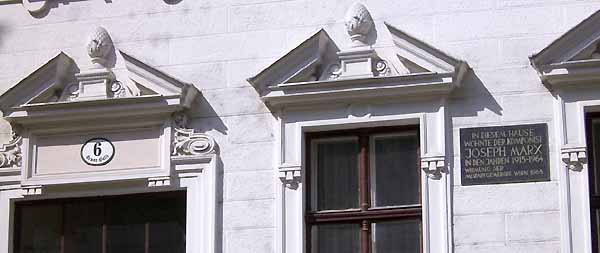

"In this house lived the composer Joseph Marx
from 1915 to 1964.
Dedicated by the Mozartgemeinde (Mozart Society), Vienna 1965."


Many more photos of places in Austria where Marx lived and worked can be found here... |
|---|
TO LEARN MORE ABOUT MARX'S FATE AS ONE OF THE MOST UNDERRATED MASTERS OF TWENTIETH CENTURY'S MUSIC READ THE FOLLOWING CHAPTERS.
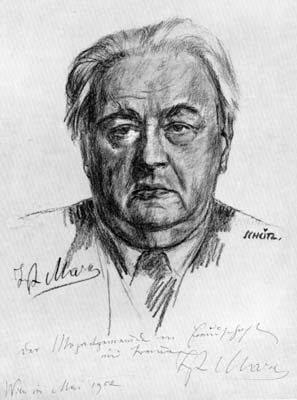
In February 2000 I came across a CD that was part of Hyperion's "The Romantic Piano Concerto" series (Vol. 18, Hyperion CDA66990). It included two piano concertos by Joseph Marx (Josef Marx) and Erich Wolfgang Korngold one of which impressed me in a way that no music had managed before: The Romantisches Klavierkonzert (Romantic Piano Concerto) by Joseph Marx. After having heard this gorgeous late romantic concerto I began to search for recordings of other orchestral works by Marx but when I began to browse through the existing commercial offerings of Marx works I was truly disappointed since the above mentioned piano concerto was the ONLY orchestral work by Marx available at all. There are a number of recordings of his songs with piano, these appear in the Etcetera and FY Solstice labels. The CD booklet of the Hyperion CD written by Brendan Carroll briefly gave some highly interesting information on a number of Marx's orchestral works but these also were unavailable on the international market. Hence, I gave up searching.

Some weeks later, a good friend from England (a collector) sent me a tape cassette with a recording of Marx's 2nd piano concerto Castelli Romani for Piano and Orchestra that he had received from someone who had taped a German radio broadcast. This recording now ranks as one of the Top 5 of my entire piano concerto collection that currently includes more than 1,500 works. The "Castelli Romani" definitely is an outstanding work of impressionistic romanticism and dazzling beauty. Several audio samples of this brilliant 2nd piano concerto, but also of many other unknown orchestral Marx works are available at this website.

After having heard the "Castelli Romani", I decided to locate recordings of all other orchestral works by Marx. In the meantime, ASV Records, Pavane Records and FY Solstice released CDs with a part of the Marx chamber works (it seems that Marx's few other chamber works might be issued soon). But regarding his orchestral works - especially his Herbstsymphonie that is mentioned in the booklets of all available Marx CDs - I was still groping in the dark...
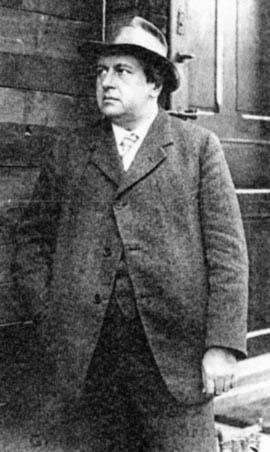
Brendan Carroll wrote that the most important orchestral works of Joseph Marx (Josef Marx) have never been recorded (liner notes of Hyperion CDA66990). Indeed, only a handful of radio broadcasts have been made in the last 70 years as I know from my own research. Michel Fleury who wrote the booklet articles for the few other commercial Marx CDs also seems to know these deplorable facts. Nevertheless, I had the feeling that there might somewhere exist recordings of Marx's orchestral works and especially of the Herbstsymphonie. I was somehow sure that if recordings did exist I would find them.
First I began to search the World Wide Web but I
failed since there is almost no useful information about Marx's
orchestral works in the whole Internet! Could it really be possible
that none of Marx's orchestral works apart from the Romantic Piano
Concerto had ever been recorded? In order to get an answer I
decided to call the Austrian Radio Station ORF in Vienna. This
turned out to be a good decision since the ORF (who has different
state studios of which all have their own archive) indeed had
recordings of a major part of Marx's orchestral and chamber works.
I was overwhelmed by the list of works 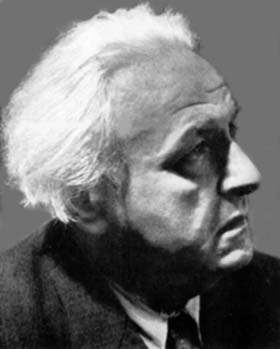 that was read out to me from the archive database. I ordered
all recordings of every work for chamber and orchestral ensemble
that the Viennese radio station had in its archive. Then I asked
the key question: "Could you please check your archive for a work
named Herbstsymphonie (or Herbstsinfonie / Herbst-Sinfonie /
Herbst-Symphonie as it is sometimes spelled)?". I was so excited
and highly expectant. Then the voice at the other end of the line
said "No, I can't find anything like that". This was truly
disappointing to me but at the same time I had the idea to call the
ORF state studio in Marx's hometown Graz which could well have had
a recording. My phone call to the ORF archive in Graz indicated
that they also had no recording of the Herbstsymphonie. At least I
was able to order a few other orchestral and chamber works that the
Viennese archive didn't have. The other ORF studios had nothing
else of interest.
that was read out to me from the archive database. I ordered
all recordings of every work for chamber and orchestral ensemble
that the Viennese radio station had in its archive. Then I asked
the key question: "Could you please check your archive for a work
named Herbstsymphonie (or Herbstsinfonie / Herbst-Sinfonie /
Herbst-Symphonie as it is sometimes spelled)?". I was so excited
and highly expectant. Then the voice at the other end of the line
said "No, I can't find anything like that". This was truly
disappointing to me but at the same time I had the idea to call the
ORF state studio in Marx's hometown Graz which could well have had
a recording. My phone call to the ORF archive in Graz indicated
that they also had no recording of the Herbstsymphonie. At least I
was able to order a few other orchestral and chamber works that the
Viennese archive didn't have. The other ORF studios had nothing
else of interest.
However, this was the beginning of the most extensive phone call campaign that I had ever made in my life.
I called a very large number of eligible
archives, universities, music societies, orchestras, musicologists,
conductors, historians, discographers, lexicographers, pianists and
besides many other persons who are familiar with
 the Austrian music
scene, but I also spoke to some of Marx's living pupils and friends
or to their descendants, among these the grand-daughter of the
famous singer Anna Hansa (1877-1967) who has been Marx's lifetime
romance and partner over five decades and to whom Marx had
dedicated his Herbstsymphonie. (Marx himself never had any
children and there are no other direct relatives.) Unfortunately
none of them could provide a recording of the Herbstsymphonie; for
the most part they had never even heard the name of this work!
the Austrian music
scene, but I also spoke to some of Marx's living pupils and friends
or to their descendants, among these the grand-daughter of the
famous singer Anna Hansa (1877-1967) who has been Marx's lifetime
romance and partner over five decades and to whom Marx had
dedicated his Herbstsymphonie. (Marx himself never had any
children and there are no other direct relatives.) Unfortunately
none of them could provide a recording of the Herbstsymphonie; for
the most part they had never even heard the name of this work!
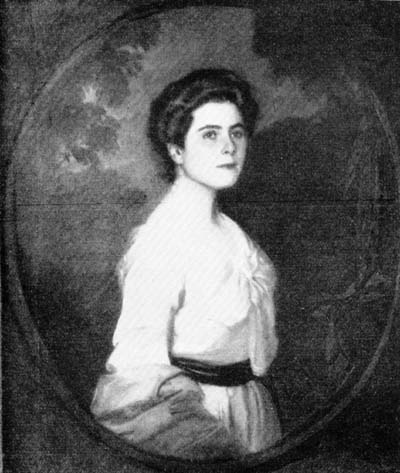
Anna Hansa
I contacted the Universal Edition, the main publisher of Marx's scores. Of course they also had no recording of any of Marx's orchestral works. Now I understood that calling the ORF studios had been the very best idea that I could have had. Nonetheless I asked the Universal Edition if the score of the Herbstsymphonie has ever been loaned. They just saw a curious entry in their database and gave me the phone number of the famous German publisher Schott in Mainz who then gave me the information that the score had obviously been loaned out in 1990 but this turned out to be nothing but a wrong entry in the computer as I discovered several phone calls later - one of which was with a German classical music producer in Mombasa/Kenya!
After that I called the Austrian National Library in Vienna. Their music division had indeed two other orchestral works that even the ORF did not have - of course I ordered them. In the meantime I had been hearing the first batch of recordings from Austria and was deeply impressed: How could such great music be that unknown and totally forgotten? How could a composer who obviously was one of the most approachable composers of the 20th century be that neglected? And what is more, how could his Herbstsymphonie that is Marx's major work due to all sources to which I had access later, be the most forgotten work among his orchestral masterpieces?
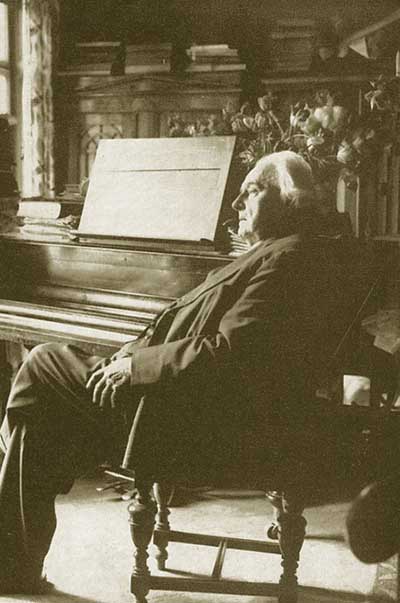
Joseph Marx at his home in Vienna, Traungasse 6
(1963).
For more photos of this house please click here
I was hoping to get answers to these questions by reading all the biographies and writings about Joseph Marx that were mentioned in other books and in the Internet (which was rather problematic since his name is sometimes incorrectly spelled Josef Marx). The first book that I received was a doctoral thesis about Joseph Marx written by Dr. Andreas Holzer from Vienna University. This dissertation is the latest and by all means the most comprehensive writing about Joseph Marx. Of course it can't be compared with Andreas Liess's biography since Liess was one of Marx's friends and pupils but it is still the most extensive information source compiled by a person who was not part of Marx's circle of acquaintances as the writers of all other biographies had been.
In Dr. Holzer's thesis I eventually seemed to have found the reason why the Herbstsymphonie had disappeared from the concert programs.
The premiere was performed 5 Feb 1922 by the Vienna Philharmonic Orchestra conducted by Felix von Weingartner, as part of the "Philharmonic Concerts" series. The dress rehearsal was disturbed by a circle of saboteurs who used whistles and evidently didn't want the symphony to be successfully performed, and the same happened at the premiere. This divided the audience into three groups: those who loudly whistled in order to disturb the performance, those who were overwhelmed by the euphony of the music and cheered and applauded in order to express their enthusiasm and to drown out the troublemakers, and the rest who just tried to be able to hear the music. Visitors even reported acts of physical violence between the two factions of the audience during a tumult that lasted about fifteen minutes. Unfortunately even Marx himself didn't know exactly which circles were responsible for all that trouble as he wrote in one of his private letters.
Several articles in newspapers and music magazines described the symphony as a work that naturally had to tear the audience apart:
"A masterly thematic and polyphonic work that
sometimes makes use of Schreker techniques ..."
("Musikblätter des Anbruchs", 1923/5, p. 156)
"... an extremely large, even monstrous work
with sometimes excessive sonority and polyphony ... masterly use of
techniques ..."
("Wiener Morgenzeitung", 7 Feb 1922)
"... an unsymphonic symphony ... A too
monstrous work of a lyricist who is wrapped up in his music
..."
("Wiener Zeitung", 5 June 1923)
In spite of the huge attention that the work had attracted in Vienna, its Viennese premiere must be evaluated as a flop. However, there are hints showing that Felix von Weingartner seemed not to be the "right one" to conduct the work as the premiere in Graz (26 Sep 1922) conducted by Clemens Krauss gave a totally different impression of the music so that the symphony was celebrated as perhaps no other symphonic work had ever been celebrated there before. One should note that this was not only influenced by the fact that Graz is Marx's hometown since all later Viennese performances of the Herbstsymphonie conducted by Clemens Krauss were greatly successful and the scandalous premiere of 1922 seemed to have been forgotten.
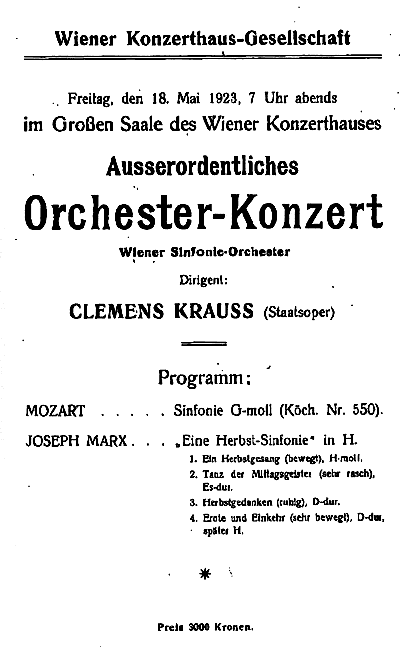
One additional note: In 1927 the Herbstsymphonie was not performed completely anymore. Marx had meantime decided that the fourth movement ("Ein Herbstpoem"; original title: "Ernte und Einkehr") should be performed as an independent work. This movement is the only one of the four movements that begins after a break while the first three movements of the symphony must be performed without a break.
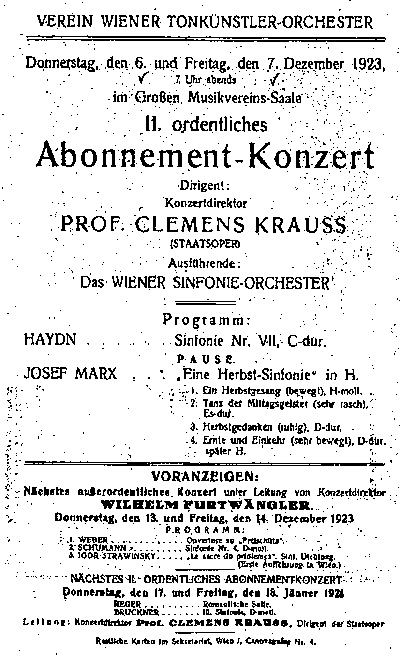
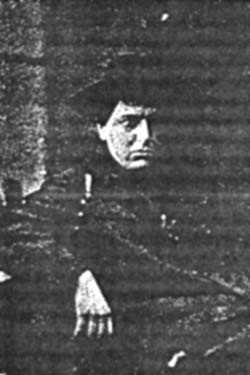
But why have Marx's other orchestral works also been neglected and forgotten in the following years? One can say that the Austrian music scene of the 1920s was generally divided into two factions: the tonal and the atonal music. Marx was one of the leading members of the tonal group, perhaps even the leading light of the Viennese music scene of that era as one can see from the numerous functions that he had in Vienna. Naturally there were a lot of Marx opponents among other music circles. After Marx's orchestral works had been quite frequently performed in the 1920s the interest in this kind of innovative but still tonal late romantic style began to wane. Seemingly as a reaction to this development, Marx then wrote his three famous string quartets of which the titles ("modo antico", "modo classico") tell much about his attitude towards the modernists.
As my search for a recording of the Herbstsymphonie went on I found a website where the names of all persons who had written letters to Marx are listed. This list was the reason for at least 50 additional phone calls, among which I also called Deutsche Grammophon, the most important German music archives and a couple of German discography experts. None of these could help me with locating a recording. Then I seemed to have found what I was searching for: A document of the Austrian National Library that gave short summaries of each letter written to Marx by Swiss composer and Marx pupil and friend Richard Flury. Here I found a letter in which Flury reported to Marx about the positive reactions to the performance of the symphony in his hometown in Switzerland. Was this a hint or even a proof for an existing recording in Switzerland? Couldn't it be possible that the symphony would have been performed in Switzerland in later years when recordings were frequently and usually made?
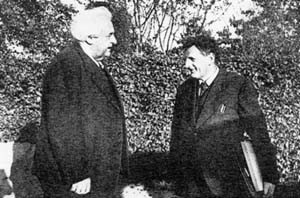
Joseph Marx - Richard Flury
I contacted several Swiss radio stations and finally the Swiss National Library that could give me the phone number of Richard Flury's son Urs Joseph Flury who also is a composing conductor and violinist. Urs Joseph Flury knew many things that I hadn't heard of so far since he had all original letters written between his father and Marx over five decades. He also had been searching for a recording of the Herbstsymphonie over a long time but at the end he had given up. Urs Joseph Flury insisted that the summary of that letter at the website of the Austrian National Library was definitely wrong. Finally he read the original letter to me, and indeed we found out that the information about the performance of the symphony refers not to the Herbstsymphonie but to a symphony composed by Flury himself. Urs Joseph Flury said that if a Swiss recording of the Herbstsymphony did exist at all he would know it.
Another important straw was a hint that I found in the Liess biography: The Herbstsymphonie had been performed in February 1925 in Germany by the well known Wuppertal Symphony Orchestra conducted by the Austrian Hermann von Schmeidel.
If you wish to see a photo of recording sessions of some of Marx's orchestral works in the above-mentioned concert hall "Stadthalle Wuppertal" that is exactly the location where the Herbstsymphonie was performed for the last time in 1925, please click here!
After I had contacted the organist and pianist Prof. Joachim Dorfmüller who is an expert on Wuppertal's music and concert history I knew what I had suspected before: The symphony hadn't been recorded when it was performed in 1925. This was confirmed by the German discographers and lexicographers who hadn't found anything about a recording of a Marx symphony in Germany.
It was then, after more than 200 phone calls and reading all the writings about Marx, that I definitely knew that I wouldn't find any recording of the Herbstsymphonie. Nevertheless, I can now claim that this work is by all accounts Marx's most striking work although most likely no living person has ever heard a second of it. The main biographer, Austrian musicologist Andreas Liess, emphasised that it is "among the most polyphonic works ever written", and he almost went into raptures when describing all the outstanding details of the score: "A late romantic symphony of incredibly orgiastic euphony and voluptuous impressionism...". These quotes are taken directly from the detailed description of the score that we can find in his biography written in 1943. These facts might be another reason why the symphony was never performed again since the late 1920s. Only a few conductors and orchestras were willing to tackle such a big challenge. An excellent performance of this work would most probably need extensive rehearsal and above all an orchestra and conductor who really have a special liking for this kind of large scale late romantic symphony. Furthermore, as far as I can say after having seen the conductor's score that runs to 281 pages, it should be performed with much sensitivity and not rushed.
"An ecstatic ocean of themes and motifs, polyphonic turnings, richness and variety." (Erik Werba)
"Why should a composer with such graphic abilities make use of a small instrumentation in order to describe the richness of the autumn? Which delightfully suggestive images of nature are being created by this gigantic orchestra! No matter whether this is indeed a symphony or a magnificent rhapsody..." (Hans von Dettelbach)
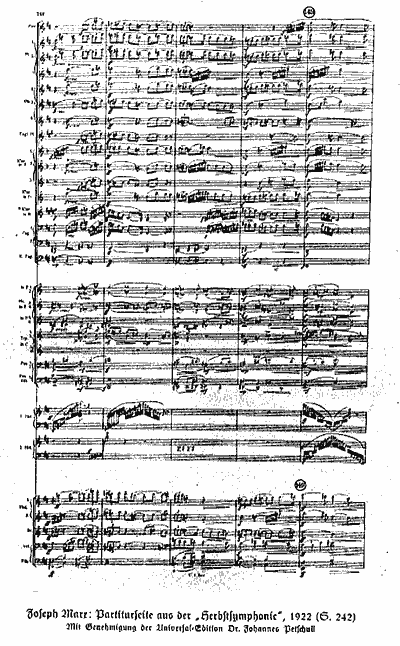
"Eine Herbstsymphonie" (Autumn Symphony)by Joseph MarxOctober 24 and 25, 2005 in Stefaniensaal/Graz"recreation" - Großes Orchester Graz (Large Orchestra of Graz)conducted by Michel SwierczewskiA REPORT BY BERKANT HAYDINAuthor and editor of www.joseph-marx.org(Translated from the German by Alan Howe) 
How the project came aboutIn 2004 Michel Swierczewski, the conductor of ‘Recreation - Großes Orchester Graz’ (‘Large Orchestra of Graz’), who at that point knew and greatly admired the 1st Violin Sonata by Joseph Marx, set off in search of a special rarity which would be worthy of rediscovery. Thus he had the score of the Herbstsymphonie sent to him by Universal Edition. The 280-page, giant-sized score was subsequently examined by him and a series of orchestral musicians - with great reverence, they told me. When it eventually became clear to everyone that they were dealing with a very extraordinary, mammoth work, they discussed the matter with Mathis Huber, the manager of the ‘Recreation’ orchestra and the 'Styriarte' organisation. Because this great composition of Joseph Marx, himself a native of Graz, had not been heard for about 80 years, Mathis Huber eventually gave the green light for a performance in the autumn of 2005. www.micmacmusic.com
A symphony of superlatives with a complex structureBefore one says a single word about the musical and compositional qualities of the Herbstsymphonie and about the technical quality of the performance by the ‘Recreation’ Orchestra and its conductor Michel Swierczewski, one must - even as experienced critics - understand that it is impossible even for the practised ear to fathom and grasp the Herbstsymphonie in its entirety on first hearing, for it is too sophisticated in structure and at the same time too rich in sound, too polyphonic and too gigantic. For this reason a live performance of the Herbstsymphonie would almost certainly represent a great challenge to any orchestra in the world. Stylistic relationship with great contemporariesIn order to gain a rough impression of the Herbstsymphonie, we should imagine the operas and richly orchestrated works of Schreker, Strauss and Korngold, as well as the symphonies of Bax, Howard Hanson and Vaughan Williams, also the most dazzling passages from works such as "La Mer", "Daphnis and Chloé", "The Poem of Ecstasy", "Prometheus - Poem of Fire" and "The Firebird"; then finally we should mix all this with Marx’s own musical language and set it - in the manner typical of the composer - in a many-layered, logical and carefully designed structure. And so it must be evident that we are speaking here of a bewitching, sumptuous work of gigantic dimensions. Masterly performed by conductor and orchestraOn both of the evenings, along with around one thousand people on each occasion, I was privileged to experience the lavishly scored 75-minute Herbstsymphonie played by an almost 100-strong orchestra under a conductor who combined ecstasy with absolute concentration and exemplary dedication. Even the most difficult, sometimes almost impossible passages in which the entire orchestra and percussion have technically to surpass themselves were mastered with great bravura. Yet the quieter, emotionally contemplative pages were also interpreted so expressively by the orchestra that significant numbers of the audience in the Stefaniensaal were quite obviously deeply moved. In the rows all around one could see many individuals sitting with eyes closed, smiling peacefully and allowing themselves to be swept along by the torrent of ecstatic music. Many must have realised that they had been witnessing a very special musical event. A gigantic flood of soundThe sound world conjured up by Joseph Marx in his Herbstsymphonie - one which, with its countless majestic climaxes and examples of opulent symphonic development, is more like some breathtaking, awe-inspiring roller coaster ride through the Himalayas - plunged the Stefaniensaal into an almost unreal atmosphere. And so perhaps this is why the symphony is so difficult to fathom: even after several hearings of the entire work (the final rehearsal and the two performances of 24th and 25th October), it was virtually impossible for myself and those with me (all of us with long experience of listening to the lushly orchestrated large-scale works of the late romantic period) really to take in what was flooding, indeed shaking our very senses, so stunned were we by the great waves of sound. I would describe it like this: the Herbstsymphonie is so astounding in its power, intensity and lavishness, so brimming with passion, and is as a result in the truest sense of the word so overwhelming that, faced with this wild roller coaster of emotions, anyone who hears it must soon acknowledge his inability to come to an immediate understanding of the piece. And the impression which might arise at this point that the Herbstsymphonie is without structure and thus, despite all its beauties, of little consequence turns out, on a third or fourth hearing - to be a great mistake: The score, woven around just four main themes, contains in fact a clear sense of progression and tension which, in the course of the individual movements that describe autumn in all its phases and emotions, is built logically and stretches from the first to the last minute of the symphony. Furthermore, the many completely unexpected changes of key, harmonic turns and switches between minor and major are evidence of the composer’s unprecedented boldness and almost frightening powers of creativity - which took me, a Marx expert, entirely by surprise. The journey does not end hereThus, from a compositional as well as sonic and psychological point of view, the Herbstsymphonie turns out to be a most extraordinary phenomenon - one which I have never before encountered in such an unrestrained form in all my years of studying the large-scale late-romantic/impressionist works of many other composers. And therefore I find myself unable to describe in simple words the feelings which came over me during the two performances (of which the second of 25th October has remained in my memory as the “better one"). Deep emotions, set off by the virtually unending tone-painting and returning motifs which are hidden everywhere in the score alternated with thoughts and memories of the outset of my research into Joseph Marx which had begun five years ago with - and it must have been fate - my “quest of the Herbstsymphonie”. For me things had to some extent come full circle: the initial objective of being able to hear the Herbstsymphonie sometime in my life and to see it recognised by the public has now been achieved, and it seems to me at this point in time virtually impossible to find something else in the sphere of music which will satisfy my thirst for absolute perfection in sound better than the Herbstsymphonie. So the question that arises is this: what will be next and how shall I proceed? What direction will this musical journey take now? Standing at this turning-point, I direct my attention to the choral works of Joseph Marx which were written years before the Herbstsymphonie and are the only orchestral works by the composer still awaiting rediscovery. A personal thank youAfter all this - and on behalf of the several thousand Marx fans from all over the world of whose existence I am aware - I would now like to offer my most sincere thanks and admiration to the courageous manager of the Large Orchestra of Graz and the Styriarte organisation, Mr Mathis Huber, and also to the fascinating and incredibly versatile conductor Michel Swieczewski, and to all of the esteemed members of the orchestra. I wish the orchestra and its management many further successes in the future and hope accordingly that the orchestral and choral works of Joseph Marx will be performed not only in the place of his birth, but also elsewhere in Austria, as well as in many other countries. HOW THE GRAZ PERFORMANCES OF THE HERBSTSYMPHONIE WERE RECEIVEDVoices from the audience: |
|
For latest news on recording projects and concerts see: |
Note: Some of these choral works are also available in other arrangements.
 Joseph Marx (sometimes incorrectly spelled Josef Marx) has been an
active composer over a time scale of almost 50 years. During the first third of this
period he composed a major part of his 150 Lieder (works for voice and piano)
for which he gained worldwide success. Many of his songs were also
published in different other versions (with chamber ensemble/orchestra).
In an interview (1952) Marx said that he -and
also Hugo Wolf and Richard Strauss- actually wrote Lieder because
it was the fashionable thing to do. (see interviews in
the section "Audio Samples..."). Despite his image as a "song composer", his true
mastery and achievement is reflected in his works with orchestra
most of which he wrote between 1919 and 1932. By composing these
stunning orchestral compositions Marx finally brought to a
quintessential summation all the complex symphonic ideas that he
hadn't been able to express in his early works.
Joseph Marx (sometimes incorrectly spelled Josef Marx) has been an
active composer over a time scale of almost 50 years. During the first third of this
period he composed a major part of his 150 Lieder (works for voice and piano)
for which he gained worldwide success. Many of his songs were also
published in different other versions (with chamber ensemble/orchestra).
In an interview (1952) Marx said that he -and
also Hugo Wolf and Richard Strauss- actually wrote Lieder because
it was the fashionable thing to do. (see interviews in
the section "Audio Samples..."). Despite his image as a "song composer", his true
mastery and achievement is reflected in his works with orchestra
most of which he wrote between 1919 and 1932. By composing these
stunning orchestral compositions Marx finally brought to a
quintessential summation all the complex symphonic ideas that he
hadn't been able to express in his early works.
Most of the details below are the result of extensive investigations that took several months. As I have reported, only a handful of these works have ever been commercially recorded. This opus list was very difficult to compile since all existing lists that can be found in Marx biographies or music dictionaries are incomplete. After having evaluated almost every source that one can have access to, I am now able to present the first and only complete list of all works by Joseph Marx. (Please note that Marx didn't use opus numbers).
An excellent and complete German overview of Marx's works that was
perfectly made by Johannes Hanstein and that is based on my below work list, can be found here.
Orchestral works without voice/chorus:
1916-19:
1st piano concerto "Romantisches Klavierkonzert" (Romantic Piano Concerto) in E major, 37-43 minutes. This amazingly euphonic and extremely virtuosic work has been performed many times by Angelo Kessissoglu (who also performed its premiere), then frequently by the great Walter Gieseking and later in the 1970s and 80s by Jorge Bolet (who reported that he had discovered the score of his "favorite concerto" in the private music library of a friend), and it was eventually issued on a Hyperion CD (CDA66990) with super-virtuoso Marc-André Hamelin. The movements are:
Publisher: Universal Edition (UE 6018). A version for two pianos is also available.
The Austrian pianist Prof. Hans Petermandl who has performed Marx's 2nd piano concerto "Castelli Romani" twice (in 1978 with the Vienna Symphony Orchestra conducted by Karl Etti and in 1981 with the Munich Philharmonic Orchestra conducted by Lior Shambadal) told me that one of his pianist friends met Jorge Bolet who could not help saying: "The Romantic Piano Concerto is my favorite concerto. It is so beautiful, so wonderful, you should play it!"
Detailed information on the Romantic Piano Concerto is available here!
1920/21:
Eine Herbstsymphonie (An Autumn Symphony) in B for large orchestra
Dedicated to Mrs. Anna Hansa, famous singer and Marx's Lied performer in the 1910s and 1920s and Marx's lifetime romance and partner from around 1910 until his death in 1964.
Marx began to compose his symphony in 1920 (just after having completed the Romantic Piano Concerto) and finished it 21 Nov 1921. He wrote it in a secluded countryhouse named "Villa Grambach" (Grambach is the name of a small village to the south of Graz). This house owned by Anna Hansa's family was the place where Marx preferably spent the summer months and composed a major part of his music.


Villa Grambach near Graz - The place where Marx composed a
major part of his works and spent much time with his friends Franz
Schmidt, Franz Schreker, Leopold Godowsky, Wilhelm Kienzl, Karl
Böhm, Rudolf Hans Bartsch, Clemens Krauss, Anton Wildgans,
Angelo Kessisoglu and many more. The guestbook of Villa Grambach
shows the names of many composers and conductors of worldwide
fame. If you want to view a couple of great photos of this house
as it is looking today, please click here to see my Travelogue

The available information sources about the duration of the symphony vary between "75 minutes" (Universal Edition's catalogue) and "more than two hours" (newspaper articles from the 1920s). Due to the score of the symphony and the duration of "Feste im Herbst" (see "Latest news"), I would estimate that the symphony should last about 80-90 minutes if performed not rushed.
Orchestration: more than 30 wind instruments, percussion, celesta, two harps, piano and large string orchestra. The movements are:
Publisher: Universal Edition (UE 7438 and 7439)
LATEST NEWS

After 1927 the final movement of the symphony ("Herbstpoem") was performed separately only one last time on 22 Oct 1934 by conductor Bernhard Paumgartner in Vienna (orchestra unknown, likely Vienna SO). This is the very last performance date of any unrevised part of the Herbstsymphonie that I could find at all. Austrian newspaper articles from the 1960s that were sent me by Marx pupil and expert Prof. Dr. Wolfgang Suppan say that the "Herbstsymphonie was re-performed in the 1950s under the title Feste im Herbst" (aka "Herbstfeier", Autumnal Revelries, published in 1946). This is not correct since I found out by chance (in other words: by receiving the inspiration to compare the score of Herbstpoem with my recording of Feste im Herbst!) that the masterwork "Feste im Herbst" that was performed many times in Austria till the 1980s but never commercially recorded is nothing but a shortened and slightly revised re-issue of the Herbstsymphonie's final movement "Herbstpoem"!
What is the difference between "Feste im Herbst" and "Herbstpoem"?
The score of Feste im Herbst runs to 100 pages while the score of the Herbstpoem includes 115 pages. Feste im Herbst is lighter orchestrated (less wind instruments, less strings, only one harp instead of two) and it includes several rhythmical and instrumental changes compared with the Herbstpoem. But aside from this, Feste im Herbst is mainly identical with the final movement of the symphony.
Hard to believe that no-one ever knew that the outstanding work "Feste im Herbst" is a slightly revised version of the final movement of the Herbstsymphonie. Ironically, the first three movements of the Herbstsymphonie that evidently contain a large amount of the composer's theme material of the earlier works (in 1921 Marx had already composed 120-150 Lieder and most of his chamber music) were never heard again since the 1920s.
Marx who has educated more than a whole generation of composers, conductors and musicologists from all over the world during his 43 (!) years as a teaching professor in composition, harmony and counterpoint (he had 1255 students during this long period) most likely has never been happy about the fact that just his largest and most important work has never been performed completely again (let alone recorded) in his lifetime. Hence, the world of classical music clearly needs a complete recording of the Herbstsymphonie.
"Though derived from the last movement of the Autumn Symphony of 1921 "Feste im Herbst" is best regarded as a symphonic poem in its own right. As such it must serve as an appetizer for the much longer parent work from which it is extracted. Hearing this work leads to tantalizing conjecture about how many of the themes, so fleetingly heard in the first part of the symphonic poem, might have been developed at length in the first three movements of the symphony. "Feste im Herbst", in its 1946 revision, marks both the high water mark of German Romanticism and its ebbing in the face of more modern and less lyrical developments. It is a vast confluence of multiple influences, from the Brahms of the second symphony and the Bruckner of the fourth, through Slavonic, even Dvorak-like, dance measures to the impressionism of Debussy. All these are welded together with a Latin lucidity that recalls Respighi. It is the genius of Marx that he weaves these desperate threads together into a design that is in the end totally his own. A great sonorous culmination of the romantic, the very Autumn of the genre. After this there could only come the bleak winter of atonalism and intellectualism. Yet it is a joyous farewell, a rich and glowing sunset that turns the leaves to gold as they fall." (John Rowland Carter)

Joseph Marx in 1925, during the great success of his Autumn
Symphony
1922-25
In this period Marx wrote three breathtakingly impressionistic works that are also known as "Naturtrilogie", "Natur-Trilogie" or "Natur-Suite" (Nature Trilogy or Nature Suite):
Detailed information on the Idyll is available here!
NEWS: A truly gorgeous recording of this "Nature Trilogy" has been released on ASV! For more information on Vol. 1 of the "Complete Orchestral Music" series please click here.
1928:
Festliche Fanfarenmusik (Festive Fanfare Music) in B major for 22 brass instruments and small percussion set. About 4-5 minutes.
Publisher: Universal Edition (UE 18731)
1929:
Nordlands-Rhapsodie (Nordic Rhapsody). About 30-35 minutes. Based on Pierre Loti's novel "An Iceland Fisherman" (1886) about an Icelandic love tragedy, and that's how this remarkable work sounds like. The movements are:
Publisher: Universal Edition (UE 11598)
1929-30:

2nd piano concerto "Castelli Romani" in E flat major: Three pieces for piano and orchestra. 30-35 minutes. Marx had always been inspired by the beautiful landscapes and monuments of Italy since he had been travelling to Italy many times as a child (because of his mother who was half Italian). This stunning work is one of Marx's most delightful declarations of love to Italy and its beauty.
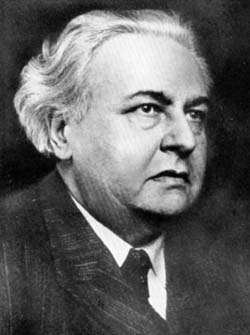
Walter Gieseking performed the premiere of this virtuoso concerto and also was the soloist in numerous later performances till the 1950s. Castelli Romani has besides been performed in the United States and in several European countries (among others in England for the BBC) at least till the late 1950s. The Austrian pianist Frieda Valenzi has given many performances of this work with various Austrian orchestras in the 1950s and 60s. Later, in 1978 and 1981, another Austrian pianist, Hans Petermandl, performed the work twice, while the German pianist Julius Bassler frequently performed its 3rd movement with several German radio orchestras from the end of the 1960s to the end of the 1970s. The most recent performance of "Castelli Romani" took place on March 28/29, 1982, in the Stefaniensaal of Graz (pianist Alexander Jenner and the Grazer Philharmonisches Orchester conducted by Peter Schrottner). The movements are:
Publisher: Universal Edition (UE number not available). A version for two pianos is also available.
NEWS: The two piano concerti "Romantisches Klavierkonzert" (Romantic Piano Concerto) and "Castelli Romani" were recorded by the Label ASV with the American virtuoso David Lively as Vol. 4 of the Complete Orchestral Music series. For further information please click here.
1941-42:
Alt-Wiener Serenaden (Old Vienna Serenades) for large orchestra. About 17-21 minutes. Dedicated to the Vienna Philharmonics on the occasion of their 100th anniversary. Composed within his tendency to classicism, in a style between Haydn and Schubert but it also includes Marx's characteristic elements of impressionism. Marx wrote it during his final work period in which he also composed his string quartets. The movements are:
Publisher: Universal Edition (UE 11358)
1944:
"Sinfonia in modo classico" for string orchestra. About 26 minutes. This is a string orchestra version of his own "Quartetto in modo classico" (not yet recorded in this string orchestra version). Publisher: Doblinger, Vienna. Score available. The movements are:
1945:
"Partita in modo antico" for string orchestra. About 26 minutes. This is a string orchestra version of his own "Quartetto in modo antico" (not yet recorded in this string orchestra version). Publisher: Doblinger, Vienna. Score available. The movements are:
NEWS: The above three orchestral works in traditional style were recorded as Volume 3 of the series (ASV). For further information please click here.
1946:
"Feste im Herbst" (also known as "Herbstfeier"; "Autumnal Revelries") for large orchestra. About 25 minutes. Is practically identical with the final movement of the Herbstsymphonie (for details see "Latest news" above where also an analysis of this work is given). Marx published this work in 1946 obviously as a reaction to the sad fact that the Herbstsymphonie hadn't been performed again over the last 10-15 years (the first three movements of the symphony even hadn't been performed for 20 years). The score is available at Universal Edition but one should note that this work is almost identical with the final movement of the Herbstsymphonie that has never been completely performed since the 1920s. Hence, a world premiere recording of "Feste im Herbst" should by all means bring on a first recording of the whole symphony.


Joseph Marx at his home in Vienna, Traungasse 6
(1963).
For more photos of this house please click here
 Back to the overview of this chapter
Back to the overview of this chapter
Symphony No. 1 (1901)
Symphony No. 2 (1906)

My knowledge of these two symphonies is based on a letter written by Marx after the premiere of the Herbstsymphonie. There he wrote: "In fact, this symphony is my third symphony since I always kept secret my first symphony that I composed at the age of 19 and also my second one that I wrote at the age of 24." Due to the Liess biography one of these youth symphonies is in C sharp minor (I couldn't figure out which one, likely No. 2). Fact is that Marx reused themes of the adagio part/movement of the C sharp minor symphony later in his Herbstsymphonie.
One of the two youth symphonies is known as "Symphony in one movement for orchestra" and due to the Austrian National Library it has indeed an adagio part. These youth symphonies have never been published as Universal Edition doesn't have their scores. However, the score (a rough draft of 11 pages) of the unfinished "Symphony in one movement for orchestra" (that might be identical with the "Symphony in C sharp minor" that is mentioned in the Liess biography since they both include an adagio part) can be found at the Austrian National Library. Due to the first page of the score this symphony is Marx's 4th work (it's titled "opus 4" although Marx didn't use opus numbers. Perhaps Marx used opus numbers only for his earliest works and then gave up numbering after he had begun to compose his first huge series of Lieder.)
Piano Concerto. The score (a rough draft of 13 pages) can be found at the Austrian National Library. One might assume that this is the rough draft of his first piano concerto, the Romantisches Klavierkonzert that was written in 1919.
Fragmentary rough draft of a work for string orchestra (4 pages, Austrian National Library). No more information available.
Unidentified stage play, obviously never continued nor finished: On 4 Apr 1926 a journalist asked Marx about his current composing projects. Marx answered: "At the moment I am composing the Nordic Rhapsody and a stage play that is not an opera." Unfortunately I couldn't find out which work Marx was referring to. None of the rough drafts of Marx's orchestral works at the Austrian National Library can be connected with that obscure stage play.
Rough draft for a fanfare music (10 pages; Austrian National Library).
"Island-Suite" (1927-28, "Iceland Suite"). The unfinished score (a rough draft of 34 pages) of this work can only be found at Austrian National Library. In order to find out if "Island-Suite" is the rough draft of Marx's next work "Nordlands-Rhapsodie" one would have to compare the two scores. However, the fact that the "Nordlands-Rhapsodie" is based on the novel "Iceland Fisher" by Pierre Loti might be an indication of this assumption.
"Symphonische Rhapsodie" (Symphonic Rhapsody) for large orchestra (1929). About 9 minutes. This work is identical with the 1st movement of the Nordlands-Rhapsodie (see above). It was sometimes performed separately.
"Symphonische Tänze" (Symphonic Dances) for large orchestra. About 9 minutes. It seems to be a short version or a kind of variation on several themes from "Feste im Herbst" (see above; also see "Latest news" above) or a variation on themes that are directly taken from the "Herbstpoem" (final movement of the Herbstsymphonie). None of the sources has the score of this work of which I have an old recording. I guess that the score got lost after the work was performed and recorded by the Austrian radio station. Performance details due to the announcement at the beginning of my recording: Vienna Symphony Orchestra conducted by Karl Etti who was one of the main conductors of Marx's orchestral works besides Max Schönherr and Karl Böhm.
 Back to the overview of this chapter
Back to the overview of this chapter
Works for voice and orchestra:
Since Universal Edition was unable to provide a list of all "official" English titles (esp. regarding Marx's vocal works that were mainly translated by John Bernhoff), the English titles shown below were translated by myself and are therefore supplied without liability for errors.
(The scores of the following works for voice and orchestra/chamber ensemble can all be obtained at Universal Edition. The English lyrics are also available at UE for most of these works.)
NEWS: The works for voice and orchestra were recorded for ASV (as Vol. 2 of the CD series) with the soloists Angela Maria Blasi (soprano) and Stella Doufexis (mezzo-soprano). For more information please click here.

"Verklärtes Jahr" (Transfigured Year) -
A song cycle for medium voice and orchestra (1930-32). About
18-21 minutes. This is the last work of Marx's main "orchestral
period" (1919-1932). Its version for voice and piano has already
been commercially recorded by FY Solstice (see "Discography") but
one can hear an enormous difference between the sound worlds
created by these two different versions. This orchestral Song
Symphony is one of the most evident proofs for the fact that
Marx had never been able to realise his complex ideas before in his
works for voice and piano although the phenomenal pianistic
virtuosity of their piano parts creates a huge variety of
impressionistic effects that we won't hear in the piano parts of
songs written by any other Lied composer. Some critics even wrote
that Marx's songs for voice and piano were nothing but "Piano
concertos with voice obligato".
"Verklärtes Jahr" in its miraculous
orchestral version brings together a number of the greatest "sound
effects" that Marx has ever composed. Its five movements are:

Marx with some of his renowned Turkish students (Vienna, 1931):
Necil Kazim Akses (left), Marx, Cemal Resit Rey and Hasan Ferit Alnar
Orchestral scores of some of the following Orchestral Songs
were used as film music in the movie "Cordula" (1950). More information and
pictures of this movies's cinema magazine
can be found here
Marx orchestrated most of the following songs in the 1930s.
"Am Brunnen" (At the Fountain) for medium voice and string orchestra (1912). About 1 minute. Lyrics by Paul Heyse. Also available in a version for voice and string quartet.
"Barcarole" for high voice and orchestra (1910). About 6 minutes. Lyrics by A. F. von Schack.
"Begegnung" (The Encounter) for medium voice and string orchestra (1912). About 2 minutes. Lyrics by Paul Heyse. Also available in a version for voice and string quartet.
"Der bescheidene Schäfer" (The unassuming Shepherd) for high voice and string orchestra (1910). About 2 minutes. Lyrics by Christian Weisse. Also available in a version for voice and string quartet.
"Der (Die) Liebste spricht" (The Darling is speaking) for medium voice and string orchestra (1912). About 1 minute. Lyrics by Paul Heyse. Also available in a version for voice and string quartet.
"Erinnerung" (Memory) for medium voice and orchestra (1911). About 3 minutes. Lyrics by Joseph von Eichendorff.
"Hat Dich die Liebe berührt" (If love hath entered thy heart) for high or low voice and orchestra (1908). About 3 minutes. Lyrics by Paul Heyse.
"Japanisches Regenlied" (Japanese Rain Song) for medium voice and orchestra (1909). About 2 minutes.
"Jugend und Alter" (Youth and Age) for medium voice and orchestra (1909). About 2 minutes. Lyrics by Walt Whitman.
"Maienblüten" (May Blossoms) for high voice and orchestra (1909). About 2 minutes. Lyrics by Ludwig Jacobowsky.
"Marienlied" (Song of Mary) for high voice and orchestra (1910). About 3 minutes. Lyrics by Novalis.
"Piemontesisches Volkslied" (Piemontesian Folk Song) for high voice and string orchestra (1911). About 1 minute. Lyrics by Max Geissler. Also available in a version for high voice and string quartet.
"Selige Nacht" (Blessed Night) for high voice and orchestra (1913/14). About 3 minutes. Lyrics by Otto Erich Hartleben.
"Sendung" (The Message) for medium voice and string orchestra (1912). About 1 minute. Lyrics by Paul Heyse. Also available in a version for voice and string quartet.
"Sommerlied" (Summer Song) for high voice and orchestra (1909). About 1 minute. Lyrics by Emmanuel Geibel.
"Ständchen" (Serenade) for high voice and string orchestra (1912). About 2 minutes. Lyrics by Paul Heyse. Also available in a version for high voice and string quartet.
"Und gestern hat er mir Rosen gebracht" (He brought me roses yesterday) for high voice and orchestra (1908). About 2 minutes. Lyrics by Th. Lingen.
"Venetianisches Wiegenlied" (Venetian Lullaby "Nina Ninana") for medium voice and orchestra (1912). About 3 minutes. Lyrics by Paul Heyse. Also available "Venetianisches Wiegenlied" for medium voice and string orchestra with harp. Additionally available in a version for medium voice and string quartet with harp. At the Austrian National Library besides available in a version for for voice and string quartet.
"Waldseligkeit" (Bliss in the Woods) for high voice and string orchestra (1911). About 3 minutes. Lyrics by Richard Dehmel. Also available in a version for high voice and string quartet.
"Wofür" (For what) for medium voice and string orchestra (1912). About 1 minute. Lyrics by Paul Heyse. Also available in a version for voice and string quartet.
"Zigeuner" (Gipsy) for high voice and orchestra (1911). About 3 minutes. Lyrics by Max Geissler.
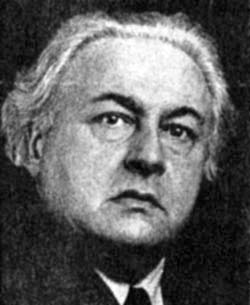
Besides, Marx arranged five songs by Hugo Wolf for voice and orchestra:
 Back to the overview of this chapter
Back to the overview of this chapter
Choral works with/without orchestra:
(Scores are available at UE. Not yet recorded.)
|
My following article was issued in the monthly newsletter of European Cultural Services (Editor: Heinz Prammer, Vienna) that is sent to thousands of choral societies in Europe. Click here to visit the website of European Cultural Services. Renaissance of Joseph Marx's outstanding choral worksWritten in German and translated to the English
|
Works for mixed chorus:
"Herbstchor an Pan" (Autumn Chorus to Pan)
for mixed choir, boys' choir, orchestra and organ (1911).
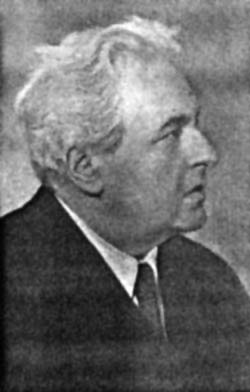 About 20 minutes, lyrics by Rudolf Hans Bartsch. The subtitle of
this symphonic poem is: "In memory of a luminous autumn day
in the South Steiermark". Due to Liess's biography this
work creates a glimmering world of impressionism and makes
intensive use of the art of counterpoint. With its powerful
sonority and effective polyphony this treasure is said to be the
precursor of the Herbstsymphonie. Furthermore, Marx
here reuses elements of the main theme of "Windräder"
(Wind Mills) that is said to be his most brilliant song at
all. No performance dates available at all. Seemingly never been
performed again since its year of origin. DECEMBER 2001: As reported by Dr. Roman
Rocek from the Austrian Richard Maux Society, there has been a
performance of "Herbstchor an Pan" in the 1950s in the
Musikverein. [Note: Richard Maux, 1893-1971, a vastly neglected
Austrian late romantic who was friends with Marx and composed in a
similar style.] Due to the piano scores of "Herbstchor an Pan" and
"Morgengesang", Marx's charmingly romantic impressionism was here
developed to its utmost level only surpassed later in his
Herbstsymphonie. I hereby call upon all choirs to cooperate
with their orchestras in order to perform or record these two
masterworks of romantic choral music.
About 20 minutes, lyrics by Rudolf Hans Bartsch. The subtitle of
this symphonic poem is: "In memory of a luminous autumn day
in the South Steiermark". Due to Liess's biography this
work creates a glimmering world of impressionism and makes
intensive use of the art of counterpoint. With its powerful
sonority and effective polyphony this treasure is said to be the
precursor of the Herbstsymphonie. Furthermore, Marx
here reuses elements of the main theme of "Windräder"
(Wind Mills) that is said to be his most brilliant song at
all. No performance dates available at all. Seemingly never been
performed again since its year of origin. DECEMBER 2001: As reported by Dr. Roman
Rocek from the Austrian Richard Maux Society, there has been a
performance of "Herbstchor an Pan" in the 1950s in the
Musikverein. [Note: Richard Maux, 1893-1971, a vastly neglected
Austrian late romantic who was friends with Marx and composed in a
similar style.] Due to the piano scores of "Herbstchor an Pan" and
"Morgengesang", Marx's charmingly romantic impressionism was here
developed to its utmost level only surpassed later in his
Herbstsymphonie. I hereby call upon all choirs to cooperate
with their orchestras in order to perform or record these two
masterworks of romantic choral music.
"Ein Neujahrshymnus" (A New Year's Hymn) for mixed choir and orchestra (1914). In Autumn 2004, this work was orchestrated by Stefan Esser and Berkant Haydin (author of this website; see red info box below). Text: Joseph Marx. Duration: approx. 10 minutes. A majestic, stirring hymn to life. Due to the highly inspired text of Joseph Marx, this work can also be performed as a sacred work. Film music composers arranged fragments of it for mixed choir and orchestra in the year 1950.
"Berghymne" (Mountain Hymn) for mixed choir and orchestra (possibly written in 1910). Text: Alfred Fritsch. Duration: approx. 4 minutes. The original score of this dazzling rarity is available as a "particell" (reduced score) i.e. a kind of extended piano score including choral voices (unison) and a few basic orchestral voices. It was fully arranged by Stefan Esser and Berkant Haydin for mixed choir and orchestra in 2005.
|
"A New Year's Hymn" and "Mountain Hymn" by Joseph Marx Orchestrated by Stefan Esser and Berkant Haydin (the author of this website)! * * * published by Universal Edition * * * Click here for detailed info, music samples (MP3) and score pages |
Works for male chorus:
"Morgengesang" (Morning Chant) for male choir and orchestra (1910; orch. 1934 by A. Wassermann). About 8 minutes, lyrics by Ernst Decsey. Also available in a version for male choir, brass instruments and organ, and besides in another version for male choir and brass orchestra. "Morgengesang" was originally written for male choir and orchestra in 1910. In the summer of 1932, Marx arranged it for brass orchestra on the occasion of the 100th anniversary of Goethe's death. The latest performances of which I know have been in 1947 (Wiener Schubertbund and the Vienna Symphony Orchestra conducted by Prof. Viktor Keldorfer) and in 1951 (in Switzerland), and also by the Wiener Schubertbund in 1954 (with organ), in 1956 performed by the Niederösterreichisches Tonkünstlerorchester conducted by Leo Lehner and in 1969 conducted by Heinrich Gattermeyer (without orchestra).
„Morgengesang" for male choir, brass orchestra and organ.
„Morgengesang" for male choir and brass orchestra.
"Ein Neujahrshymnus" for male choir and organ.
„Abendweise" (Evening Melody) for male choir, 4 horns, 2 trombones, tuba, timpani and organ (1912). Dauration: 14 minutes. Text: Ernst Decsey.
"Gesang des Lebens" (Song of Life) for male choir and organ (1914). This work is dedicated to the famous Austrian chorus master Viktor Keldorfer and the Wiener Schubertbund (Vienna Schubert Choral Society). Duration: 6 minutes. Text: Otto Erich Hartleben (from "Diogenes"). This work is also available at Universal Edition in another version for medium voice and piano.
Unpublished (unfinished) choral works (score drafts available at the Austrian National Library):
 Back to the overview of this chapter
Back to the overview of this chapter
(Scores are available at UE. Partially recorded.)
Works for violin and piano:
1st sonata for violin and piano in A major (1913). About 55-65 minutes. Already recorded, see "Discography". The movements are:
(The 4th movement was also released as "Phantasie und Fuge" for violin and piano.)

2nd sonata ("Frühlingssonate", "Spring Sonata") for violin and piano in D major (1945). About 19-23 minutes. The existing recording (see "Discography") is nothing but a re-issue of a performance from almost 50 years ago. Though composed during the final composing period in which Marx turned towards classicism this enjoyable sonata is rather written in the colorful style of most of his chamber music from around 1910-1915. Here one can be witness of Marx's tendency to reusing memorable theme material from his own earlier chamber and vocal works and developing it within his later orchestral and other works, sometimes even if these were written decades later. So this sonata from the mid 1940s begins with a remarkable tune that can also be heard at the beginning of the opening movement of his first violin sonata from 1913, and we can also hear other short sequences that were used in the first half of "Feste im Herbst" from 1946 (or in the final movement of his Herbstsymphonie (1920/21) that is practically identical with "Feste im Herbst" as shown above).
Brief excursion into the topic "Reuse of material": Prokofiev often reworked material in several forms, so did Vaughan-Williams. Mozart and others arranged their opera tunes for wind band. Debussy's piano music is arranged for orchestra. Numerous other composers wrote an opera and a ballet by the same name and used the same material. A hundred years ago most composers transcribed opera and orchestral music for piano. Mahler movements were often performed alone. The ballets of Peter Tchaikovsky were filleted to make shorter works with other names and plots. The Khachaturian violin concerto exists in a near note for note version for flute and orchestra. Korngold re-used many of his Hollywood film music themes in his late orchestral works. There are plenty of even more striking examples, e.g. Elgar who is known for having extensively repeated a few themes.
The movements of Marx's "Spring Sonata" are:
Works for cello and piano:
Suite for cello and piano in F major (1914). About 35 minutes. Already recorded, see "Discography". The movements are:
"Pastorale" for cello and piano (1914). About 6 minutes. Already recorded, see "Discography".
Works for trio ensemble (not yet recorded):
"Trio-Phantasie" (Trio Fantasy) for violin, cello and piano in G minor (1913/14). About 40 minutes. Not yet recorded. The movements are:
Works for piano quartet (not yet recorded):
"Klavierquartett in Form einer Rhapsodie" (Piano Quartet in rhapsodic form) (1911). Score: 53 pages. Duration approx. 35 min.
"Ballade (Ballad) for violin, viola, cello and piano" in A minor (1911). Duration approx. 17 min.
"Scherzo for piano quartet" (1911). Score: 33 pages. Duration approx. 15 min.

Joseph Marx - Anna Hansa
Works for string quartet:
String Quartet in A major (1936). This is the original version of the "Quartetto chromatico".
"Quartetto chromatico" (1936, rev. 1948). Duration approx. 29 min. This is a shortened and revised version of the "String Quartet in A major" from 1936. Already recorded, see "Discography". The movements are:
"Quartetto in modo antico" (1937/38). Duration approx. 26 min. Already recorded, see "Discography". Its string orchestra version is available at Doblinger. The movements are:
"Quartetto in modo classico" (1940/41). Duration approx. 25 min. Already recorded, see "Discography". Its string orchestra version is available at Doblinger. The movements are:
Rough draft of a work for string quartet (only 3 pages; Austrian National Library)
Works for other chamber ensembles of which the scores are not available:
"Grand Duo" for two cellos (titled "opus 5")
"Adagio for cello"
(My knowledge of these two works is based on documents that are about 50 years old. No more information available.)
UPDATE: These two works (Grand Duo for two cellos and Adagio for cello)
were written by another composer named Joseph M. Marx (1792-1836):
JOSEPH M. MARX, born in 1792 at Wurzburg, where be also received his musical education, began his artistic career as member of the Theatre orchestra at Frankfort-on-the-Main, whence he went to Vienna, in order to study under Merk. Later on he worked in the Stuttgard orchestra, until he was appointed first Violoncellist at Carlsruhe. He finally was musical director there, and died while working in this capacity on November 11, 1836.
His daughter, Pauline, made her appearance on the stage as a singer during the years 1880-40.
Chamber works that are identical with movements of chamber works listed above:
"Phantasie und Fuge" (Fantasy and Fugue) for violin and piano. This is identical with the final (4th) movement of the Sonata for violin and piano in A major from 1913 (see above) that has already been recorded (see "Discography"). Its score is separately available.
"Menuett" for cello and piano. This is identical with the 3rd movement of the Suite for cello and piano in F major (1914, see above) that has already been recorded (see "Discography"). Its score is separately available.

 Back to the overview of this chapter
Back to the overview of this chapter
(Scores are available at UE. Major part not yet recorded.)

4 Lieder with various small chamber ensemble written in 1916 and based on lyrics by Anton Wildgans (1881-1932) who was one of Marx's closest friends (photo shot by Marx in 1926):


Works for voice and piano quintet:
"Valse de Chopin" for medium voice and piano quintet. About 4 minutes. Lyrics by Albert Giraud (from "Pierrot Lunaire").
Sommerlied "O Sommerfrühe, blau und hold" (Summer Morning Song) for voice and piano quintet. Lyrics by Emmanuel Geibel. The score of this work is only available at the Austrian National Library.
Works for voice and string quartet:
6 Lieder for voice and string quartet
that are also available in versions for voice and string orchestra
(see above):
[On 25 Jan 2001 Ildikó Raimondi and the Artis Quartet performed these six Lieder for voice and string quartet in a version for soprano at the concert hall of the Wiener Musikverein. Here we can see the living popularity of Marx's vocal compositions, at least regarding his songs for voice and piano/chamber ensemble as these are being performed occasionally.]
"Piemontesisches Volkslied" (Piemontesian Folk Song) for high voice and string quartet (1911). About 1 minute. Lyrics by Max Geissler. Also available in a version for high voice and string orchestra.
„Ständchen" (Serenade) for high voice and string quartet (1912). About 2 minutes. Lyrics by Paul Heyse. Also available in a version for high voice and string orchestra.
"Waldseligkeit" (Bliss in the Woods) for high voice and string quartet (1911). About 3 minutes. Lyrics by Richard Dehmel. Also available in a version for high voice and string orchestra.
"Venetianisches Wiegenlied" (Venetian Lullaby "Nina Ninana") for medium voice and string quartet with harp (1912). About 3 minutes. Lyrics by Paul Heyse. Also available in two other versions: for medium voice and orchestra or string orchestra with harp (at UE). At the Austrian National Library additionally available in a version for voice and string quartet.

 Back to the overview of this chapter
Back to the overview of this chapter
Six incredibly gorgeous piano pieces from 1916 of which the scores are available at UE and that have already been recorded (see "Discography"):
Universal Edition reported that the above six piano pieces will be
made available in November 2005 as "Digital Download" at the following web sites:
www.sheetmusicnow.com
www.universaledition.com/downloads
The following ten piano pieces (undated and not yet recorded) will hopefully be published by UE. I'm grateful to the pianist Jonathan Powell who has been evaluating all scores that I sent him in 2004. If UE should publish them, it is thanks to him.
And these are the remaining unpublished piano pieces that were declared by Jonathan Powell to be juvenile works or unusable incomplete drafts:
The "Corona-Collection No. 93", published by Universal Edition, includes Marx's own piano transcriptions of his following seven songs (the collection also includes his piano piece "Albumblatt" from 1916):
Also, the Austrian National Library has the scores of Marx's piano transcriptions of the following two works:
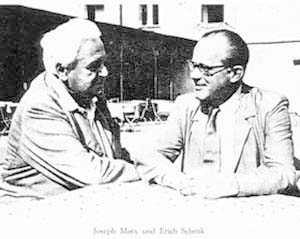
 Back to the overview of this chapter
Back to the overview of this chapter
On behalf of the author of this website, the German organist Arno Hartmann is currently working on an edition of the unpublished organ works by Joseph Marx, with the intention of having them published by Universal Edition as soon as possible.
The choral works with organ are listed above, see "Choral works with/without orchestra".
(The scores of the following organ pieces are only available at the Austrian National Library. Not yet recorded.)
"Symphonischer Prolog" (Symphonic Prologue) for organ (1904).
Undated organ pieces:
Besides, Marx arranged the following piece for solo organ of which the score is only available at the Austrian National Library:
Marx also wrote two works for high voice and organ of which the scores are available at UE:
 Back to the overview of this chapter
Back to the overview of this chapter
According to a report by a former musician of the Graz Philharmonic Orchestra, the Austrian composer and conductor Johann Wilhelm Ganglberger (1876-1938) who was friends with Joseph Marx, has orchestrated a couple of Marx songs. These orchestral songs were performed in the 1970s by the Graz Philharmonics under Gustav Cerny or Ernst Märzendorfer (the performances must have been organized by the Musikverein für Steiermark, Graz). Unfortunately, this information has not been confirmed yet.
As reported to me by Dr. Steven Harlos (University of North Texas), there exists an orchestration of the "Menuett" (third movement of Marx's "Suite for Cello and Klavier" in F Major of 1914) in the music library of the above-mentioned university (Music Special Collections). According to Dr. Harlos, this arrangement by Emil Bauer which consists of 15 orchestral parts (including harmonium) appears to be a free adaptation, and the cello is not featured as soloist. It is from a collection of arrangements which were used for radio broadcasts in the 1920s and 30s, and it has never been performed at the University. The other listings by the name Emil Bauer show that he has also arranged works by Richard Strauss, Anton Bruckner, Carl Goldmark and others. Please click here to view the library's catalog entry. The same arrangement can be found in the music collection of the Austrian National Library.
Heinz Sandauer and Willy Schmidt-Gentner arranged parts of several orchestral songs of Joseph Marx ("Marienlied", "Hat Dich die Liebe berührt", "Und gestern hat er mir Rosen gebracht", "An einen Herbstwald") for the Film "Cordula" (1950, with Paula Wessely; Director: Gustav Ucicky; after the epic poem "Kirbisch" by Anton Wildgans). The movie also features an orchestrated part of Marx's "String Quartet in modo classico" arranged by the same musicians. However, their most striking arrangement of a Marx work in this movie seems to be the stunning orchestration of Marx's choral work "Ein Neujahrshymnus" ("A New Year's Hymn", arr. for mixed chorus, organ and orchestra!), which can be heard at the beginning of the film (approx. 2 minutes) and also at the end (for another 30 seconds): Neujahrshymnus-1950.mp3
In 2004, the composer Stefan Esser and I (the author of this website) orchestrated the above mentioned work "Ein Neujahrshymnus" (original version for male choir and organ) by arranging it for mixed choir and orchestra. Universal Edition, Vienna, has already confirmed the publication of our arrangement. For detailed information (incl. MP3 samples) please click here.
In January/February 2004, Stefan Esser and I also orchestrated Marx's reduced score of "Berghymne" ("Mountain Hymn") by arranging it for mixed choir (unison) and orchestra.. Click here for detailed info including a complete Demo recording as an MP3 file.
In 1934, the choral work "Morgengesang" (Morning Chant) was arranged for male chorus and orchestra by A. Wassermann (published by Universal Edition).
Marx's song "Nocturne" (1911; Otto Erich Hartleben) was arranged for solo piano by Dr. Franz Spieler (any information about Spieler would be welcomed).
Marx's piano piece "Prelude in e flat minor" (which he composed in 1916 together with the "Fuge") was arranged for 2 pianos by Louis Ree.
 Back to the overview of this chapter
Back to the overview of this chapter
http://www.joseph-marx.org/
© 2001-2006 Berkant Haydin
Visits:
|
REQUEST TO THE READER: |
GENESIS OF THIS PROJECT:
In June 2001, I was contacted by Andrea Kleibel-Kertsman, Artist Manager and former Sony Classical Record Executive. She informed me that the British label ASV would like to produce a CD presenting some orchestral works by Marx and Korngold. While this concrete project was kept in the pipeline (and, by the way, was never realised), Mrs. Kleibel-Kertsman brought my correspondence with her to the attention of her husband Miguel Kertsman, a record producer and recording executive (visit his website). Later, in October 2001, I coincidentally contacted Miguel Kertsman without realising the connection between him and Mrs. Kleibel-Kertsman, and drew his attention to my website. When I suggested him to produce a CD series with the complete orchestral works of Joseph Marx, he was highly interested so that I started to provide to him any information that could be required for such a huge project, which also included a complete schedule of how the CD series could be optimally compiled from Volume 1 to the end.
In February 2002, i.e. only four months after the beginning of our contact, Miguel Kertsman was able to present the news that the label ASV, London, had agreed to undertake the project of a complete orchestral works series with the Bochumer Symphoniker conducted by Steven Sloane.
In March 2002, Miguel Kertsman informed me that the first recording session would be in June 2002, and this is a story of how dreams can come true...
VOLUME 1:
The Complete Orchestral Music series starts with the challenging work Natur-Trilogie (Nature Trilogy) for large orchestra. The recording sessions took place on June 12-14, 2002 in the Maximilianhalle in Hamm, Germany. I was invited there and so had the chance to be witness to the world premiere recording of this absolutely stunning masterpiece of impressionism, revived by the great Bochumer Symphoniker with their brilliant conductor Steven Sloane in co-operation with an excellent recording team (the recording's producer Miguel Kertsman as recording engineer under the assistance of second sound engineer Johannes Müller). This is not only the first commercial recording of this work at all but also the premiere recording of the uncut original scores of the trilogy as a whole, since Part 1 (Eine Symphonische Nachtmusik) and Part 3 (Eine Frühlingsmusik) of the trilogy had been performed in shortened versions when they were last played 40-50 years ago. Further details on this CD can be found here.

| The Bochum Symphony Orchestra and their conductor Steven Sloane during a recording session of Volume 1 ("Natur-Trilogie" for large orchestra) in the Maximilianhalle in Hamm, Germany between June 12 and June 14, 2002 (photo shot by the author of the website on June 14, 2002). The famous British label ASV already released the highly praised three string quartets by Joseph Marx and will soon record the piano quartets, as well (see below). |
The second release of ASV's Complete Orchestral Music series presents the Orchestral Songs including the song cycle "Verklärtes Jahr" (Transfigured Year) recorded in September 2003 in the Stadthalle Wuppertal, Germany (a picture of this location can be seen below; it is exactly the location where the Herbstsymphonie was performed for the last time in 1925). The soloists are Angela Maria Blasi (Soprano) and Stella Doufexis (Mezzo-Soprano). The photo was shot by the author of this website (on Sep. 24, 2003) and shows the producer Miguel Kertsman (left), Stella Doufexis, Angela Maria Blasi and the conductor Steven Sloane (right) after a long but very fruitful recording session. Further details on this CD can be found here.

On my suggestion, it was decided to couple the orchestral works in classical style (written around 1940) on the third volume of the ASV series: Alt-Wiener Serenaden (Old Vienna Serenades) and the string orchestra arrangements of his own beautiful string quartets "in modo antico" and "in modo classico". The recording sessions took place in the famous historical Stadthalle Wuppertal, Germany, in April 2003. This gorgeous concert hall is EXACTLY THE LOCATION WHERE MARX'S HERBSTSYMPHONIE WAS PERFORMED FOR THE LAST TIME IN 1925!

| The Bochum SO with their conductor Steven Sloane and the producer Miguel Kertsman during the recording sessions of Volume 3 in Stadthalle Wuppertal, Germany (photo shot by the author of the website in April 2003). |
Volume 4 as one of the most fascinating projects of this series presents a recording of Marx's piano concertos (the "Romantic Piano Concerto" and the 2nd concerto "Castelli Romani", of which the latter will be a first recording). This time I had no time to attend the recording sessions but fortunately, I was witness to the most sensational concert I've ever been in my life: Live performances of both concertos in the Schauspielhaus Bochum on January 8 and 9, 2004, just a few days before the recording sessions started. Steven Sloane and the Bochum SO played with much transparency and sensibility, while the phenomenal pianist David Lively seemed to be one with the piano and blessed the audience with an unforgettable demonstration of virtuosity. David Lively played the concertos, both of which are indeed very difficult to perform, in a way that was totally new and surprising even for myself. His emotionally powerful and passionate playing was absolutely incredible. The artists were rewarded with thunders of applause by an audience that was obviously electrified. A German newspaper review of one of these performances can be found here.
 |
 |
 |
|---|
| For more information on these magnificent singers just click the pictures | Stella Doufexis (Mezzo- Soprano) |
 |
Angela Maria Blasi (Soprano) |
 |
|---|
| For more information on the American-born virtuoso David Lively just click his picture | David Lively |  |
|---|
| VOL. | WORKS | RECORDED | RELEASED |
|---|---|---|---|
| Natur-Trilogie (Nature Trilogy) for orchestra | |||
| The orchestral songs and "Verklärtes Jahr" ("Transfigured Year") for mezzo-soprano & orchestra. The soloists are Angela Maria Blasi (soprano) and Stella Doufexis (mezzo-soprano). | |||
| "Vienna Serenades" - The works in traditional style: "Old Vienna Serenades" and the string orchestra arrangements of his string quartets "in modo antico" and "in modo classico" | |||
| The two piano concerti: "Romantisches Klavierkonzert" (Romantic Piano Concerto) and "Castelli Romani". The soloist is the American virtuoso David Lively whose reportory also includes the large-scale piano concertos by Furtwängler and Busoni. | |||
or 6 |
All choral works (two third of which are with orchestral accompaniment; partially orchestrated by the author of this website and the composer Stefan Esser) | ||
or 6 |
Herbstsymphonie (Autumn Symphony) and Nordland-Rhapsodie (Nordic Rhapsody) for large orchestra, to be released on a double disc set |
 Back to the overview of this chapter
Back to the overview of this chapter
In 2006, cpo has released a recording of Marx's three string quartets (performed by the Thomas Christian Ensemble, Austria).
Berkant Haydin, the author of this website, gained knowledge of this recording when cpo asked him to write the booklet notes.
Before the CD was released, Berkant spoke with cpo's manager Mr. Burkhard Schmilgun and suggested several other CD projects. Mr. Schmilgun
indicated great interest and contacted Mrs. Haide Tenner from the ORF (Austrian Broadcast Company) who is also the President of the Vienna Radio Symphony Orchestra.
Subsequently, Mr. Schmilgun confirmed the following CD projects:
In November 2005, Berkant Haydin sent Chandos a couple of scores and archival recordings of works by Joseph Marx and suggested a Vocal Music CD that should include the choral works. Mr. Ralph Couzens, Managing Director of Chandos, was already interested in Marx since he had negotiated with the American soprano Christine Brewer to record Marx's orchestral songs. Mr. Couzens was very intested in Berkant's suggestion to produce a CD of the choral works as a world premiere recording and the orchestral songs. He contacted Jiri Belohlavek, chief conductor of the BBC Symphony Orchestra. In August 2007, finally, the orchestra confirmed to do this project so that Chandos, in the meantime, has scheduled the following CDs:


On the initiative of Mrs. Haide Tenner, the ORF (Austrian broadcast company) in January 2008 released a CD of historical recordings of Marx's songs and orchestral songs with the composer accompanying his own piano songs, see "Discography" section.
The German cellist Michael Schlechtriem and the pianist Noriko Kitano will record Marx's "Pastorale" for cello and piano in January 2009 with the German label Genuin. The CD will also present cello works by Frederick Delius, Erich Wolfgang Korngold and Stefan Esser, Vice President of the Marx Society.

 Zurück zur Übersicht dieses Kapitels
Zurück zur Übersicht dieses Kapitels
 Check out all upcoming Marx concerts on the website of UNIVERSAL EDITION, Vienna
Check out all upcoming Marx concerts on the website of UNIVERSAL EDITION, Vienna
 Archived concerts and informative events
Archived concerts and informative events
 Back to the overview of this chapter
Back to the overview of this chapterSample 1:
Marx talking about his childhood and youth and about his everlasting love to mother nature which he expressed by composing works like "Herbstsymphonie", "Eine Frühlingsmusik" and many of his Lieder:
TEXT VERSION:
"Ja, es sind alle möglichen Geschichten, die einem
da durch den Kopf gehen. Und man muß sich besonders davor hüten,
eventuell so zu tun, als wäre man - wie es die Eltern häufig von
ihren Kindern meinen - ein besonderes Genie, besonders begabt. Sie wissen, bis
zum siebenten Jahr ist ja jedes Kind so ungeheuer originell, und dann
später verliert sich diese Originalität immer mehr, und man muß
froh sein, wenn man einen Teil dieser Ursprünglichkeit in die weitere  Zukunft rettet. Ich kann aus meiner Kindheit gar nicht viel Wichtiges
berichten, außer daß ich natürlich gerne unter dem Klavier
saß, wenn die Mutter ihre Konzertstücke übte. Oder daß
ich zum Beispiel sehr gerne zuhörte, wenn der Vater Walzer spielte;
daß ich in den Noten blätterte, ohne die Noten zu kennen, und vor
allem sozusagen die Passagen rein optisch würdigte, ohne eine blasse
Ahnung zu haben - was man ja von einem 3-4jährigen Kind auch nicht
verlangen kann. Ohne eine Ahnung davon zu haben, was das eigentlich alles
bedeutet; ich sah da Gebirge, Abstürze, sogar manchmal wilde Löwen,
das war das Pedalzeichen. Das schaut ja wirklich einem Löwen ähnlich,
wenn man eine kindliche Phantasie hat und diese wilden Tiere nur aus dem
Bilderbogen kennt. Das Merkwürdige ist, daß - wie Sie wissen - man
sich in der Jugend für alles interessiert und daß die Begabungen
sich sozusagen erst später spezialisieren. Man hat für alles
Interesse. Ich hab' als junger Mann gemalt, merkwürdigerweise gemalt,
und zwar äußerst schlecht natürlich. Ich habe keinen
ordentlichen Unterricht gehabt, hab' herumgebatzt, und erst kürzlich,
dadurch, daß ich einen Freund meiner Jugend, der damals Untergymnasiast
war, getroffen hab', und der sich nach dem Verbleib meiner Gemälde
erkundigt hat, bin ich mit Schrecken erinnert worden, daß ich Bilder
verfaßt habe, Bilder gemalt und angestrichen habe, aber es war
natürlich eine schauerliche Kleckserei. Das Interesse für diese Kunst
war auch irgendwie wach geworden, ebenso für die Dichtkunst. Ich habe
natürlich auch gedichtet, aber nicht Mädchen angedichtet, keine
Liebesgedichte, sondern Naturgedichte gemacht, und diese Freude zur Natur ist
mir auch später geblieben, mit dem Hinweis darauf, daß ich dann
"Herbstsymphonie" komponierte und "Eine
Frühlingsmusik" und daß ich Liebeslieder machte, in denen die
Natur eine wesenhafte Rolle spielt."
Zukunft rettet. Ich kann aus meiner Kindheit gar nicht viel Wichtiges
berichten, außer daß ich natürlich gerne unter dem Klavier
saß, wenn die Mutter ihre Konzertstücke übte. Oder daß
ich zum Beispiel sehr gerne zuhörte, wenn der Vater Walzer spielte;
daß ich in den Noten blätterte, ohne die Noten zu kennen, und vor
allem sozusagen die Passagen rein optisch würdigte, ohne eine blasse
Ahnung zu haben - was man ja von einem 3-4jährigen Kind auch nicht
verlangen kann. Ohne eine Ahnung davon zu haben, was das eigentlich alles
bedeutet; ich sah da Gebirge, Abstürze, sogar manchmal wilde Löwen,
das war das Pedalzeichen. Das schaut ja wirklich einem Löwen ähnlich,
wenn man eine kindliche Phantasie hat und diese wilden Tiere nur aus dem
Bilderbogen kennt. Das Merkwürdige ist, daß - wie Sie wissen - man
sich in der Jugend für alles interessiert und daß die Begabungen
sich sozusagen erst später spezialisieren. Man hat für alles
Interesse. Ich hab' als junger Mann gemalt, merkwürdigerweise gemalt,
und zwar äußerst schlecht natürlich. Ich habe keinen
ordentlichen Unterricht gehabt, hab' herumgebatzt, und erst kürzlich,
dadurch, daß ich einen Freund meiner Jugend, der damals Untergymnasiast
war, getroffen hab', und der sich nach dem Verbleib meiner Gemälde
erkundigt hat, bin ich mit Schrecken erinnert worden, daß ich Bilder
verfaßt habe, Bilder gemalt und angestrichen habe, aber es war
natürlich eine schauerliche Kleckserei. Das Interesse für diese Kunst
war auch irgendwie wach geworden, ebenso für die Dichtkunst. Ich habe
natürlich auch gedichtet, aber nicht Mädchen angedichtet, keine
Liebesgedichte, sondern Naturgedichte gemacht, und diese Freude zur Natur ist
mir auch später geblieben, mit dem Hinweis darauf, daß ich dann
"Herbstsymphonie" komponierte und "Eine
Frühlingsmusik" und daß ich Liebeslieder machte, in denen die
Natur eine wesenhafte Rolle spielt."
Sample 2:
Chronological autobiography including some information about his special link to Italy:
TEXT VERSION:
"Ich wurde am 11. Mai 1882 als Sohn eines Arztes
geboren, studierte auch in Graz, machte das philosophische Doktorat, erhielt
von der Fakultät einen ersten Preis für eine musikwissenschaftliche
Arbeit. Ich beschäftigte mich natürlich nebstbei viel mit Musik, die
bald mein Hauptberuf wurde.  Angefangen habe ich als Komponist mit Orgelwerken. Mein erstes, mit Erfolg
aufgeführtes Werk war ein Orgelstück, eine "Chaconne", die
in Brünn von dem sehr bekannten und bedeutenden Organisten Burckert
aufgeführt wurde. Eine Skizze einer Symphonie, Klavierstücke, alle
möglichen Kompositionsformen beschäftigten mich, bis ich mich dann
einige Zeit ganz der Liedkomposition zuwandte, vielleicht auch beeinflußt
- und stark beeinflußt - dadurch, daß ich eine Liedersängerin
fand, die meinen Stil und meine künstlerischen Absichten voll verstand:
Frau Anna Hansa. Ich bin viel nach Italien gefahren, ich bin ein mediterraner
Mensch. Ich habe die bekannte, altgermanische Sehnsucht nach dem Süden
immer gehabt, schon als junger Mann. Auch dadurch vielleicht beeinflußt
und begeistert, weil meine Großmutter eine gebürtige Italienerin war
und uns schon als Kindern viel von Italien erzählte. Im Jahr 1914 bekam
ich eine Berufung an die Musikakademie. Dort setzte ich mich als Komponist
durch, und auch als Lehrer. Später wurde ich 1922 der Direktor der
Anstalt, und ebenso später der Rektor, im Jahre 1925. Ich wurde dann auch
mehrmals in geheimer Abstimmung von sämtlichen Lehrern einstimmig
gewählt."
Angefangen habe ich als Komponist mit Orgelwerken. Mein erstes, mit Erfolg
aufgeführtes Werk war ein Orgelstück, eine "Chaconne", die
in Brünn von dem sehr bekannten und bedeutenden Organisten Burckert
aufgeführt wurde. Eine Skizze einer Symphonie, Klavierstücke, alle
möglichen Kompositionsformen beschäftigten mich, bis ich mich dann
einige Zeit ganz der Liedkomposition zuwandte, vielleicht auch beeinflußt
- und stark beeinflußt - dadurch, daß ich eine Liedersängerin
fand, die meinen Stil und meine künstlerischen Absichten voll verstand:
Frau Anna Hansa. Ich bin viel nach Italien gefahren, ich bin ein mediterraner
Mensch. Ich habe die bekannte, altgermanische Sehnsucht nach dem Süden
immer gehabt, schon als junger Mann. Auch dadurch vielleicht beeinflußt
und begeistert, weil meine Großmutter eine gebürtige Italienerin war
und uns schon als Kindern viel von Italien erzählte. Im Jahr 1914 bekam
ich eine Berufung an die Musikakademie. Dort setzte ich mich als Komponist
durch, und auch als Lehrer. Später wurde ich 1922 der Direktor der
Anstalt, und ebenso später der Rektor, im Jahre 1925. Ich wurde dann auch
mehrmals in geheimer Abstimmung von sämtlichen Lehrern einstimmig
gewählt."
Sample 3:
Detailed information about his students (list of names) who later worked in the field of serious/light music.
TEXT VERSION:
"Ich habe viele Schüler unterrichtet, und zwar
Schüler in den verschiedensten Sparten. Ich habe ernste Komponisten
ausgebildet, und sehr begabte Komponisten der Unterhaltungssparte. Unter den
ernsten Komponisten, die in meiner Schule gesessen sind, brauche ich nur
beispielsweise den Armin Kaufmann zu erwähnen, der im vergangenen Jahr den
Strauss-Preis bekommen hat. Ich könnte noch den David [Anm.: Johann
Nepomuk David] erwähnen, der in Stuttgart jetzt - wie ich weiß,
soviel ich  weiß - Direktor der Anstalt ist, einer der führenden modernen
Musiker. Ich könnte unter den Dirigenten den Horenstein [Jascha Horenstein] erwähnen, der
jetzt in den USA wirkt. Ebenso einen Schüler, den Dr. Deutsch Dorian, der
in Pittsburgh Universitätsprofessor ist und der mir gerade einen reizenden
Brief geschrieben hat, wie ich ja wirklich aus der ganzen Welt Briefe bekam,
aus Neuseeland ebenso wie aus Amerika. Ich habe mich gefreut, manchmal Namen zu
hören, die mir eigentlich schon ziemlich in Vergessenheit geraten waren.
[Ab hier über seine Schüler aus der Unterhaltungsmusik.] Nun, da
zählt vor allem, nicht wahr, Kattnigg und Melichar, obwohl diese beiden
Musiker auch ernste Musik, und zwar sehr begabte ernste Musik geschrieben
haben, und ich vermute, daß sie fallweise noch immer in die Sparte dieser
ernsten Kunst übersiedeln werden. Aber auch Sandauer ist ein Schüler
von mir, Zelibor ist ein Schüler von mir. Ebenso ist mein Schüler der
Hagen - der Köstelbauer -, der hier in einem benachbarten Radio wirkt. Ich
habe in der Unterhaltungssparte unter den Filmkomponisten, auch unter den
Schlagerkomponisten, eine Anzahl von begabten Künstlern ausgebildet, und
ich freue mich, denn auch dieser Zweig der Musik - soweit er wienerisch ist und
soweit er unsere klassische Unterhaltungsmusik fortsetzt - ist besonders
wichtig für das musikalische Weichbild von Österreich."
weiß - Direktor der Anstalt ist, einer der führenden modernen
Musiker. Ich könnte unter den Dirigenten den Horenstein [Jascha Horenstein] erwähnen, der
jetzt in den USA wirkt. Ebenso einen Schüler, den Dr. Deutsch Dorian, der
in Pittsburgh Universitätsprofessor ist und der mir gerade einen reizenden
Brief geschrieben hat, wie ich ja wirklich aus der ganzen Welt Briefe bekam,
aus Neuseeland ebenso wie aus Amerika. Ich habe mich gefreut, manchmal Namen zu
hören, die mir eigentlich schon ziemlich in Vergessenheit geraten waren.
[Ab hier über seine Schüler aus der Unterhaltungsmusik.] Nun, da
zählt vor allem, nicht wahr, Kattnigg und Melichar, obwohl diese beiden
Musiker auch ernste Musik, und zwar sehr begabte ernste Musik geschrieben
haben, und ich vermute, daß sie fallweise noch immer in die Sparte dieser
ernsten Kunst übersiedeln werden. Aber auch Sandauer ist ein Schüler
von mir, Zelibor ist ein Schüler von mir. Ebenso ist mein Schüler der
Hagen - der Köstelbauer -, der hier in einem benachbarten Radio wirkt. Ich
habe in der Unterhaltungssparte unter den Filmkomponisten, auch unter den
Schlagerkomponisten, eine Anzahl von begabten Künstlern ausgebildet, und
ich freue mich, denn auch dieser Zweig der Musik - soweit er wienerisch ist und
soweit er unsere klassische Unterhaltungsmusik fortsetzt - ist besonders
wichtig für das musikalische Weichbild von Österreich."
Sample 4:
About his life and work as a music critic.
TEXT VERSION:
"Ich habe als ganz junger Mann schon Musikkritiken
geschrieben, und zwar angeleitet und entdeckt von dem Dr. Decsey, der ein
ausgezeichneter Bücherschreiber und auch Kritiker war. Da hab' ich in
der Jugend viel von ihm lernen können. Später schrieb ich im Wiener
Journal durch eine Reihe von  Jahren Kritiken und bin jetzt wieder kritisch
tätig an der amtlichen Wiener Zeitung. Nebstbei schrieb ich natürlich
in vielen Fachzeitschriften Abhandlungen über Musiktheorie, über
gewisse wichtige Fragen, wie zum Beispiel die Anordnung der Stimmen in einem
Klavierauszug und ähnliches mehr. Auch ein Band meiner Kritiken wurde vor
einigen Jahren von einem leider verstorbenen Schüler, dem Dr. Ortner,
veröffentlicht, ein dicker Band, in dem eigentlich ein ziemlich
ausgiebiger Abriß über das Musikleben der letzten zehn oder
zwölf Jahre vor 1938 enthalten ist. Ebenso hat ein Schüler meine
theoretischen Kurse irgendwie - unter meiner Hilfe natürlich - genauer
fixiert und meine ... [unverständlich] verwendet und ein kurzes Lehrbuch
für Harmonie und ein kurzes Lehrbuch für Kontrapunkt herausgegeben.
Auch weitere diesbezügliche Publikationen sind sozusagen am
Wege."
Jahren Kritiken und bin jetzt wieder kritisch
tätig an der amtlichen Wiener Zeitung. Nebstbei schrieb ich natürlich
in vielen Fachzeitschriften Abhandlungen über Musiktheorie, über
gewisse wichtige Fragen, wie zum Beispiel die Anordnung der Stimmen in einem
Klavierauszug und ähnliches mehr. Auch ein Band meiner Kritiken wurde vor
einigen Jahren von einem leider verstorbenen Schüler, dem Dr. Ortner,
veröffentlicht, ein dicker Band, in dem eigentlich ein ziemlich
ausgiebiger Abriß über das Musikleben der letzten zehn oder
zwölf Jahre vor 1938 enthalten ist. Ebenso hat ein Schüler meine
theoretischen Kurse irgendwie - unter meiner Hilfe natürlich - genauer
fixiert und meine ... [unverständlich] verwendet und ein kurzes Lehrbuch
für Harmonie und ein kurzes Lehrbuch für Kontrapunkt herausgegeben.
Auch weitere diesbezügliche Publikationen sind sozusagen am
Wege."
Sample 5:
About his compositions and his basic philosophy as a composer.
TEXT VERSION:

"Ich habe mich als Lyriker, gerade zwischen den Jahren 1920 und 1930, besonders beschäftigt. Später habe ich nur fallweise wieder Lieder komponiert. Und es ist bekannt, daß man eigentlich in diesen Zeiten den sogenannten Liederfrühling mitmacht. Dasselbe gilt für Wolf, dasselbe gilt auch für Richard Strauss. Später habe ich mich der Kammermusik zugewendet, habe sinfonische Werke geschrieben, zwei Klavierkonzerte, drei Streichquartette, verschiedene Stimmungsbilder, Naturbilder, in Musik gesetzt, und mich dann wieder etwas mehr klassizistisch betätigt, nicht so impressionistisch gemalt, überschwenglich mit Farben gespielt, sondern mehr dem klassischen, maßvollen Schaffen mich zugewendet, wobei natürlich gelegentliche Rückfälle immerhin eintreten können und hoffentlich auch eintreten werden, denn im Grunde genommen bin ich ein begeisterter, trotz meines Alters noch immer überschwenglicher Mensch, der das Schöne in der Kunst sucht und an das Positive des Leben glaubt, und deshalb auch in seinem Schaffen als Ehrlicher sozusagen bekennt, was er fühlt."
 Back to the overview of this chapter
Back to the overview of this chapter
Almost none of the following works - aside from the "Romantic Piano Concerto" of which I here present three excerpts from a Jorge Bolet performance - has ever been recorded on LP or CD. In other words, this is the only chance to become witness to Marx's great mastership beyond his known Lieder and chamber music.
The following music samples have an average duration of 60-80 seconds and an average size of 500 KByte which means that a 56K modem should need about 90-120 seconds for downloading each music sample.
"Ein Neujahrshymnus" ("A New Year's Hymn") for mixed choir, organ and orchestra (1914). The orchestrated version that is available for download here was arranged by Heinz Sandauer and Willy Schmidt-Gentner for the film "Cordula" (1950; with Paula Wessely):
"Ein Neujahrshymnus" ("A New Year's Hymn") for mixed choir and large orchestra, in the new version orchestrated in 2004 by Stefan Esser and Berkant Haydin (the author of this website). Our version is now published by Universal Edition. Click here for more information on this work: Neujahrshymnus
Here you can listen to six samples representing typical parts of our 2004 orchestration. The synthesized recording sounds unexpectedly real. Enjoy especially the last two samples (5 and 6) that sound amazingly gorgeous!
"Berghymne" ("Mountain Hymn") for mixed choir and large orchestra, in its new version orchestrated in 2005 by Stefan Esser and Berkant Haydin (the author of this website). Our version is now published by Universal Edition. Click here for more information on this work: Berghymne
Now you can listen to the full 2005 version. Its a synthesized recording as well but let me just say: If you enjoyed the synthesized samples of "Neujahrshymnus" (above), then you will LOVE this one!
"Feste im Herbst" aka "Herbstfeier" ("Autumnal Revelries") for large orchestra (1946; is almost identical with the 4th movement of the Herbstsymphonie from 1921):
"Romantic Piano Concerto" (1916-19; here performed by Jorge Bolet):
"Nature Trilogy" - Three impressions for large orchestra (1922-25):
"Nordic Rhapsody" for large orchestra (1929):
2nd piano concerto "Castelli Romani" (1929-30):
Song Symphony "Verklärtes Jahr" (Transfigured Year) for alto and orchestra (1930-32):
"Old Vienna Serenades" for large orchestra (1941-42):
 Back to the overview of this chapter
Back to the overview of this chapter
All audio samples were encoded using LAME.
Encoding settings for the interview files:
Suitable for streaming (requires 33k or faster connection)
or downloading.
Encoding settings for the music files:
Suitable for streaming (requires 64k/ISDN or faster
connection) or downloading.
Streaming: If the settings of your browser are correct, a klick on stream will start a helper application for playing this track while it downloads.
With MIME: audio/x-mpegurl it is most likely that your favourite MP3-player starts e.g. WinAmp.
With MIME: application/x-mplayer2 MediaPlayer2 (freeware of Microsoft) will launch.
If this fails, you can use the following method: right-click on a download-link, choose »copy link location« and paste it into e.g. WinAmp under »play location«.
Download: If you have a slow connection, you can right-click on a download-link and choose »save file as...« and play it from your local disk after the download.
Here is the raw directory of our audio-files: www.Joseph-Marx.org/audio-samples/
 Back to the overview of this chapter
Back to the overview of this chapterExcerpted from a letter sent to Joseph Marx by Ernst Fischer (a famous Austrian politician and renowned [Karl] Marxist) on 11 May, 1962, celebrating Marx's 80th birthday:
"Your music reflects the Austrian landscape: the vineyards, the golden leaves of autumn, the brilliant sky overhead, melancholy and kindness, vitality and life, a dream, romantically bewitching Austria. Your strength of character cannot be contained by the borders of this land; you rejected all devils' bargains, and made no concession to conquerors and rulers. Your imagination is not a retreat from reality, and what rings the truest, is a courageous heart. It is also the wellspring of your mood, which is in opposition to Austrian sloppiness, namely attacks against all overblown, disrespectful dialog about authority. Your rapier wit always complements your gentlest music. You not only have rhythm; you've also got guts. And that, in this place, is to be praised above all else. Therefore, thank you, dear Sir, for your artistry and your courage."
It isn't widely known outside Austria that for decades in his homeland, Joseph Marx has been closely associated with the Nazi regime. This belief led to "denunciations" as well as labels such as "Marx, the Nazi boot-licker" or "Nazi-lover." Some even believe Marx was a card-carrying Nazi.
Artists such as Richard Strauss, Wilhelm Furtwängler, Hans Pfitzner, Walter Gieseking or Oskar Sala have also been connected to the Nazi regime. Each case has its own unique circumstances. A fundamental lack of information concerning the events and background of the times, paired with a reluctance to air out the veil of history in an attempt to unearth unorthodox truths, and to examine each issue from all sides, is often at fault. Also the modern, widespread tendency toward political correctness as well as the temptation - mainly out of laziness - to be in agreement with the majority, has as its unavoidable result, that an unbiased discussion of such a subject is practically impossible.
The following observation is presented in the form of a comparison of questions and facts that will serve as clarification of not only this subject, but can also be partly transferred to other artists of that era, and should help the reader form an objective opinion. The information collected here is drawn from the biographies and writings listed in the "Bibliography," and also relies heavily on dozens of interviews I conducted with persons who worked and interacted privately with Joseph Marx. In addition, I will use the contents of over one hundred letters written over a period of fifty years by Marx himself as a basis for my future updates. A final discussion will close this chapter.
Was Marx a Nazi sympathizer or at least, a conformist?
As an outspoken individualist and completely devoted to art and music, Marx never in his life joined a specific political movement. Based on his conservative views of tonality and composition, and his long-established position as one of the leading music teachers in Austria it was in the Ministry of Propaganda's best interests to exploit Marx for specific political purposes (as it happened with many other artists and cultural figures of the time). This is most evident in that Marx presented lectures in which he especially praised the performance activity and the multi-faceted nature of musical life in the Nazi state. It must be noted that in these lectures Marx avoided concrete political pronouncements and limited himself to the evaluation of efforts in the musical arena particularly in the areas of cultural and musical heritage and suggestions pertinent to that; in other words, to themes over which he could exercise his own judgment.

In the interests of self-preservation, Marx, a well-respected figure throughout Austria long before the Nazi seizure of power, had to conduct himself diplomatically and trod a very dangerous balancing act. The Ministry of Propaganda had the means and the power to place uncooperative artists in the worst possible situations, in which performances or exhibitions of their works would be banned. Far-reaching measures were in place, through which people could simply be removed from their jobs and their assets seized, and all too often notes and manuscripts would be confiscated; compositions and literary works by many non-Jewish artists were also burned or otherwise destroyed and lost forever.
The opposite happened to many artists during World War II (Berger, David, Egk, Gerster, Kurt Hessenberg, Höffer, Höller, Pepping, von Reznicek, Trapp, Weismann, Zilcher) - including Marx - contributions were paid them, in an effort to keep them working and to use their reactions for political purposes (compare to "Musik im NS-Staat" by Fred Prieberg, p. 267). The possibility that Marx accepted this contribution as payment for his lectures is not evident in any extant sources. It is all too often forgotten that at that time, Marx the composer, who for decades was the ambivalent central figure of tonal music in Austria, was under constant threat of displacement by proponents of the rapidly developing Avant-garde. It can be deduced that he sought to use his lectures as a platform for the advancement of his own musical viewpoint, with which he went so far as to try to be a positive legislative influence on the cultural development of the populace. This, from Marx's point of view, had nothing to do with the current political system, rather he stood - independent of political world-views - only for the maintenance of cultural, artistic and spiritual interests.
This must be drawn from one decisive point: that between 1935-45, Marx - precisely during the time in which central Europe, under the influence of the Third Reich was slowly being dragged in a warlike direction far removed from artistic and sensitive climate (which Marx recognized early on) - composed in a purely traditional style ("... in modo antico", "... in modo classico", Old Vienna Serenades), not only in reaction to the music of the Avant-garde and as a pedagogical guide for young composers, but also because he believed that in this way he could protect and bring through a dark age the high spiritual standards which he had always championed.
In light of this situation, it is interesting that Marx, in the final days of the Nazi regime, turned down numerous invitations to speak with patently absurd excuses that were completely unacceptable to the Reich Propaganda Office, for example, "I have to administer a test" or better still, "I don't have any money for carfare," to which the propaganda office, by the way, promised to send him a train ticket.
From my conversations with Marx's surviving friends the following impression is formed. Marx had to have been a charismatic and free-spirited non-conformist, who in meetings with Nazi functionaries "spoke his mind" with no regard for consequences and "in now way allowed himself to be taken advantage of". One of my interviewees told me a number of anecdotes that proved beyond all doubt that Marx was a master of irony and was not afraid to make Nazi functionaries "look like fools". Also, in many of his letters Marx indicated his displeasure about Austria being swallowed by the Nazi regime.
Additionally, in the last part of his life after World War II Marx repudiated much of what he had said during his service in the Nazi regime's propaganda program. If from this one gathers that Marx always sought to conform and subordinate himself to the current political landscape - a further assumption - , with respect to the above arguments and in light of the era's overall complex obligations between politics and art only one conclusion can be reached. It allows one thing to be said with certainty, namely that in the fifties, Marx began a slow retreat from public life and focused himself on his never-conquered inner connection with nature and its mystical connection with art. Marx described this directly in the revealing ORF interviews from 1952, saying that he had remained fundamentally connected with Nature during his entire life, and this connection had sustained his well-known effusiveness. Also his many private papers from the 1950's prove that he always sought to propagate music and culture as innate and undeniable expressions of personal and artistic human freedom. And as it will be shown later, there was yet another, more convincing reason, that in some situations Marx acquiesced to party plans for the development of culture and music.
At this point it should be briefly mentioned that even before his philosophical studies, Marx already had a metaphysical worldview. In many private letters Marx, who placed a high demand on the cultural level of a nation and was universally recognized as a literary and artistically educated person, expressed his sorrow over the rampant decay of values between the two world wars and the accompanying waning of concern for ethics and spiritual matters. It should also be noted here that in the majority of his letters Marx expressed the heartfelt wish to see his distant friends more often, so that finally, they could again have the deep discussions that he treasured so much.
Is it coincidence that many representatives of the Avant-garde, whom Marx ignored or attacked in his role as music critic, were Jews?
Marx constantly strove to meet the high ideals of "lofty art" in the manner of the traditional masters he revered: Mozart, Haydn, Schubert, Beethoven, Brahms, etc. His famous motto "Not everything that has been composed should be called music" is indicative of his viewpoint that music should play within the borders of tonality, although he did expand those borders somewhat, and not only in selected passages of his own work, but ironically also in the evaluation of modern works, as Marx also praised the works of those Modern composers who at least included tonal elements in their pieces (it is interesting in this situation that he once sought to bring Schönberg to the Vienna Academy of Music). His extreme criticism of the Avant-garde manifested itself long before the birth of the anti-Semitic Nazi regime.
On the other hand, Marx had many friends among atonal composers that went much deeper than a "peaceful coexistence". Many of his students who had already broken away from the tonal System during their educations, later reported that their relationship with their teacher Marx was always marked by mutual respect and understanding, and they were grateful for the comprehensive musical education that he provided. Marx's students and other survivors told me that many Jews were also among his large circle of friends and acquaintances.
When questioned about it specifically, they maintained that Marx showed absolutely no tendency toward racism or anti-Semitism, but that there was never a more open-minded, dearer man, for whom a person's race or origins made no difference. Erich Wolfgang Korngold, as we know, who throughout his lifetime was a friend of Marx's, happened to be Jewish - as was Franz Schreker, who likewise belonged to Marx's closest circle of colleagues and friends. In addition, the titles of Marx's compositions and his song texts contain not even the remotest hint of Nazi, or indeed anti-Semitic sentiment. Further, I have in my possession a collection of letters in which enduring friendships between Marx and numerous colleagues and friends who were persecuted and expelled for their Jewish beliefs are documented.
Yet another interesting example of Marx's versatile personality is found in a conversation with a family with whom Marx had been close friends for many years, and who told me that he used his position as district music director, as was his official title for a while, to help Jews.
New information, supported by countless letters and documented evidence readily found in the collections of the National Library casts him in a completely different light - that Marx constantly did all in his power to reestablish performances of the works of Jewish composers in Austria's concert halls.
This would have been a further reason for his occasional acquiescence to the plans of Nazi functionaries; if he had openly rebelled against them, he could have certainly kissed his influential position in the music world goodbye, that had made it possible for him to assist those countless (not a few from Jewish refugees) inquiries. Korngold is the best-known example, but there are many letters from Jewish artists, who sought assistance from Marx even long after World War II. The sheer number of requests and thank-you letters shows that Marx had to have been not only the court of last resort, but the first for his Jewish colleagues and students. One can only guess at the difficult and likely critical situations in which Marx had to maneuver himself, as he showed the countless artists who had flown Austria or had been driven out by the Nazis ways to regain a foothold in their homeland.
A definitive impression begins to form of Joseph Marx's character, for as has already been mentioned in his biography, Marx gave extra lessons to many of his students who needed them, indeed often holding private, free sessions during his free time. Based on his enormous willingness to help and the high esteem in which he was held, it is all the more astounding, indeed almost unbelievable that he has been labeled a Nazi sympathizer for so long.
A further piece of highly interesting information: As it was related to me by a number of Marx's surviving students, his Jewish students especially revered Marx. Not a few of his Jewish students and friends traveled from America back to Austria after the war solely to visit their highly-regarded teacher and friend Joseph Marx, as was the case with Herbert Zipper. That Marx was revered by the great majority of his students and was honored up until his death with countless letters and visits from all parts of the world is already known, but from whence his enormous esteem for his Jewish students comes, is uncertain. I was unable to find absolutely clear evidence of Jewish ancestry in Marx' family. My research cannot confirm or deny evidence of a Jewish forefather; if one exists, it must be in the distant past.
In the meantime, a newly disclosed packet of letters has brought to light that Marx assisted numerous Jewish families who enlisted his aid by securing homes and positions in foreign lands, which means that he has rescued them from deportation. In addition Marx, as evidenced by his letters, constantly did all in his power to see to it that combat soldiers whom he knew personally (for example, his students), and their units would be entertained, among other things by the organization of musical events that the troops attended, and in which they often participated.
Marx's house maid who experienced him in the years 1938-43 (Austria was taken over by the Nazi regime in March 1938), reported to me that Marx never supported those Austrians who followed the Germanizing of Austria by the Nazi propaganda machinery. The "Hitler salute" was not tolerated in Marx's house. Also, the Austrian National Library possesses numerous letters of the conductor and composer Roderich Mojsisovics-Mojsvár, all of which are signed with "Heil Hitler!", except for those written to Marx!
There is more: Letters from the Polish music theorist Zofia Lissa to Marx indicate that following World War II, he also sought with extreme dedication to reestablish Polish musical life, that had suffered so terribly under the Nazis. As a reminder: We are discussing the same person who is still branded a Nazi collaborator in many poorly informed circles of the Austrian music world!
Is it not an indication of a nationalistic viewpoint that the beauty of Austria is the subject many of the songs written by Marx, and in his lectures and writings he many times spoke of the meaning of "German Culture"?
As is suggested above, Marx spoke highly of the great worth of "German Culture". Could one from this, at least, deduce a tendency towards a national socialistic viewpoint? This point is mentioned, only because Marx was first and foremost an artist and creative person, who owed much of his inspiration to Austrian culture and, indeed, the entire realm of German-speaking poets, composers and thinkers.
It is a generally recognized and acknowledged fact today, that because of the politically charged atmosphere of that decade, not only Marx, but many other important artists, musicians and literary figures of his time were persuaded to mouth the party line, without being accused of having an overly zealous association with the Nazis. If this is a legitimate question, would it not be analogous, for example, to reach the grotesque conclusion that also the etymologists and assorted clubs who for years have sought to preserve the purity of the German language, should also be accused of having a strong nationalistic, perhaps even Nazi Attitude?
If one considers that the bulk of his songs were written long before the rise of the Nazi party, many of the poems that Marx set to music are about brotherly and mystic love, as well as a profound connection to Nature. In addition, Marx also composed songs to poems in which allegiance to the Fatherland plays an important role. Is it a legitimate deduction from this, at least, that Marx could have been sympathetic to the Nazi cause? Marx's patriotism was also limited in this case to the homage of natural beauty, and the already discussed cultural inheritance imparted by German speaking poets of earlier eras, that he himself so often praised and that one can recognize in his works; Marx always placed the quest for "Beauty" in the forefront and dismissed any composition that relied solely on intellect as "non-art". Therefore the inspiration for his vocal works, that is, the poem, had to meet his high standards. He supported self-imposed high expectations of his works in the midst of their Impressionistic tonal world, that are especially evident in his hymns for Autumn (his favorite season), and in the enthusiastic descriptions of his impressions of his many visits to Italy. Marx himself mentioned a decided affinity for the Mediterranean many times in the ORF interviews (partly because one grandmother was Italian, and his mother was half-Slavic), as well as his preference for composers like Albéniz and Respighi hints that, in Marx's case, the accusation of overdeveloped patriotism is overblown and unfounded.

The main problem has two sides: Musicology and cultural policy.
Musicology: In the years 1905-09, Marx has made huge experiments by working with thousands of subjects of different ages and different levels of education. These experiments showed him that tonality most probably is a universal law deeply connected with human perception and psychology. His scientific argumentation in his dissertations and other articles about the human perception of the triad and other structures of harmony, and about the tendency of the human mind to automatically "transform" dissonances to euphonic chords like the Major triad is, by the way, quite convincing and was later partially confirmed not only by modern science but also by the fact that tonal triads can be found in all musical cultures of the world including the "primitive" tribes. Marx's experiments that were unprecedented until that time and that widely developped Riemann's theories of the 19th century, were worked out with Alexius von Meinong and Vittorio Benussi who were among Austria's leading experimental psychologists of that era. After evaluating all the results in 1909, Marx literally HAD TO believe that all atonal, polytonal and other possible ways of "intellectual construction" of tone structures must be "against a universal principle". Therefore, he was scientifically and musicologically convinced that tonality is the only valid system, and he remained true to these principles until his death, although he was himself very flexible with dissonant harmonies, not only in some of his own works that include many dissonant chords but also as a jury member in competitions when he occasionally praised works by composers of the Avantgarde. Marx allowed dissonances and even atonality as long as the "composed atonal structure at least created an interesting sound effect", which was, in his opinion, true with the latest works of Scriabin, for instance.
Nevertheless, it was certainly unfair of him that he sometimes abused his authority to put obstacles in the way of young Avantgarde musicians, but one should be aware that Marx was just one of the leading figures of a whole Austrian generation who did that. And so we have to talk about the second side of the problem: Cultural politics. The Austrian music between 1922 (when Marx became powerful and at the same time the twelfe-tone music was founded) and approximately 1960, was divided into two groups, the tonalists and the members of the Second Viennese School of Arnold Schoenberg (including their following younger generation). The atonalists (many of which, ironically, were formerly taught by Joseph Marx!) were also powerful. They also had important representants in functionary roles of Austria's cultural and musical life. There was an open battle between the two groups.
Eventually, there are two things Marx can be accused of:
1. He occasionally abused his authority in order to suppress the Avantgarde in the open battle between tonal and atonal Austrian musicians.
2. He allowed the Austrian ultra-nationalist government (1933-38) and the Nazi regime (after 1938) to abuse his high position to some extent. And he used some opportunities of giving speeches in order to recommend a return to tonal music and traditional values that are connected with this music.
However, let's take a look at Strauss, Furtwangler, Karajan, Clemens Krauss and many many others. In the "Archive of Documentation" of the "Austrian Resistance" against the Nazi regime (this archive is generally accepted as the most important database serving to decide whether any person between 1933 and 1945 was "politically innocent" or not), there are a hundred pages exposing proof of the "guilt" of EACH of these composers and conductors. Amazingly, the archive doesn't mention a single negative word about Marx. Nevertheless, parts of the Austrian music scene still believe that Marx was a powerful Nazi sympathizer, and this mistake was intentionally created by an Avantgarde generation after Marx's death who then suppressed performances of his music and spread around Nazi accusations against him although everything untrue (as you can read in the other parts of this article) and although he, already dead, was unable to defend himself. And this was shameful of THEM.
Huge parts of the Austrian music scene still believe the Nazi lies about Marx, but why? Because Austria has a HUGE problem with its own Nazi history of the period after 1938 (when Austria was taken over by Nazi Germany). Almost every Austrian has or had relatives who became an active Nazi after Austria had been "swallowed" by the Nazi regime in March 1938. Austria never resolved this moral issue until today. So this topic still is a kind of taboo in Austria, and it's totally different from Germany where the last two generations have accepted and exposed all of the guilts of their fathers and grandfathers by making hundreds of TV documentations, exhibitions and other stuff.
As one can see, the frequency of performances of Marx's music in the last five or perhaps even six decades is directly connected with a serious political-historical problem in Austria that is still unsolved, and the open battle between tonalits and atonalists that was won by the atonalists after Marx's death in the 1960s, made it even worse. Today, Austria is a country of "political correctness". Cultural institutions get almost frightened when their hear the word "traditionalist" because for them, this word is connected with the bad image of an "Austrian ultra-nationalist", "Nazi bootlicker" etc. Only in the last few years, Austria became more relaxed; one can say that there is now a kind of "renaissance" of late-romantic tonal music in Austria, which had been actively suppressed over decades after the second world war and especially after the tonalists lost their power with Marx's death, who was apparently the last one among the powerful representatives of the tonal Austrian composers born in the 19th century.
This is why many open-minded Austrians wrote to me that they are so grateful that someone supports this process of "freeing the mind" and exposes the truth about Joseph Marx after such a long time of lies and unconfirmed rumors. And each of them says: "Unfortunately, a website like yours is a typical German product. It would still be impossible to do that in Austria." (One must know that I live in Germany).
Finally, the high quality of Marx's music -no matter if we're talking about his Lieder, his piano and chamber music or his orchestral works- has always, until today, been undisputed among musicologists, critics and performers of all eras, even among the atonalists many of which were taught by Marx and admired him for his enormous knowledge and mastery, although he was their biggest opponent! However, due to the worldwide success of his Lieder in the first half of the 20th century, he widely remained known as a "song composer", and nobody asked if he has ever composed anything else, which was, as already indicated, due to the fact that there has been no active promotion of his music in Austria in the last four or so decades because of the huge power of Austria's second Avantgarde generation who suppressed all tendencies to a renaissance of traditionalist/purely tonal music. Eventually, my website as the first internationally available source of information about Marx's entire work, changed these things a little bit and made Marx "presentable" in today's Austria, and hopefully it will also re-establish his fame as one of the most interesting symphonists of the entire late-romantic era whose works have been performed by the greatest conductors of the 20th century (Clemens Krauss, Fritz Reiner, Arthur Nikisch, Ferdinand Löwe, Felix Weingartner, Oswald Kabasta, Robert Heger, Karl Böhm, Zubin Mehta, Marek Janowski and many others).
The preceding evidence shows that the accusations against Joseph Marx are based largely on a distortion, or at least ignorance of, many factors. One gains the impression that those who laid the foundation for these accusations did not take into account the entire course of events, but rather had to have pulled events out of context. This may have been done with the intent to sow a specific opinion about Marx that the true circumstances of his time can hardly reflect, and cannot in any way do a complex personality like Marx justice. But one must also guard against judging those instigators of these widely held, rash beliefs in a similar, biased manner: After all, prior to the establishment of this Internet site, there existed no comprehensive, published body of research in which all of the above facts were assembled and available in their entirety. It is for exactly this reason that I have written this essay: to enlighten and recall that the quest for truth is always the best way to illuminate and observe things from all sides, to remain ready to challenge long-held beliefs, even to completely reconsider them. At any rate, one occasionally has to throw some old ways of thinking overboard and thus remain open to abandon accepted truths, rather than to choose to believe only what makes us comfortable. And, ironically, many find this unbearably difficult. But to summarize objectively: Who would want to be trade places with someone who, already long before the rise of National Socialism, had led a public life, and was automatically under pressure after the takeover of the Nazi regime? Is it possible to render an objective verdict on people like Joseph Marx for the difficult decisions such as what they had to make in that time, the weight of which we today can't comprehend, in some way judge them? Now is the time for Joseph Marx to receive the well-deserved praise that Austrian music of the 20th century, as well as uncounted musicians the world over, owe him.
With heartfelt thanks to Mrs. Rosemary Hilmar from the Austrian National
Library (Manuscript Collection) for her untiring work in the development of the collections of musicians' correspondence administered by the National Library, Vienna.
For further investigations, check out her incredibly large
 Database of musicians' correspondence.
Database of musicians' correspondence.
|
For latest news on current recording projects and concerts see: |
Important note:
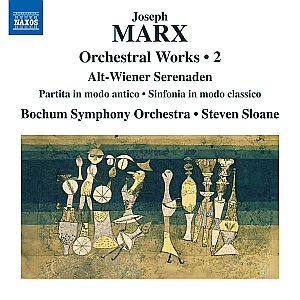 |
Naxos 8.573832 [approx. 77 min.]: Orchestral Works Vol. 2 - Naxos RE-RELEASE: Alt-Wiener Serenaden (Old Vienna Serenades); Partita in modo antico; Sinfonia in modo classico |
 Amazon US
Amazon US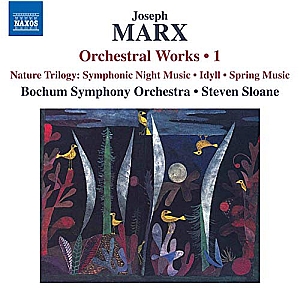 |
Naxos 8.573831 [ca. 64'19]: Orchesterwerke Vol. 1 - Naxos RE-RELEASE: Eine Symphonische Nachtmusik (Symphonic Night Music); Idylle; Eine Frühlingsmusik (Spring Music) |
 Amazon US
Amazon US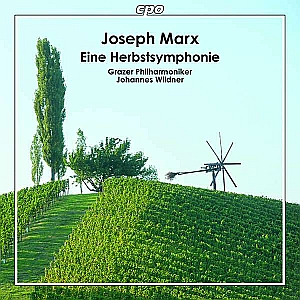 |
cpo 555 262-2 [ca. 67'00]: Autumn Symphony for large orchestra by Joseph Marx |
 jpc Germany
jpc Germany Amazon Germany
Amazon Germany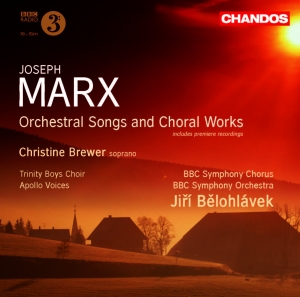 |
CHAN 10505 [approx. 72'00]: The complete choral-orchestral works and the complete orchestral songs for high voice by Joseph Marx. |
| Reviews will be available as of January 2009! |
 Amazon UK
Amazon UK Amazon USA
Amazon USA Crotchet International
Crotchet International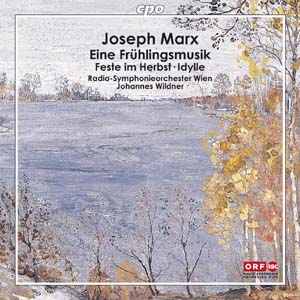 |
cpo 77732022 [63'06]: Three Symphonic Poems by Joseph Marx:
"Feste im Herbst" (World Premiere Recording; this symphonic poem is based on the final movement of the HERBSTSYMPHONIE!), "Eine Frühlingsmusik" and "Idylle".
Vienna Radio Symphony Orchestra conducted by Johannes Wildner.
Recorded in March 2007, released in September 2008. |
| Reviews will be available soon! |
 jpc Germany
jpc Germany Amazon UK
Amazon UK Amazon USA
Amazon USA Crotchet International
Crotchet International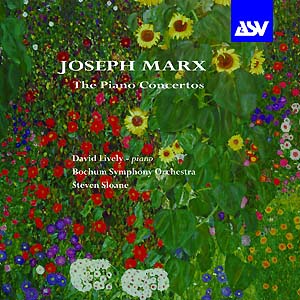 |
ASV CD DCA 1174 [72'46]: Complete Orchestral Music Vol. 4, "The Piano Concertos":
"Romantisches Klavierkonzert" (Romantic Piano Concerto) and "Castelli Romani" for piano and orchestra.
Performed by David Lively (piano) and the Bochum Symphony Orchestra conducted by Steven Sloane.
Recorded in January 2004 (Producer: Miguel Kertsman). |
| Review by Michel Fleury (Classica - Repertoire, Sept. 2005) - written in French. The German translation of this review is available here | |
| Review by Rob Barnett (MusicWeb, June 2005) | |
| Review by Jonathan Woolf (MusicWeb, July 2005) | |
| Review by Jed Distler (Classics Today) | |
| Review by Abeille Musique Classique (French) | |
| Review in Cherwell, No. 21 (Charles Markland, May 20, 2005) (Note: The critic Charles Markland mistakenly claims that Marx "found fame writing film scores", which is incorrect; Marx never wrote film music.) | |
| Review in Columns - Sound and Music (June 2005) (Italian) | |
| Review by Scott Morrison at amazon.com (July 8, 2005) | |
| Review by Michael J. A. Brough on amazon.co.uk (June 8, 2005) | |
| Review by Gerald Fenech on Classical Net Review | |
| More reviews will be available soon! |
 Amazon USA
Amazon USA Amazon UK
Amazon UK Amazon Germany
Amazon Germany Crotchet International
Crotchet International Tower Records USA
Tower Records USA jpc Germany
jpc Germany Sanctuary Direct
Sanctuary Direct Email to Sanctuary Direct
Email to Sanctuary Direct ASV's Homepage.
ASV's Homepage.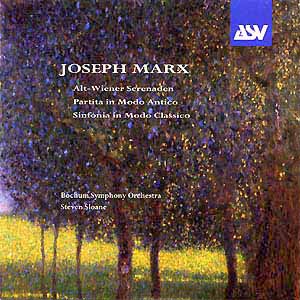 |
ASV CD DCA 1158 [76'45]: Complete Orchestral Music Vol. 3:
"Alt-Wiener Serenaden" ("Old Vienna Serenades") for large orchestra and the two string orchestra works "Partita in modo antico"
and "Sinfonia in modo classico" performed by the Bochum Symphony Orchestra conducted by Steven Sloane.
Recorded in April 2003 (Producer: Miguel Kertsman). The works for string orchestra are Marx's own arrangements
of his exquisite string quartets "in modo antico" and "in modo classico". |
| Review by Michel Fleury (Classica - Repertoire, Sept. 2005) - written in French. The German translation of this review is available here | |
| Review by Bob McQuiston (Tower Records) | |
| Review in the German magazine Fono Forum, June 2005 Issue (Jörg Hillebrand) | |
| Review in the Fanfare Magazine, 2005/28, No. 6 (July/August 2005) (Barry Brenesal) | |
| Review in Gramophone 2/2005 (John Warrack) | |
| Review by Scott Morrison at amazon.com (March 16, 2005) | |
| Review on Audiophile Audition, April 2005 | |
| Review by MusicWeb UK (Rob Barnett, Nov. 2004) | |
| Review by MusicWeb UK (Jonathan Woolf, Dec. 2004) | |
| Review by Abeille Musique Classique (French) | |
| Review on Soundandmusic.com (Italian) | |
| More reviews will be available soon! |
 Amazon USA
Amazon USA Amazon UK
Amazon UK Amazon Germany
Amazon Germany Crotchet International
Crotchet International Tower Records USA
Tower Records USA jpc Germany
jpc Germany Sanctuary Direct
Sanctuary Direct Email to Sanctuary Direct
Email to Sanctuary Direct ASV's Homepage.
ASV's Homepage.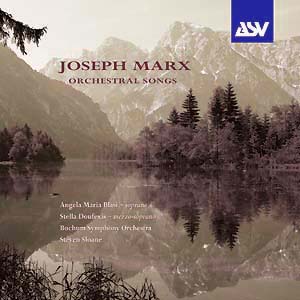 |
ASV CD DCA 1164 [56'35]: Complete Orchestral Music Vol. 2: "The Orchestral Songs".
Angela Maria Blasi (soprano) and Stella Doufexis (mezzo-soprano) with the Bochum Symphony Orchestra
conducted by Steven Sloane. Recorded in September 2003 (Producer: Miguel Kertsman). |
Marx "Orchestral Songs" CDnominated for the47th Annual GRAMMY AwardsCategory 103: "Best Classical Vocal Performance" |
| Review by Gerald Fenech on Classical Net Review | |
| Review by Schott International (Kathrin Feldmann) | |
| Review in the Fanfare Magazine, 2005/28, No. 3 (Jan/Feb) (Barry Brenesal) | |
| Review in the German magazine Fono Forum, January 2005 Issue (Christoph Vratz) | |
| Review by the American Record Guide, Jan/Feb 2005 | |
| Awarded "Recording of the Month" by MusicWeb UK (Rob Barnett, Nov. 2004) | |
| BBC Music Magazine: Four Star review in the Oct. 2004 issue | |
| Review in Diapason France (December 2004 issue; French). Please click here to read the German translation of this review. | |
| Review on Soundandmusic.com (Italian) | |
| Review by Bob McQuiston (Tower Records) "...one of the most memorable Lieder discs released this year" | |
| Review by the Guardian (Andrew Clements, who is known to be not a fan of this sort of music) | |
| Review by Abeille Musique Classique (French) | |
| The CD is one of the top recommendations of the month at Records International (July 2004) | |
| Review on iclassics.com (July 2004) | |
| Review on classicalcdreview.com (August 2004) | |
| Review on klassik.com (Oct. 2004) | |
| Review by the classical music magazine RONDO (Oct. 2004) | |
| Review by The Yorkshire Post (July 2004) | |
| Review by International Record Review (Christopher Cook, Sep. 2004) | |
| Review by M. J. A. Brough at amazon.com (Dec. 10, 2004) | |
| Review by Scott Morrison at amazon.com (Oct. 14, 2004) | |
| More reviews coming soon! |
 Amazon USA
Amazon USA Amazon UK
Amazon UK Amazon Germany
Amazon Germany Crotchet International
Crotchet International Tower Records USA
Tower Records USA jpc Germany
jpc Germany Sanctuary Direct
Sanctuary Direct Email to Sanctuary Direct
Email to Sanctuary Direct ASV's Homepage.
ASV's Homepage. |
ASV CD DCA 1137 [64'19]: Complete Orchestral Music Vol. 1: "Natur-Trilogie" (Nature Trilogy) for large orchestra ("Symphonic Night Music", "Idyll" and "Spring Music"). Performed by the Bochum Symphony Orchestra conducted by Steven Sloane. Recorded June 12-14, 2002 (Producer: Miguel Kertsman). The liner notes (booklet) were written by the author of this website in his mother language (German) and are available here. English and French translations are included. Information on the genesis of this CD can be found here |
| Review on Soundandmusic.com (Italian) | |
| Review on Cinemusic (Michael Boldhaus) | |
| BBC Music Magazine (Erik Levi): Five Star review in the July 2003 issue. "...a performance of stunning beauty and conviction supported by suitably opulent engineering." | |
| Review in Gramophone, June 2003, page 45 (John Warrack) | |
| Review in the Fanfare Magazine, Issue 2003/27, No.1 (Barry Brenesal) | |
| Review in the Neue Musikzeitung, Issue 7-8/2004 | |
| Review by Christoph Schlüren in "Prisma", a programme on the German classical music radio channel BR 4 (broadcasted on June 21, 2003. (Incidentally, the author of this website was also mentioned in this broadcast.) | |
| 5 Stars out of 6 in Diapason France (July/August 2003 issue; French). The "Golden tuning fork" (6 stars) is virtually impossible to reach for late-romantic music of the 20th century. Please click here to read the German translation of this review. | |
| Review in the German magazine Fono Forum, September 2003 Issue (Michael Kube) | |
| Awarded "Recording of the Month" by MusicWeb UK (Rob Barnett). According to the reviewer, this music is "unambiguously the work of a nature ecstatic. The music is discursively rhapsodic, sunny, bold, soused in melody and eloquent with the voices of nature. An impressionistic South German voice soaked in the quintessence of lyrical expression." | |
| Transcript of a review by Andrew McGregor on BBC Radio 3 ("CD Review") | |
| Top recommendation of the month at Records International (April 2003) | |
| Review by Scott Morrison at amazon.com (Sep. 18, 2003) | |
| Review by Don Satz at MusicWeb. This review reminds me of those typical hatemails. I can't see what Don Satz is talking about. Does he and and all the other reviewers who are represented here, talk about the same CD? I can't tell you. Decide for yourself... | |
| Review by the Guardian (Andrew Clements, who is known to be not a fan of this sort of music) | |
| Review by Bob McQuiston (Tower Records) | |
|
Review by Rob Cowan on BBC Radio 3 ("CD Review").
Click here to listen to an MP3 (1 MB) of this 4 minute review
|
|
| Review by Calum MacDonald (International Record Review) | |
| "Sloane conducts Marx - A major rediscovery". Interview of icclassics.com with the conductor Steven Sloane | |
| Review by Classics Today (David Hurwitz) | |
| Review by Abeille Musique Classique (French) | |
| Review by Colin Scott-Sutherland (MusicWeb UK) |
 Amazon USA
Amazon USA Amazon UK
Amazon UK Amazon Germany
Amazon Germany Crotchet International
Crotchet International Tower Records USA
Tower Records USA jpc Germany
jpc Germany Sanctuary Direct
Sanctuary Direct Email to Sanctuary Direct
Email to Sanctuary Direct ASV's Homepage.
ASV's Homepage.Excerpt from ASV's website:
This superb disc of world-premiere recordings showcases the lush Viennese
orchestral music of Joseph Marx.
Hailed on his 70th birthday as "the most prestigious Austrian composer of this era",
Marx was a hugely popular composer during his lifetime, but has been unjustly neglected
since. Volume 1 in ASV's new series of Marx's Complete Orchestral Music demonstrates why
his music was so well-loved, and so deserving of attention now: the heady, picturesque
sound-world is truly intoxicating.
The Nature Trilogy was written during the inter-war years just as Schoenberg's 12-tone
technique was emerging, but Marx rejected serialism and pursued a more sensuous style,
reminiscent of Richard Strauss's tone-poems and the orchestral colours of Debussy. The
result met with great acclaim at the time and is still hugely appealing today.
The Symphonic Night Music opens in the garden of Eden where shimmering moonlight bathes the
scene in a mystical atmosphere. The bewitching Idyll pays homage to Debussy's "Prélude à
l'après-midi d'un faune", while the Spring Music evokes nature reawakening. The combination
of these three works forms a highly seductive collection, with passionate yet precise
performances from the Bochum Symphony Orchestra under Steven Sloane.
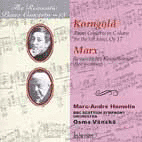 HYPERION CDA66990 [64'39]: The "Romantisches Klavierkonzert"
(Romantic Piano Concerto) in E major [36'39], coupled with the
Piano Concerto in C sharp for the left hand (1922, 27'35) by Erich Wolfgang Korngold (1897-1957), performed
by Marc-André
Hamelin (piano) and the BBC Scottish SO conducted by Osmo
Vänskä, recorded 19/20 June 1997.
HYPERION CDA66990 [64'39]: The "Romantisches Klavierkonzert"
(Romantic Piano Concerto) in E major [36'39], coupled with the
Piano Concerto in C sharp for the left hand (1922, 27'35) by Erich Wolfgang Korngold (1897-1957), performed
by Marc-André
Hamelin (piano) and the BBC Scottish SO conducted by Osmo
Vänskä, recorded 19/20 June 1997.  Amazon USA
Amazon USA Amazon UK
Amazon UK Amazon Germany
Amazon Germany Tower Records USA
Tower Records USA jpc Germany
jpc Germany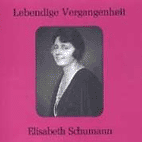 Preiser 89031 [74'18]: 1 orchestral song ("Marienlied"), coupled with songs
and arias by Mozart, J. S. Bach, Händel, Strauss, Flies, Mahler and Schumann.
The "Marienlied" is performed by Elisabeth Schumann (soprano) with Vienna State
Opera Orchestra conducted by Karl Alwin. Recorded in 1928.
Preiser 89031 [74'18]: 1 orchestral song ("Marienlied"), coupled with songs
and arias by Mozart, J. S. Bach, Händel, Strauss, Flies, Mahler and Schumann.
The "Marienlied" is performed by Elisabeth Schumann (soprano) with Vienna State
Opera Orchestra conducted by Karl Alwin. Recorded in 1928.  Amazon USA
Amazon USA Amazon UK
Amazon UK Amazon Germany
Amazon Germany Tower Records USA
Tower Records USA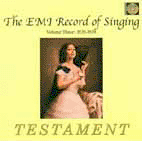 TESTAMENT SBT 0132 (10 CDs): The EMI Record of Singing Vol. 3 (1926-1939),
including 1 orchestral song ("Marienlied") by Marx,
coupled with songs and arias by a huge number of other composers.
The "Marienlied" is performed by Elisabeth Schumann (soprano) with
Vienna State Opera Orchestra conducted by Karl Alwin. Recorded in 1928. The recording of
Marx's orchestral song is the same as on the disc above.
TESTAMENT SBT 0132 (10 CDs): The EMI Record of Singing Vol. 3 (1926-1939),
including 1 orchestral song ("Marienlied") by Marx,
coupled with songs and arias by a huge number of other composers.
The "Marienlied" is performed by Elisabeth Schumann (soprano) with
Vienna State Opera Orchestra conducted by Karl Alwin. Recorded in 1928. The recording of
Marx's orchestral song is the same as on the disc above. Amazon USA
Amazon USA Amazon UK
Amazon UK Amazon Germany
Amazon Germany JPC Germany
JPC Germany Tower Records USA
Tower Records USA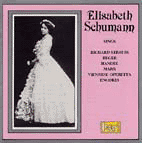 GEMM CD 9379: Elisabeth Schumann sings Richard Strauss, Reger,
Händel and Marx, including 1 orchestral song ("Marienlied") by Marx.
The recording of Marx's orchestral song is the same as on the two discs above.
GEMM CD 9379: Elisabeth Schumann sings Richard Strauss, Reger,
Händel and Marx, including 1 orchestral song ("Marienlied") by Marx.
The recording of Marx's orchestral song is the same as on the two discs above. Amazon USA
Amazon USA Amazon UK
Amazon UK Elisabeth Schumann Website
Elisabeth Schumann Website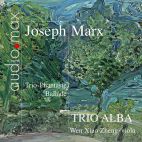 Dabringhaus und Grimm (Audiomax) 703 1844-2 [62'46]: "Trio-Phantasie and Ballad for Piano Quartet".
Performed by Trio Alba: Livia Sellin (violin), Philipp Comploi (cello) and Chengcheng Zao (piano) with the assistance of Wen Xiao Zheng (viola) as guest musician.
Recorded in December 2013.
Dabringhaus und Grimm (Audiomax) 703 1844-2 [62'46]: "Trio-Phantasie and Ballad for Piano Quartet".
Performed by Trio Alba: Livia Sellin (violin), Philipp Comploi (cello) and Chengcheng Zao (piano) with the assistance of Wen Xiao Zheng (viola) as guest musician.
Recorded in December 2013. jpc Deutschland
jpc Deutschland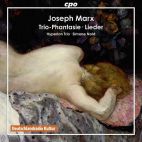 cpo 777 857-2 [62'06]: "Trio-Phantasie and Wildgans Songs".
Performed by Hyperion Trio and Guests: Hagen Schwarzrock (piano), Oliver Kipp (violin), Katharina Troe (cello), with Simone Nold (soprano), Christoph Renz (flute) and Felix Schwartz (viola).
Recorded in February 2013.
cpo 777 857-2 [62'06]: "Trio-Phantasie and Wildgans Songs".
Performed by Hyperion Trio and Guests: Hagen Schwarzrock (piano), Oliver Kipp (violin), Katharina Troe (cello), with Simone Nold (soprano), Christoph Renz (flute) and Felix Schwartz (viola).
Recorded in February 2013. jpc Germany
jpc Germany Amazon USA
Amazon USA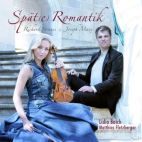 Preiser Records PR91255 [53'27]: "Spät(e) Romantik (Late Romantic Music): Frühlingssonate (Spring Sonata) by Joseph Marx and Violin Sonata by Richard Strauss".
Performed by Lidia Baich (violin) and Matthias Fletzberger (piano). Recorded in Vienna, March 2014.
Preiser Records PR91255 [53'27]: "Spät(e) Romantik (Late Romantic Music): Frühlingssonate (Spring Sonata) by Joseph Marx and Violin Sonata by Richard Strauss".
Performed by Lidia Baich (violin) and Matthias Fletzberger (piano). Recorded in Vienna, March 2014. Amazon Germany
Amazon Germany jpc Germany
jpc Germany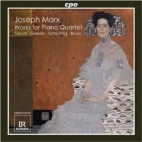 cpo 777 279-2 [62'26]: "Works for Piano Quartet" (Rhapsody, Scherzo and Ballad).
Performed by Oliver Triendl (piano), Daniel Gaede (violin), Hariolf Schlichtig (viola) and Peter Bruns (cello).
Recorded in June 2009.
cpo 777 279-2 [62'26]: "Works for Piano Quartet" (Rhapsody, Scherzo and Ballad).
Performed by Oliver Triendl (piano), Daniel Gaede (violin), Hariolf Schlichtig (viola) and Peter Bruns (cello).
Recorded in June 2009. Amazon USA
Amazon USA jpc Germany
jpc Germany Urlicht UAV-5996: "Klavierquartett in Form einer Rhapsodie" (Joseph Marx) and "Suite for 2 Violins, Cello and Piano left hand" (Erich Wolfgang Korngold).
Performed by the New York Piano Quartet: Elmira Darvarova (violin), Ronald Carbone (viola/2. violin, Samuel Magill (cello) and Linda Hall (piano).
Recorded in March 2012.
Urlicht UAV-5996: "Klavierquartett in Form einer Rhapsodie" (Joseph Marx) and "Suite for 2 Violins, Cello and Piano left hand" (Erich Wolfgang Korngold).
Performed by the New York Piano Quartet: Elmira Darvarova (violin), Ronald Carbone (viola/2. violin, Samuel Magill (cello) and Linda Hall (piano).
Recorded in March 2012. Urlicht Label
Urlicht Label cd Universe
cd Universe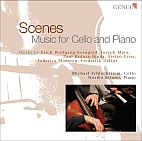 Genuin GEN 89529 [69'21]: "Scenes — Music for Cello and Piano", presenting
Marx's "Pastorale" for cello & piano in its second recording at all, the only recording currently
available on the market, coupled with works by Erich Wolfgang Korngold, Paul Badura-Skoda,
Stefan Esser, Federico Mompou and Frederick Delius. Performed by Michael Schlechtriem (cello)
and Noriko Kitano (piano). Most of the music was recorded in January 2009.
Genuin GEN 89529 [69'21]: "Scenes — Music for Cello and Piano", presenting
Marx's "Pastorale" for cello & piano in its second recording at all, the only recording currently
available on the market, coupled with works by Erich Wolfgang Korngold, Paul Badura-Skoda,
Stefan Esser, Federico Mompou and Frederick Delius. Performed by Michael Schlechtriem (cello)
and Noriko Kitano (piano). Most of the music was recorded in January 2009. jpc Germany
jpc Germany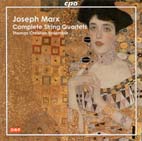 cpo 777 066-2 [75'06]: New recording of the three String Quartets:
„Quartetto in modo antico", „Quartetto in modo classico" and
„Quartetto chromatico". Thomas Christian Ensemble, Vienna.
Recorded in December 2005. The booklet notes were written by the author of this website.
cpo 777 066-2 [75'06]: New recording of the three String Quartets:
„Quartetto in modo antico", „Quartetto in modo classico" and
„Quartetto chromatico". Thomas Christian Ensemble, Vienna.
Recorded in December 2005. The booklet notes were written by the author of this website. jpc Germany
jpc Germany
 Amazon USA
Amazon USA
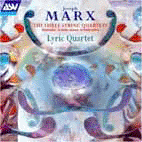 ASV CD DCA 1073 [79'22]: The Three String Quartets
"Quartetto Chromatico" (1936-37 rev. 1948), "Quartetto in
Modo Classico" (1940-41) and "Quartetto in Modo Antico"
(1937-38), perfomed by the Lyric Quartet, recorded 4-6 May 1999.
ASV CD DCA 1073 [79'22]: The Three String Quartets
"Quartetto Chromatico" (1936-37 rev. 1948), "Quartetto in
Modo Classico" (1940-41) and "Quartetto in Modo Antico"
(1937-38), perfomed by the Lyric Quartet, recorded 4-6 May 1999.  Amazon USA
Amazon USA Amazon UK
Amazon UK Amazon Germany
Amazon Germany Tower Records USA
Tower Records USA jpc Germany
jpc Germany cpo 777 466-2 [50'47]: Angelika Kirchschlager (mezzo-soprano) and Anthony Spiri (piano): Selected Songs by Joseph Marx.
cpo 777 466-2 [50'47]: Angelika Kirchschlager (mezzo-soprano) and Anthony Spiri (piano): Selected Songs by Joseph Marx. jpc Germany
jpc Germany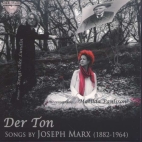 Sterling cda1675 [60'36]: Der Ton - Songs by Joseph Marx.
Sterling cda1675 [60'36]: Der Ton - Songs by Joseph Marx. jpc Germany
jpc Germany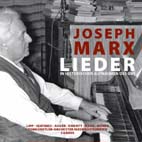 ORF-CD 3013 LC 114281 [70'40]: Joseph Marx: Songs and orchestral songs in historical recordings of the Austrian radio ORF, many of which accompanied by the composer.
With Joseph Marx, Wilma Lipp, Waldemar Kmentt, Irmgard Seefried, Arleen Augér, Tonkünstlerorchester Niederösterreich and the conductor Miltiades Caridis.
ORF-CD 3013 LC 114281 [70'40]: Joseph Marx: Songs and orchestral songs in historical recordings of the Austrian radio ORF, many of which accompanied by the composer.
With Joseph Marx, Wilma Lipp, Waldemar Kmentt, Irmgard Seefried, Arleen Augér, Tonkünstlerorchester Niederösterreich and the conductor Miltiades Caridis. 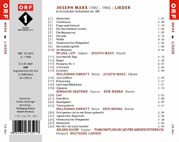 Click on the left image to view the track list!
Click on the left image to view the track list! jpc Germany
jpc Germany ORF Shop
ORF Shop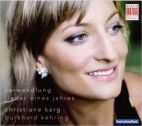 Berlin Classics: Christiane Karg — Verwandlung (Lieder eines Jahres") including the Marx song "Nocturne".
Presenting a number of songs by other composers.
Berlin Classics: Christiane Karg — Verwandlung (Lieder eines Jahres") including the Marx song "Nocturne".
Presenting a number of songs by other composers. jpc Germany
jpc Germany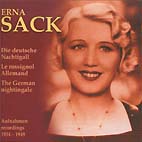 Relief CR 3004 [79'37]: Erna Sack — The German nightingale — Recordings 1934-1949.
Includes the "Marienlied" by Marx (Berlin Philharmonic conducted by Norbert Schultze, rec. 1936) and arias, songs and orchestral songs by
Rossini, Verdi, Donizetti, von Flotow, Puccini, Händel, Léhar, Reger, d'Albert, Grieg, Schumann, Schubert, Taubert und Brahms.
Relief CR 3004 [79'37]: Erna Sack — The German nightingale — Recordings 1934-1949.
Includes the "Marienlied" by Marx (Berlin Philharmonic conducted by Norbert Schultze, rec. 1936) and arias, songs and orchestral songs by
Rossini, Verdi, Donizetti, von Flotow, Puccini, Händel, Léhar, Reger, d'Albert, Grieg, Schumann, Schubert, Taubert und Brahms.
 jpc Germany
jpc Germany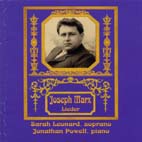 Altarus Records AIR-CD-9061 [68'16]: First complete recording of the Italian Song Book after Paul Heyse (17 songs), coupled with 12 other Marx songs.
Sarah Leonard, soprano; Jonathan Powell, piano. Recorded in 2005.
Altarus Records AIR-CD-9061 [68'16]: First complete recording of the Italian Song Book after Paul Heyse (17 songs), coupled with 12 other Marx songs.
Sarah Leonard, soprano; Jonathan Powell, piano. Recorded in 2005.  Amazon Germany
Amazon Germany Amazon USA
Amazon USA Amazon UK
Amazon UK Crotchet International
Crotchet International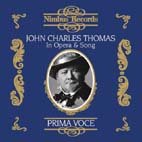 Nimbus Records [??'??]: John Charles Thomas in Opera & Song, including
two songs by Marx and songs and arias by many other composers. Marx songs recorded
on June 2nd, 1938 (Matrix: BS 030513-1).
Nimbus Records [??'??]: John Charles Thomas in Opera & Song, including
two songs by Marx and songs and arias by many other composers. Marx songs recorded
on June 2nd, 1938 (Matrix: BS 030513-1).  Amazon Germany
Amazon Germany Amazon USA
Amazon USA Amazon UK
Amazon UK jpc Germany
jpc Germany Preiser 90701 [48'00]: "Songs of the Jugendstil era". Three out of four
Marx songs after poems by Anton Wildgans, one with violin, the second one with viola and the third one with cello.
Coupled with songs by Schreker, Mahler and R. Strauss. Performers: Brigitte Prammer (soprana),
Manfred Schiebel (piano), Bernhard Biberauer (violin), Gerhard Marschner (viola), Raphael Flieder (cello)
and Hermann Ebner (horn). Recorded in September 2005.
Preiser 90701 [48'00]: "Songs of the Jugendstil era". Three out of four
Marx songs after poems by Anton Wildgans, one with violin, the second one with viola and the third one with cello.
Coupled with songs by Schreker, Mahler and R. Strauss. Performers: Brigitte Prammer (soprana),
Manfred Schiebel (piano), Bernhard Biberauer (violin), Gerhard Marschner (viola), Raphael Flieder (cello)
and Hermann Ebner (horn). Recorded in September 2005.  Amazon Germany
Amazon Germany Amazon USA
Amazon USA Amazon UK
Amazon UK jpc Germany
jpc Germany Crotchet International
Crotchet International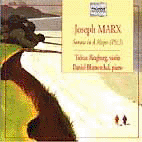 PAVANE RECORDS ADW 7378 [58'36]: Sonata in A major (Sonata No. 1) for
violin & piano (1913), performed by Tobias Ringborg
(violin) and Daniel Blumenthal (piano), recorded 19-20 Nov 1996.
PAVANE RECORDS ADW 7378 [58'36]: Sonata in A major (Sonata No. 1) for
violin & piano (1913), performed by Tobias Ringborg
(violin) and Daniel Blumenthal (piano), recorded 19-20 Nov 1996.  Amazon USA
Amazon USA Amazon UK
Amazon UK Amazon Germany
Amazon Germany Tower Records USA
Tower Records USA jpc Germany
jpc Germany PODIUM POL-1005-2 [61'16]: Sonata No. 2 ("Frühlingssonate", "Spring Sonata")
for violin and piano in D major (1945) [ca. 19 min., recorded 2
April 1954], coupled with "Four Romantic Pieces" for violin and
piano by Antonin Dvorak, parts of the "Sonata No. 3 for solo violin
BWV 1005" by Johann Sebastian Bach, the "Adagio" movement from the
Violin Concerto No. 1 in D major op. 6 and the "Sonatine" in E
minor op. 3 No. 6 for violin and piano by Nicolo Paganini;
performed by the legendary Vasa Prihoda (violin), Otto A. Graef (piano) and the Bavarian Radio Symphony Orchestra conducted
by Werner Schmidt-Boelcke, recorded between 1952 and 1954. The information
about the name of the sonata
(correct: Frühlingssonate), year of origin (correct: 1945) and
the key (correct: D major) given in the CD cover sheet and in the
booklet are incorrect since the producers obviously thought that
Marx had only written one sonata in 1913 in A major.
PODIUM POL-1005-2 [61'16]: Sonata No. 2 ("Frühlingssonate", "Spring Sonata")
for violin and piano in D major (1945) [ca. 19 min., recorded 2
April 1954], coupled with "Four Romantic Pieces" for violin and
piano by Antonin Dvorak, parts of the "Sonata No. 3 for solo violin
BWV 1005" by Johann Sebastian Bach, the "Adagio" movement from the
Violin Concerto No. 1 in D major op. 6 and the "Sonatine" in E
minor op. 3 No. 6 for violin and piano by Nicolo Paganini;
performed by the legendary Vasa Prihoda (violin), Otto A. Graef (piano) and the Bavarian Radio Symphony Orchestra conducted
by Werner Schmidt-Boelcke, recorded between 1952 and 1954. The information
about the name of the sonata
(correct: Frühlingssonate), year of origin (correct: 1945) and
the key (correct: D major) given in the CD cover sheet and in the
booklet are incorrect since the producers obviously thought that
Marx had only written one sonata in 1913 in A major.  Amazon Germany
Amazon Germany Podium Orders by
Podium Orders by  email to Podium
email to Podium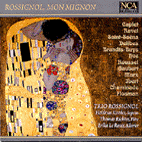 NEW CLASSICAL ADVENTURE NCA 60118-215 [76'24]: "Rossignol, mon Mignon" -
Love Songs of the Belle Epoque und the late romantic era for Soprano,
Flute and Piano, including Marx's "Pan trauert um Syrinx" (Pan mourns for Syrinx; 1916).
Coupled with works by André Caplet, Maurice Ravel, Camille Saint-Saens, Léo Delibes,
Jan Brandts-Buys, Georges Hüe, Albert Roussel, Philippe Gaubert, Jacques Ibert,
Cécile Chaminade and Oldrich Flosman. Performed by Trio Rossignol: Heidrun Kordes (soprano),
Thomas Richter (flute) and Erika La Roux (piano). Recorded 4-7 Sept. 2000.
NEW CLASSICAL ADVENTURE NCA 60118-215 [76'24]: "Rossignol, mon Mignon" -
Love Songs of the Belle Epoque und the late romantic era for Soprano,
Flute and Piano, including Marx's "Pan trauert um Syrinx" (Pan mourns for Syrinx; 1916).
Coupled with works by André Caplet, Maurice Ravel, Camille Saint-Saens, Léo Delibes,
Jan Brandts-Buys, Georges Hüe, Albert Roussel, Philippe Gaubert, Jacques Ibert,
Cécile Chaminade and Oldrich Flosman. Performed by Trio Rossignol: Heidrun Kordes (soprano),
Thomas Richter (flute) and Erika La Roux (piano). Recorded 4-7 Sept. 2000.  jpc Germany
jpc Germany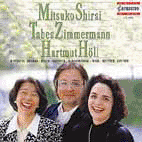 CAPPRICIO 10 462 [66'26]: "Durch Einsamkeiten" ("Through
lonely places" or "Through desert lands") for mezzo-soprano, viola
and piano, coupled with other songs for mezzo-soprano, viola
and piano by R. Strauss, Johannes Brahms, Adolf Busch, Charles Martin Loeffler,
Alexander Sergejewitsch Dargomyshski, Hermann Reutter and Charles Gounod. Performed by Mitsuko Shirai
(mezzo-soprano), Tabea Zimmermann (viola) and Hartmut Höll
(piano), recorded in 1993/94.
CAPPRICIO 10 462 [66'26]: "Durch Einsamkeiten" ("Through
lonely places" or "Through desert lands") for mezzo-soprano, viola
and piano, coupled with other songs for mezzo-soprano, viola
and piano by R. Strauss, Johannes Brahms, Adolf Busch, Charles Martin Loeffler,
Alexander Sergejewitsch Dargomyshski, Hermann Reutter and Charles Gounod. Performed by Mitsuko Shirai
(mezzo-soprano), Tabea Zimmermann (viola) and Hartmut Höll
(piano), recorded in 1993/94.  Amazon USA
Amazon USA Amazon UK
Amazon UK Amazon Germany
Amazon Germany Tower Records USA
Tower Records USA jpc Germany
jpc Germany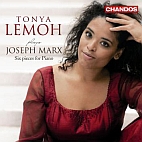 Chandos CHAN 10479 [54'38]: Tonya Lemoh plays Joseph Marx. Six pieces for piano (1916) and four unpublished piano pieces.
Chandos CHAN 10479 [54'38]: Tonya Lemoh plays Joseph Marx. Six pieces for piano (1916) and four unpublished piano pieces. Amazon USA
Amazon USA Amazon UK
Amazon UK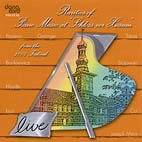 DANACORD DACOCD 649 [74'53]: Unpublished piano piece "Schmetterlingsgeschichten"
("Butterfly Stories") on the CD "Rarities of Piano Music at Schloss vor Husum, from
the 2004 Festival",
coupled with pieces by Haydn, Chopin, Sciarrino, Goosens, Poulenc, Grainger, Vivaldi,
Liszt, Cui, Stojowski, Bortkiewicz and Harrington Gibbs.
DANACORD DACOCD 649 [74'53]: Unpublished piano piece "Schmetterlingsgeschichten"
("Butterfly Stories") on the CD "Rarities of Piano Music at Schloss vor Husum, from
the 2004 Festival",
coupled with pieces by Haydn, Chopin, Sciarrino, Goosens, Poulenc, Grainger, Vivaldi,
Liszt, Cui, Stojowski, Bortkiewicz and Harrington Gibbs. jpc Germany
jpc Germany CD details on Danacord Website
CD details on Danacord Website FY SOLSTICE SOCD 104/5 [CD1: 72'34, CD2: 79'10]: CD1: 28
songs (works for voice and piano), performed by Marie-Paule Milone (mezzo-soprano), Denis Pascal (piano) and Françoise
Gnieri (alto); CD2: 6 piano pieces (written in 1916), Suite in F major for cello & piano and Pastorale for cello & piano,
performed by Marie-Paule Milone (cello) and Denis Pascal (piano),
recorded 15-18 Dec 1992 (CD1) and 8-10 Feb 1993 (CD2).
FY SOLSTICE SOCD 104/5 [CD1: 72'34, CD2: 79'10]: CD1: 28
songs (works for voice and piano), performed by Marie-Paule Milone (mezzo-soprano), Denis Pascal (piano) and Françoise
Gnieri (alto); CD2: 6 piano pieces (written in 1916), Suite in F major for cello & piano and Pastorale for cello & piano,
performed by Marie-Paule Milone (cello) and Denis Pascal (piano),
recorded 15-18 Dec 1992 (CD1) and 8-10 Feb 1993 (CD2).  Amazon USA
Amazon USA Amazon UK
Amazon UK Amazon Germany
Amazon Germany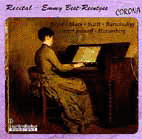 CORONA (FERMATE) FER 30005 [65'14]: "Recital - Emmy Best-Reintges plays works for
solo piano, including Marx's "Albumblatt in E Major (1916).
Coupled with solo piano works by Max Reger, Cyril Scott, Wassyl Barwinskyj,
Alexander Grechaninov and Kurt Hessenberg. Recorded 1961-67.
CORONA (FERMATE) FER 30005 [65'14]: "Recital - Emmy Best-Reintges plays works for
solo piano, including Marx's "Albumblatt in E Major (1916).
Coupled with solo piano works by Max Reger, Cyril Scott, Wassyl Barwinskyj,
Alexander Grechaninov and Kurt Hessenberg. Recorded 1961-67.  Amazon UK
Amazon UK Amazon Germany
Amazon Germany jpc Germany
jpc Germany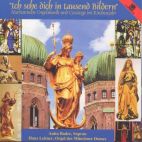 Motette MOT 50911 [61'32]: "Marian Music for Soprano and Organ, with Marienlied for soprano and organ by Joseph Marx (premiere recording).
Coupled with organ songs by Franz Lehrndorfer, Max Reger, Joseph Schmid, Joseph Meßner, Karl Höller, Armin Knab, Ludwig Boslet, Hans Leitner and Vinzenz Goller.
Performed by Anita Bader (soprano) and Hans Leitner (organ). Recorded ???.
Motette MOT 50911 [61'32]: "Marian Music for Soprano and Organ, with Marienlied for soprano and organ by Joseph Marx (premiere recording).
Coupled with organ songs by Franz Lehrndorfer, Max Reger, Joseph Schmid, Joseph Meßner, Karl Höller, Armin Knab, Ludwig Boslet, Hans Leitner and Vinzenz Goller.
Performed by Anita Bader (soprano) and Hans Leitner (organ). Recorded ???. Amazon Germany
Amazon Germany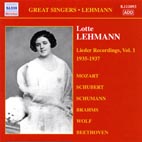 NAXOS 8.111093 [78'51]: "Lotte Lehmann: Lieder Recordings Vol. 1 (1935-37),
including one song by Joseph Marx and songs by Mozart, Schubert, Schumann,
Brahms, Wolf, Balogh, Grechaninov, Worth, Sodero, Cimara, Beethoven, Hahn, Gounod,
Pfitzner, Franz and Jensen. Recorded in the years 1935-37. Performed by Lotte Lehmann, soprano, and
Erno Balogh, piano.
NAXOS 8.111093 [78'51]: "Lotte Lehmann: Lieder Recordings Vol. 1 (1935-37),
including one song by Joseph Marx and songs by Mozart, Schubert, Schumann,
Brahms, Wolf, Balogh, Grechaninov, Worth, Sodero, Cimara, Beethoven, Hahn, Gounod,
Pfitzner, Franz and Jensen. Recorded in the years 1935-37. Performed by Lotte Lehmann, soprano, and
Erno Balogh, piano. Amazon UK
Amazon UK Amazon Germany
Amazon Germany jpc Germany
jpc Germany Mitra CD [60'42]: 13 songs by Joseph Marx and 11 songs by Wilhelm Kienzl.
Performed by Kazumi Kohno (soprano) and Jürgen Glauss (piano). Recorded on July 29/30, 2004.
Mitra CD [60'42]: 13 songs by Joseph Marx and 11 songs by Wilhelm Kienzl.
Performed by Kazumi Kohno (soprano) and Jürgen Glauss (piano). Recorded on July 29/30, 2004.
 Email to Mr. Eco Rau
Email to Mr. Eco Rau
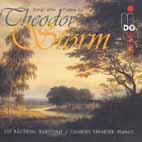 MDG MDG60312342 [??'??]: Songs after poems by Theodor Storm, 1 song by Marx,
coupled with songs of Berg, Blome, Brahms, Carrière, Détlefsen, Eggers, Eyken,
Hermann, Jenner, Mandl, Marx, Mottl, Reger, Reutter, Schoeck, Schreker, G. Stolz
and Trunk. Performed by Ulf Bästlein (baritone) and Charles Spencer (piano). Recorded ???.
MDG MDG60312342 [??'??]: Songs after poems by Theodor Storm, 1 song by Marx,
coupled with songs of Berg, Blome, Brahms, Carrière, Détlefsen, Eggers, Eyken,
Hermann, Jenner, Mandl, Marx, Mottl, Reger, Reutter, Schoeck, Schreker, G. Stolz
and Trunk. Performed by Ulf Bästlein (baritone) and Charles Spencer (piano). Recorded ???.
 Amazon USA
Amazon USA Amazon UK
Amazon UK Amazon Germany
Amazon Germany Crotchet International
Crotchet International Presto Classical UK
Presto Classical UK jpc Germany
jpc Germany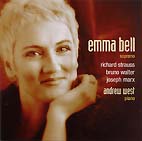 LINN RECORDS CKD 238 [58'33]: 4 songs, coupled with songs of Bruno Walter and
Richard Strauss. Performed by Emma Bell (soprano) and Andrew West (piano). Recorded April 5-7, 2004.
This CD is a SACD ("Super Audio CD") but can be played on any standard CD player.
LINN RECORDS CKD 238 [58'33]: 4 songs, coupled with songs of Bruno Walter and
Richard Strauss. Performed by Emma Bell (soprano) and Andrew West (piano). Recorded April 5-7, 2004.
This CD is a SACD ("Super Audio CD") but can be played on any standard CD player.
 Amazon UK
Amazon UK Crotchet International
Crotchet International Amazon Germany
Amazon Germany jpc Germany
jpc Germany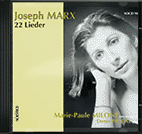 FY SOLSTICE SOCD 904 [58'57]: 22 songs, performed by Marie-Paule Milone (mezzo-soprano) and Denis Pascal (piano). This CD is a shortened re-release
of CD1 of the difficult-to-obtain "FY SOLSTICE SOCD 104/5" double CD set (see above).
FY SOLSTICE SOCD 904 [58'57]: 22 songs, performed by Marie-Paule Milone (mezzo-soprano) and Denis Pascal (piano). This CD is a shortened re-release
of CD1 of the difficult-to-obtain "FY SOLSTICE SOCD 104/5" double CD set (see above).
 FY Solstice
FY Solstice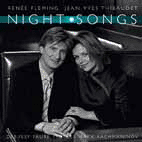 DECCA 467 697-2 [72'59]: "Night Songs". 4 songs by Joseph Marx,
coupled with songs by Fauré, Debussy, Richard Strauss and Rachmaninov.
Renée Fleming (soprano) and Jean-Yves Thibaudet (piano). Recorded in New York in November
2000/January 2001.
DECCA 467 697-2 [72'59]: "Night Songs". 4 songs by Joseph Marx,
coupled with songs by Fauré, Debussy, Richard Strauss and Rachmaninov.
Renée Fleming (soprano) and Jean-Yves Thibaudet (piano). Recorded in New York in November
2000/January 2001.  Amazon USA
Amazon USA Amazon UK
Amazon UK Amazon Germany
Amazon Germany Tower Records USA
Tower Records USA jpc Germany
jpc Germany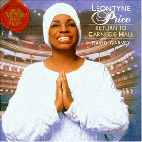 BMG RCA 09026 68425 2 [78'03]: Leontyne Price - Return to Carnegie Hall,
2 songs, coupled with songs by Georg Friedrich Händel, Wolfgang Amadeus Mozart,
Richard Strauss, Giuseppe Verdi, Francis Poulenc, Hector Berlioz, Henri Duparc,
Reynaldo Hahn, Lee Hoiby, Giacomo Puccini, George Gershwin, Francesco Cilea and
Samuel Augustus Ward. Performed by Leontyne Price (soprano) and David Garvey (piano), recorded
January 26, 1991 (live) at Carnegie Hall, New York City.
BMG RCA 09026 68425 2 [78'03]: Leontyne Price - Return to Carnegie Hall,
2 songs, coupled with songs by Georg Friedrich Händel, Wolfgang Amadeus Mozart,
Richard Strauss, Giuseppe Verdi, Francis Poulenc, Hector Berlioz, Henri Duparc,
Reynaldo Hahn, Lee Hoiby, Giacomo Puccini, George Gershwin, Francesco Cilea and
Samuel Augustus Ward. Performed by Leontyne Price (soprano) and David Garvey (piano), recorded
January 26, 1991 (live) at Carnegie Hall, New York City.  Amazon USA
Amazon USA Amazon UK
Amazon UK Amazon Germany
Amazon Germany jpc Germany
jpc Germany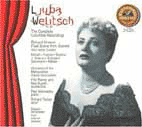 Sony Classical CD 62866, 2 CD set: Masterworks Heritage - Ljuba Welitsch
(The Complete Columbia Recordings), including 2 songs by Marx, coupled
with songs and arias by numerous other composers.
Performed by Ljuba Welitsch (soprano) and Paul Ulanowsky (piano).
Sony Classical CD 62866, 2 CD set: Masterworks Heritage - Ljuba Welitsch
(The Complete Columbia Recordings), including 2 songs by Marx, coupled
with songs and arias by numerous other composers.
Performed by Ljuba Welitsch (soprano) and Paul Ulanowsky (piano).  Amazon USA
Amazon USA Amazon UK
Amazon UK Amazon Germany
Amazon Germany Tower Records USA
Tower Records USA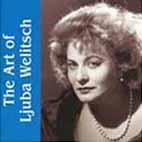 Preiser 90476, 2 CD set [??'??]: The Art of Ljuba Welitsch", including 2 songs by
Marx, coupled with songs and arias by numerous other composers.
The Marx songs are performed by Ljuba Welitsch (soprano) and Paul Ulanowsky (piano). Recorded 1947-1950.
Preiser 90476, 2 CD set [??'??]: The Art of Ljuba Welitsch", including 2 songs by
Marx, coupled with songs and arias by numerous other composers.
The Marx songs are performed by Ljuba Welitsch (soprano) and Paul Ulanowsky (piano). Recorded 1947-1950.  Amazon USA
Amazon USA Amazon UK
Amazon UK Amazon Germany
Amazon Germany Tower Records USA
Tower Records USA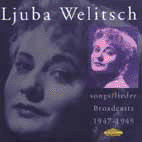 BellaVoce BLV 107.013 [75'07]: 6 songs performed by Joseph Marx himself,
coupled with songs by Brahms, Schubert and Schumann, performed by Ljuba Welitsch (soprano)
and Joseph Marx (piano), recorded for the Austrian Radio in 1947/48.
BellaVoce BLV 107.013 [75'07]: 6 songs performed by Joseph Marx himself,
coupled with songs by Brahms, Schubert and Schumann, performed by Ljuba Welitsch (soprano)
and Joseph Marx (piano), recorded for the Austrian Radio in 1947/48.  Amazon USA
Amazon USA Amazon UK
Amazon UK Amazon Germany
Amazon Germany Tower Records USA
Tower Records USA jpc Germany
jpc Germany CBC Musica Viva, MVCD 1162 [??'??]: 1 song, coupled with songs by
Anton Webern, Franz Grothe, Mischa Spoliansky, Theo Mackeben, Frederick Hollander,
Robert Schumann, Alexander von Zemlinsky, Arnold Schoenberg and Kurt Weill.
Performed by Jean Stilwell (mezzo-soprano) and Robert Kortgaard (piano).
CBC Musica Viva, MVCD 1162 [??'??]: 1 song, coupled with songs by
Anton Webern, Franz Grothe, Mischa Spoliansky, Theo Mackeben, Frederick Hollander,
Robert Schumann, Alexander von Zemlinsky, Arnold Schoenberg and Kurt Weill.
Performed by Jean Stilwell (mezzo-soprano) and Robert Kortgaard (piano). Tower Records USA
Tower Records USA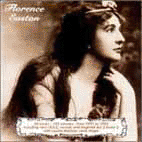 Claremont (Saf) 785072 [??'??]: 1 song, coupled with songs by
a huge number of other composers. The Marx song is performed by Florence Easton (soprano)
and Gerald Moore (piano).
Claremont (Saf) 785072 [??'??]: 1 song, coupled with songs by
a huge number of other composers. The Marx song is performed by Florence Easton (soprano)
and Gerald Moore (piano).  Amazon USA
Amazon USA Amazon UK
Amazon UK Amazon Germany
Amazon Germany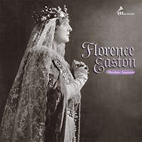 Marston Records MA 52033, 2-CD-Set: 1 song, coupled with songs by
a huge number of other composers. The Marx song is performed by Florence Easton (soprano)
and Gerald Moore (piano). Same recording as CD above. Recorded in 1933.
Marston Records MA 52033, 2-CD-Set: 1 song, coupled with songs by
a huge number of other composers. The Marx song is performed by Florence Easton (soprano)
and Gerald Moore (piano). Same recording as CD above. Recorded in 1933. Marston Records
Marston Records ETCETERA KTC 1044 [55'55]: 7 songs from the "Italian Song Book" and one additional song, coupled with songs by
Alexander von Zemlinsky and Franz Schreker, performed by Dorothy Dorow (soprano) and Massimiliano Damerini (piano), recorded live in
1980.
ETCETERA KTC 1044 [55'55]: 7 songs from the "Italian Song Book" and one additional song, coupled with songs by
Alexander von Zemlinsky and Franz Schreker, performed by Dorothy Dorow (soprano) and Massimiliano Damerini (piano), recorded live in
1980.  Amazon USA
Amazon USA Amazon UK or alternatively
Amazon UK
Amazon UK or alternatively
Amazon UK Amazon Germany or alternatively
Amazon Germany
Amazon Germany or alternatively
Amazon Germany jpc Germany
jpc Germany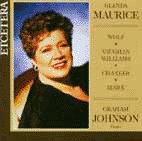 ETCETERA KTC 1099 [57'16]: 5 songs, coupled with
songs by Hugo Wolf, Theodore Chanler, Ralph Vaughan-Williams,
Roger Quilter and R. Strauss, performed by Glenda Maurice
(mezzo-soprano) and Graham Johnson (piano), recorded live on
January 11, 1988.
ETCETERA KTC 1099 [57'16]: 5 songs, coupled with
songs by Hugo Wolf, Theodore Chanler, Ralph Vaughan-Williams,
Roger Quilter and R. Strauss, performed by Glenda Maurice
(mezzo-soprano) and Graham Johnson (piano), recorded live on
January 11, 1988.  Amazon USA
Amazon USA Amazon UK
Amazon UK Amazon Germany
Amazon Germany jpc Germany
jpc Germany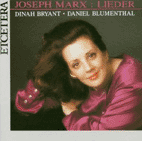 ETCETERA KTC1108 [63'43]: 20 songs (works for voice and
piano, 1906-11), performed by Dinah Bryant (soprano) and Daniel Blumenthal (piano), recorded in 1989.
ETCETERA KTC1108 [63'43]: 20 songs (works for voice and
piano, 1906-11), performed by Dinah Bryant (soprano) and Daniel Blumenthal (piano), recorded in 1989.  Amazon USA
Amazon USA Amazon UK or alternatively
Amazon UK
Amazon UK or alternatively
Amazon UK Amazon Germany
Amazon Germany jpc Germany
jpc Germany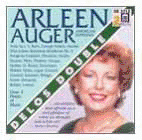 DELOS DE 3712, 2 CD set [??'??]: 1 song, coupled with songs by many other composers.
Performed by Arleen Auger (soprano) and Dalton Baldwin (piano).
DELOS DE 3712, 2 CD set [??'??]: 1 song, coupled with songs by many other composers.
Performed by Arleen Auger (soprano) and Dalton Baldwin (piano). Amazon USA
Amazon USA Amazon UK
Amazon UK Amazon Germany
Amazon Germany Towerrecords USA
Towerrecords USA DELOS DE 3029 [68'26]: 1 song, coupled with songs by Aaron Copland,
Fernando Obradors, Jayme Ovalle, Richard Strauss, Francis Poulenc, Pietro Cimara,
Roger Quilter, Oscar Strauss, Robert Schumann, Gustav Mahler, Joaquin Turina,
Edouard Lippe, Noel Coward, Charles Gounod, Franz Schubert, Frank Bridge, Stephen Foster,
Stefano Donaudy, Benjamin Britten and Frederick Loewe.
Performed by Arleen Auger (soprano) and Dalton Baldwin (piano), recorded in 1992.
DELOS DE 3029 [68'26]: 1 song, coupled with songs by Aaron Copland,
Fernando Obradors, Jayme Ovalle, Richard Strauss, Francis Poulenc, Pietro Cimara,
Roger Quilter, Oscar Strauss, Robert Schumann, Gustav Mahler, Joaquin Turina,
Edouard Lippe, Noel Coward, Charles Gounod, Franz Schubert, Frank Bridge, Stephen Foster,
Stefano Donaudy, Benjamin Britten and Frederick Loewe.
Performed by Arleen Auger (soprano) and Dalton Baldwin (piano), recorded in 1992. Amazon USA
Amazon USA Amazon UK
Amazon UK Amazon Germany
Amazon Germany Towerrecords USA
Towerrecords USA DELOS DE 3029 [68'26]: 1 song, coupled with songs by Aaron Copland,
Fernando Obradors, Jayme Ovalle, Richard Strauss, Francis Poulenc, Pietro Cimara,
Roger Quilter, Oscar Strauss, Robert Schumann, Gustav Mahler, Joaquin Turina,
Edouard Lippe, Noel Coward, Charles Gounod, Franz Schubert, Frank Bridge, Stephen Foster,
Stefano Donaudy, Benjamin Britten and Frederick Loewe.
Performed by Arleen Auger (soprano) and Dalton Baldwin (piano), recorded in 1992.
DELOS DE 3029 [68'26]: 1 song, coupled with songs by Aaron Copland,
Fernando Obradors, Jayme Ovalle, Richard Strauss, Francis Poulenc, Pietro Cimara,
Roger Quilter, Oscar Strauss, Robert Schumann, Gustav Mahler, Joaquin Turina,
Edouard Lippe, Noel Coward, Charles Gounod, Franz Schubert, Frank Bridge, Stephen Foster,
Stefano Donaudy, Benjamin Britten and Frederick Loewe.
Performed by Arleen Auger (soprano) and Dalton Baldwin (piano), recorded in 1992. Amazon USA
Amazon USA Amazon UK
Amazon UK Amazon Germany
Amazon Germany Towerrecords USA
Towerrecords USA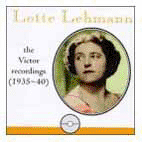 Romophone LehLo1a 81013, 2 CD set: "Lotte Lehmann - The Complete Victor Recordings
(1935-1940)", including 1 song by Marx, coupled with songs by numerous other composers.
Performed by Lotte Lehmann (soprano) and Ernö Balogh (piano).
Recorded in New York City on March 13, 1936.
Romophone LehLo1a 81013, 2 CD set: "Lotte Lehmann - The Complete Victor Recordings
(1935-1940)", including 1 song by Marx, coupled with songs by numerous other composers.
Performed by Lotte Lehmann (soprano) and Ernö Balogh (piano).
Recorded in New York City on March 13, 1936.  Amazon USA
Amazon USA Amazon UK
Amazon UK Amazon Germany
Amazon Germany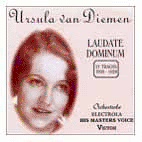 Claremont GSE CD 78-50-78: "Laudate Dominum - Ursula van Diemen",
including 1 song by Marx, coupled with songs by numerous other composers.
Performed by Ursula van Diemen (soprano) and Arpad Sandor (piano).
Recorded 1926-28.
Claremont GSE CD 78-50-78: "Laudate Dominum - Ursula van Diemen",
including 1 song by Marx, coupled with songs by numerous other composers.
Performed by Ursula van Diemen (soprano) and Arpad Sandor (piano).
Recorded 1926-28.  Only source where this CD is still available (CD No.: M77)
Only source where this CD is still available (CD No.: M77) Amazon USA
Amazon USA Amazon UK
Amazon UK Amazon Germany
Amazon Germany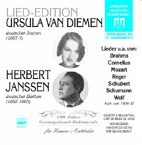 "Hamburger Archiv für Gesangskunst, including 1 song by Marx. The songs
performed by Ursula van Diemen (soprano) and Arpad Sandor (piano).
Same recording as CD above. Recorded in 1927.
"Hamburger Archiv für Gesangskunst, including 1 song by Marx. The songs
performed by Ursula van Diemen (soprano) and Arpad Sandor (piano).
Same recording as CD above. Recorded in 1927. Hamburger Archiv für Gesangskunst
Hamburger Archiv für Gesangskunst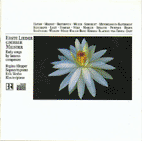 Koch Schwann CD 314002 H1 [??'??]: "Early songs by famous composers", including
1 song by Marx, coupled with songs by Arnold Schönberg, Ludwig van Beethoven, Alban Berg,
Boris Blacher, Johannes Brahms, Gottfried von Einem, Josef Matthias Hauer, Franz Joseph Haydn,
Ernst Krenek, Franz Liszt, Gustav Mahler, Felix Mendelssohn, Wolfgang Amadeus Mozart,
Carl Orff, Hans Pfitzner, Max Reger, Franz Schubert, Robert Schumann, Richard Strauss,
Carl Maria von Webern, Anton Webern and Hugo Wolf. Performed by Regina Klepper (soprano)
and the Marx student Erik Werba (piano). Recorded in April 1987.
Koch Schwann CD 314002 H1 [??'??]: "Early songs by famous composers", including
1 song by Marx, coupled with songs by Arnold Schönberg, Ludwig van Beethoven, Alban Berg,
Boris Blacher, Johannes Brahms, Gottfried von Einem, Josef Matthias Hauer, Franz Joseph Haydn,
Ernst Krenek, Franz Liszt, Gustav Mahler, Felix Mendelssohn, Wolfgang Amadeus Mozart,
Carl Orff, Hans Pfitzner, Max Reger, Franz Schubert, Robert Schumann, Richard Strauss,
Carl Maria von Webern, Anton Webern and Hugo Wolf. Performed by Regina Klepper (soprano)
and the Marx student Erik Werba (piano). Recorded in April 1987.  Amazon UK
Amazon UK Amazon Germany
Amazon Germany Preiser 90343 [56'03]: 2 songs, coupled with songs by Ernst Krenek,
Franz Schubert, Gerhard Wimberger, Johann Vesque von Püttlingen,
Johannes Brahms, Hugo Wolf and Ernst Ludwig Uray. Performed by Oskar Czerwenka (bass)
and the Marx student Erik Werba (piano). Recorded in April 1980.
Preiser 90343 [56'03]: 2 songs, coupled with songs by Ernst Krenek,
Franz Schubert, Gerhard Wimberger, Johann Vesque von Püttlingen,
Johannes Brahms, Hugo Wolf and Ernst Ludwig Uray. Performed by Oskar Czerwenka (bass)
and the Marx student Erik Werba (piano). Recorded in April 1980.  Amazon Germany
Amazon Germany jpc Germany
jpc Germany Preiser 89177 [74'18]: 2 songs, coupled with songs and arias by Verdi,
Bizet, Saint-Saens, Wagner, Händel, Weingartner, Strauss and Bergner.
The Marx songs are performed by Luise Willer (mezzo-soprano) and Carl Bergner (piano). Recorded in 1937.
Preiser 89177 [74'18]: 2 songs, coupled with songs and arias by Verdi,
Bizet, Saint-Saens, Wagner, Händel, Weingartner, Strauss and Bergner.
The Marx songs are performed by Luise Willer (mezzo-soprano) and Carl Bergner (piano). Recorded in 1937.  Amazon USA
Amazon USA Amazon UK
Amazon UK Amazon Germany
Amazon Germany jpc Germany
jpc Germany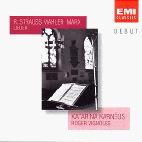 EMI CLASSICS 7243 5 73168 2 8 [64'55]: 5 songs,
coupled with songs by R. Strauss and Gustav Mahler, performed by
Katarina Karnéus (mezzo-soprano) and Roger Vignoles (piano),
recorded in July 1998.
EMI CLASSICS 7243 5 73168 2 8 [64'55]: 5 songs,
coupled with songs by R. Strauss and Gustav Mahler, performed by
Katarina Karnéus (mezzo-soprano) and Roger Vignoles (piano),
recorded in July 1998.  Amazon USA
Amazon USA Amazon UK
Amazon UK Amazon Germany
Amazon Germany Tower Records USA
Tower Records USA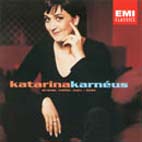 EMI CLASSICS ???????? [64'55]: 5 songs,
coupled with songs by R. Strauss and Gustav Mahler, performed by
Katarina Karnéus (mezzo-soprano) and Roger Vignoles (piano),
recorded in July 1998.
EMI CLASSICS ???????? [64'55]: 5 songs,
coupled with songs by R. Strauss and Gustav Mahler, performed by
Katarina Karnéus (mezzo-soprano) and Roger Vignoles (piano),
recorded in July 1998.  Amazon USA
Amazon USA Amazon UK
Amazon UK Amazon Germany
Amazon Germany Tower Records USA
Tower Records USA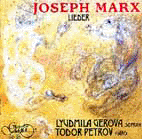 GEGA GD 125 [47'42]: 26 songs (works for voice and
piano); performed by Lyudmila Gerova (soprano) and Todor Petrov
(piano), recorded in December 1991. Podium might be able to obtain a few
copies of this CD from the manufacturer or the performers.
GEGA GD 125 [47'42]: 26 songs (works for voice and
piano); performed by Lyudmila Gerova (soprano) and Todor Petrov
(piano), recorded in December 1991. Podium might be able to obtain a few
copies of this CD from the manufacturer or the performers.  Email to Podium
Email to Podium Philips Classics 442 706-2, 4-CD-Set: "Lied-Edition - Von der Jahrhundertwende
bis zur Gegenwart (Vol. 4), Hermann Prey (baritone) sings songs by
Joseph Marx (on CD 3: "Der Dichter", "Nimm dir ein schönes Weib"),
Richard Strauss, Hans Pfitzner, Gustav Mahler, Johannes Brahms, Wilhelm Kienzl,
Felix Weingartner, Leo Blech, Paul Graener, Emil Mattiesen, Bruno Walter,
Max Reger, Franz Schreker, Joseph Haas, Richard Trunk, Armin Knab, Othmar Schoeck,
Erich Wolfgang Korngold, Arnold Schönberg, Anton von Webern, Alban Berg, Alexander von Zemlinsky,
Josef Matthias Hauer, Egon Wellesz, Hanns Eisler, Windfried Zillig, Hans Jelinek, Paul Hindemith,
Ernst Krenek, Viktor Ullmann, Mark Lothar, Boris Blacher, Wolfgang Fortner, Gottfried von Einem,
Peter Zwetkoff and Friedrich Gulda. The pianists are Friedrich Gulda, Karl Engel, Michael Krist
and Wolfgang Sawallisch (recorded 1976).
Philips Classics 442 706-2, 4-CD-Set: "Lied-Edition - Von der Jahrhundertwende
bis zur Gegenwart (Vol. 4), Hermann Prey (baritone) sings songs by
Joseph Marx (on CD 3: "Der Dichter", "Nimm dir ein schönes Weib"),
Richard Strauss, Hans Pfitzner, Gustav Mahler, Johannes Brahms, Wilhelm Kienzl,
Felix Weingartner, Leo Blech, Paul Graener, Emil Mattiesen, Bruno Walter,
Max Reger, Franz Schreker, Joseph Haas, Richard Trunk, Armin Knab, Othmar Schoeck,
Erich Wolfgang Korngold, Arnold Schönberg, Anton von Webern, Alban Berg, Alexander von Zemlinsky,
Josef Matthias Hauer, Egon Wellesz, Hanns Eisler, Windfried Zillig, Hans Jelinek, Paul Hindemith,
Ernst Krenek, Viktor Ullmann, Mark Lothar, Boris Blacher, Wolfgang Fortner, Gottfried von Einem,
Peter Zwetkoff and Friedrich Gulda. The pianists are Friedrich Gulda, Karl Engel, Michael Krist
and Wolfgang Sawallisch (recorded 1976). Homepage about Alexander von Zemlinsky
Homepage about Alexander von Zemlinsky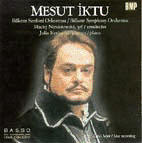 BMP Bilkent University Symphony Orchestra CD: "An einen Herbstwald",
performed by Mesut Iktu (baritone) and Julia Kerimova (piano), coupled
with vocal works by Rachmaninov, P. Tchaikovsky, Richard Wagner, Giuseppe Verdi,
Ahmed Adnan Saygun, Franz Schubert, Johannes Brahms, Gustav Mahler and
Michail Glinka (new recording).
BMP Bilkent University Symphony Orchestra CD: "An einen Herbstwald",
performed by Mesut Iktu (baritone) and Julia Kerimova (piano), coupled
with vocal works by Rachmaninov, P. Tchaikovsky, Richard Wagner, Giuseppe Verdi,
Ahmed Adnan Saygun, Franz Schubert, Johannes Brahms, Gustav Mahler and
Michail Glinka (new recording). Website of the Bilkent Symphony Orchestra, Ankara/Turkey
Website of the Bilkent Symphony Orchestra, Ankara/Turkey German version (opens a new browser window).
German version (opens a new browser window).
(Please also note that his name is frequently being spelled Josef Marx)
(No responsibility for the contents of the following websites. All links open a new browser window.)
If you want to search the web for more information on Joseph Marx, please also try the alternative spelling Josef Marx.
 Review of ASV's Vol. 1 Complete Orchestral Music: Marx's "Natur-Trilogie for
large orchestra" at Musicweb. This disc has received high praise from many international magazines and renowned critics.
Review of ASV's Vol. 1 Complete Orchestral Music: Marx's "Natur-Trilogie for
large orchestra" at Musicweb. This disc has received high praise from many international magazines and renowned critics. Review of Marx's Romantic Piano Concerto at
Musicweb
Review of Marx's Romantic Piano Concerto at
Musicweb Review of Marx's three string quartets at
Musicweb
Review of Marx's three string quartets at
Musicweb Review of 20 Marx songs at Musicweb
Review of 20 Marx songs at Musicweb Universal
Edition in Vienna
Universal
Edition in Vienna Doblinger Music
Publisher
Doblinger Music
Publisher Bochum Symphony Orchestra (Cond.: Steven Sloane)
Bochum Symphony Orchestra (Cond.: Steven Sloane) More information on Steven Sloane
More information on Steven Sloane Miguel Kertsman
Miguel Kertsman Austrian Mediateque
Austrian Mediateque Schott Musik
International
Schott Musik
International ORF (Austrian radio
station)
ORF (Austrian radio
station) Austrian National
Library
Austrian National
Library Complete list of persons who wrote letters to Marx
Complete list of persons who wrote letters to Marx Database of letters written by Musicians
Database of letters written by Musicians Vienna University of Music
and Performing Arts
Vienna University of Music
and Performing Arts Graz University of Music
and Performing Arts
Graz University of Music
and Performing Arts Musicweb
Musicweb Hyperion
Records
Hyperion
Records ASV Records
ASV Records Pavane Records
Pavane Records FY Solstice
Records
FY Solstice
Records Etcetera Records
[link coming soon]
Etcetera Records
[link coming soon] New Grove
Dictionary
New Grove
Dictionary The Artis Quartet,
Vienna
The Artis Quartet,
Vienna The Art of Fugue (Kunst der Fuge)
- Classical music in MIDI files and theory
The Art of Fugue (Kunst der Fuge)
- Classical music in MIDI files and theory Kai Czepiczka's site
about numerous forgotten composers (English version
available)
Kai Czepiczka's site
about numerous forgotten composers (English version
available) Huge website about Bulgarian composers
Huge website about Bulgarian composers Classical Net
Classical Net Searchmusicnetwork.com
Searchmusicnetwork.com ClassicsToday.com
ClassicsToday.com Onno van Rijen's huge page
on 20th century's Soviet Composers
Onno van Rijen's huge page
on 20th century's Soviet Composers Jim Moskowitz's
"Unknown Composers Page"
Jim Moskowitz's
"Unknown Composers Page" Robert E. Crawford's REC
Music Foundation
Robert E. Crawford's REC
Music Foundation xrefer - The Web's
reference engine
xrefer - The Web's
reference engine German Classical Net
(Klassiknetz)
German Classical Net
(Klassiknetz) Musikerforum - A
website for classical musicians
Musikerforum - A
website for classical musicians Podium - Music
Publisher of Marx's Spring Sonata for Violin and piano
Podium - Music
Publisher of Marx's Spring Sonata for Violin and piano Classical Music
UK
Classical Music
UK The very
huge classical composers database by Jos Smeets
The very
huge classical composers database by Jos Smeets A useful German
classical music database
A useful German
classical music database Classical is cool
- A fine website made by some true classical music lovers
Classical is cool
- A fine website made by some true classical music lovers Culture Kiosque -
The European Guide to Arts, Culture and Entertainment
Worldwide
Culture Kiosque -
The European Guide to Arts, Culture and Entertainment
Worldwide A huge
website providing a lot of information about british
composers
A huge
website providing a lot of information about british
composers The
Classical Music Navigator
The
Classical Music Navigator Classical Music Resources with a very good
database
Classical Music Resources with a very good
database Classical Composer Homepages - Another fine links
list
Classical Composer Homepages - Another fine links
list The
Classical Music Pages by young conductor Matt Boynick
The
Classical Music Pages by young conductor Matt Boynick Twentieth Century Music Links
Twentieth Century Music Links Gary Daum's composers homepage
Gary Daum's composers homepage A huge composers links list
A huge composers links list Classical Net providing another huge composers
database
Classical Net providing another huge composers
database Composer biographies by Michael Norrish
Composer biographies by Michael Norrish Another fine neglected composers homepage
Another fine neglected composers homepage Composers Net
Composers Net Classical Vocal
Repertoire
Classical Vocal
Repertoire Ray Hall's "Musical Websites of Great Interest"
Ray Hall's "Musical Websites of Great Interest" Vienna City Flats — Modern and comfortably equipped apartments in the heart of Vienna
Vienna City Flats — Modern and comfortably equipped apartments in the heart of ViennaDuring my research on life and work of Joseph Marx (Josef Marx) I have been supported by many experts and friends who always helped me with practical hints and useful information.
I wish to thank Robert "Rob" Barnett, John R. Carter, Martin Rucker, Dr. Peter Ackermann, Mrs. Rosemary Hilmar (Austrian National Library), Dr. Ilsa Nedetzky, Mrs. Lafite (Vienna), Prof. Dr. Wolfgang Bulla, Mr. Andreas Leitner (Universal Edition), Prof. Dr. Wolfgang Suppan, Mr. Ernst Lumpe, Mrs. Dr. Kaudel, Rudolf Pohl (Austrian Phonotheque), Eros Rizzoli, Prof. Joachim Dorfmüller, Prof. Th. Antonicek, Dr. Ed A. Wheeler, Dr. Elisabeth Schöggl-Ernst, Dr. Andreas Holzer, Mr. Stepanek (from Video and Audio Archive, State Museum of Graz), Mr. Brosche, Mr. Svojse and Mrs. Dorothea Hunger (Austrian National Library), Mrs. Strauß and Mrs. Vidic (Austrian Radio Station ORF), Urs Joseph Flury, Mr. Brian Pfaltzgraff and my skilled webmaster.
All others who are not mentioned here please forgive me and thank you so very much for your help!
(Completed on October 5, 2003. Updated and more photos included on January 26, 2004.)
In late July 2003, my friend Martin Rucker (to whom I will always be indebted for his help) and I made a trip together to Austria in order to visit all those places where Joseph Marx -who has been one of the main subjects of my life for three years- spent most of his life.
The trip turned out to be a great adventure, not only since we were to
This travelogue was made to share all these wonderful experiences with the reader of the page.
Enjoy!
 |
 |
 |
 |
|---|---|---|---|
 |
 |
 |
 |
|---|---|---|---|
 |
 |
 |
 |
|---|---|---|---|
 |
 |
 |
 |
|---|---|---|---|
 |
 |
 |
|---|---|---|
 |
 |
 |
 |
|---|---|---|---|
 |
 |
 |
 |
|---|---|---|---|
 |
 |
 |
 |
|---|---|---|---|
 |
 |
 |
 |
|---|---|---|---|
 |
 |
 |
 |
|---|---|---|---|
 |
 |
 |
 |
|---|---|---|---|

|
|---|
|
|
 |
 |
 |
 |
|---|---|---|---|
 |
 |
 |
|---|---|---|
an exhausting business, I guess... |
 |
 |
 |
 |
|---|---|---|---|
 |
 |
 |
|---|---|---|
More pictures of this grave can be found here |
 |
 |
|---|---|
to the outermost foothills of the Alps... |
...and this is how an unforgettable journey to Joseph Marx's native land came to an end!
I wish to thank all those who brightened up our days in Austria.
 Back to the Table of Contents (main page) Back to the Table of Contents (main page)
|
|---|
Please drop a line in my Guestbook!
This private, non-profit website is work in progress - updated and expanded frequently! © 2001-2006 Berkant Haydin Visits:
|
|
|
EIN NEUJAHRSHYMNUS & BERGHYMNE von Joseph Marx Orchestriert von St. Esser & B. Haydin * * * verlegt bei der Universal Edition * * * Hier weitere Infos und Hörbeispiele (MP3) |
|
Das Grazer Orchester recreation - Großes Orchester Graz spielte unter der Leitung von Michel Swierczewski die HERBSTSYMPHONIE (Stefaniensaal in Graz, Österreich) * * * Erste Aufführung seit fast 80 Jahren * * * Der Autor dieser Website hat diesem seltenen, bedeutenden Ereignis beigewohnt und berichtet hier ausführlich über die großartige Rezeption in der österreichischen Presse |
Die Joseph-Marx-Gesellschaft hat eine eigene Internetseite:joseph-marx-gesellschaft.org
Alle Anfragen an die Joseph-Marx-Gesellschaft (z.B. Spenden- und Beitrittsgesuche) sind an Herrn Berkant Haydin, Generalsekretär der Joseph-Marx-Gesellschaft, zu richten. Da die Gesellschaft sich ausschließlich über private Spenden und Fördergelder finanziert, wird hiermit um rege Beteiligung gebeten. |
| www.joseph-marx.org ist eine von Berkant Haydin gestaltete, rein private Homepage, die im Dienste der Information über Joseph Marx und der Freude an seiner Musik steht. www.joseph-marx.org ist nicht mit der o.g. Website der Joseph-Marx-Gesellschaft zu verwechseln. |
|---|